Herb Plants
Our plants typically are offered in a few different pot/plug sizes depending on the type of plant and availability (typical pot sizes are listed with each plant). The typical pot size offered is listed with each plant. Bear in mind that although a large plant may look impressive, small plants tend to transplant better. Small plants are less root-bound and have less roots overall to disturb. They adapt more quickly and are less prone to shock.
- 4 inch pot - The most common pot size we offer for tomatoes, peppers, flowers, and herbs.
- 3 inch pot - We typically offer succulents and other miscellaneous plants in this size.
- 6 inch pot - We occasionally offer larger-size plants in these pots.
- 72-cell or 6-pack size - Veggies and some annual flowers are often offered at this size.
- 98-cell - Onion starts are offered in this size which is slightly smaller than 6-pack size.
- Peat pot - Melons and squash are offered in peat pots because of their sensitive roots. Plant the entire pot in the ground to avoid harming the roots; the roots will grow right through the peat. These pots are about the size of a 3 inch pot.
- 12 inch hanging basket - Large flowers are offered in these pots.
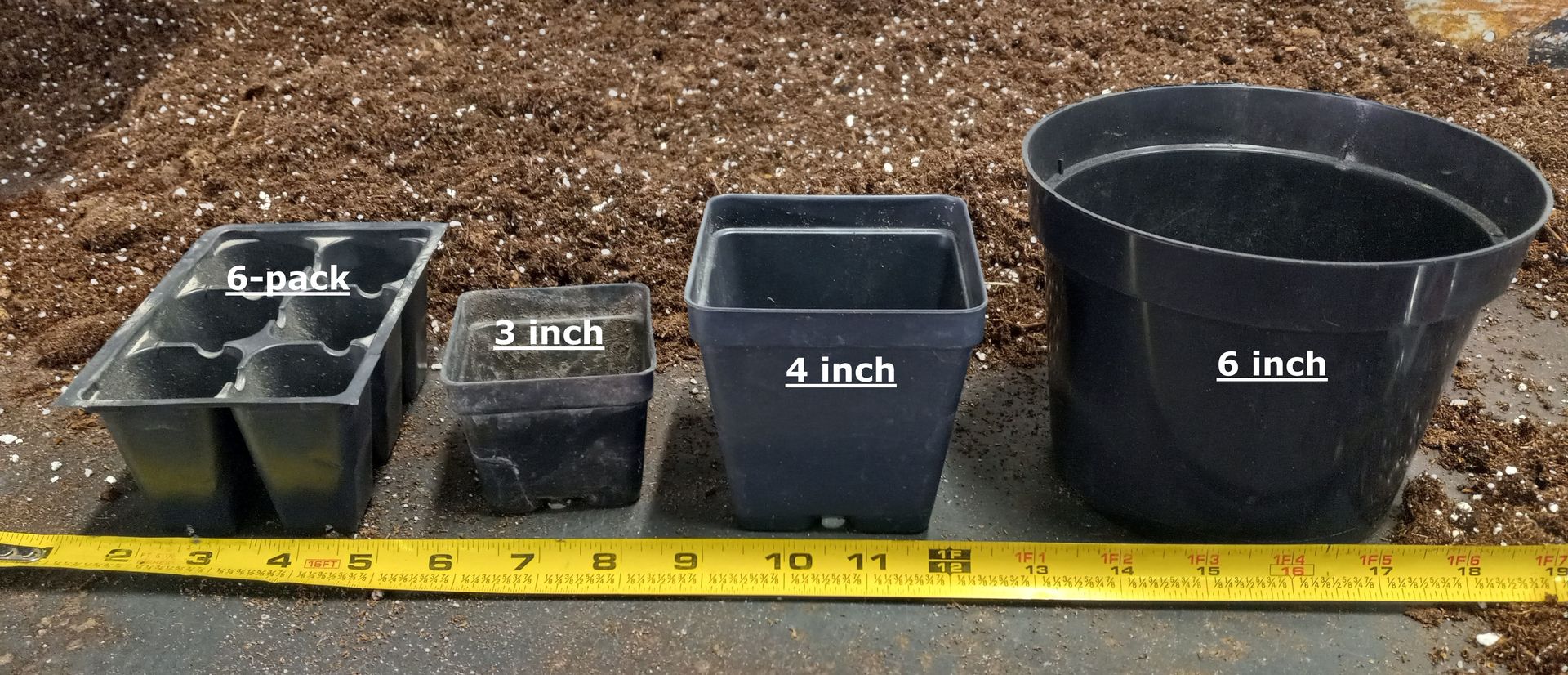
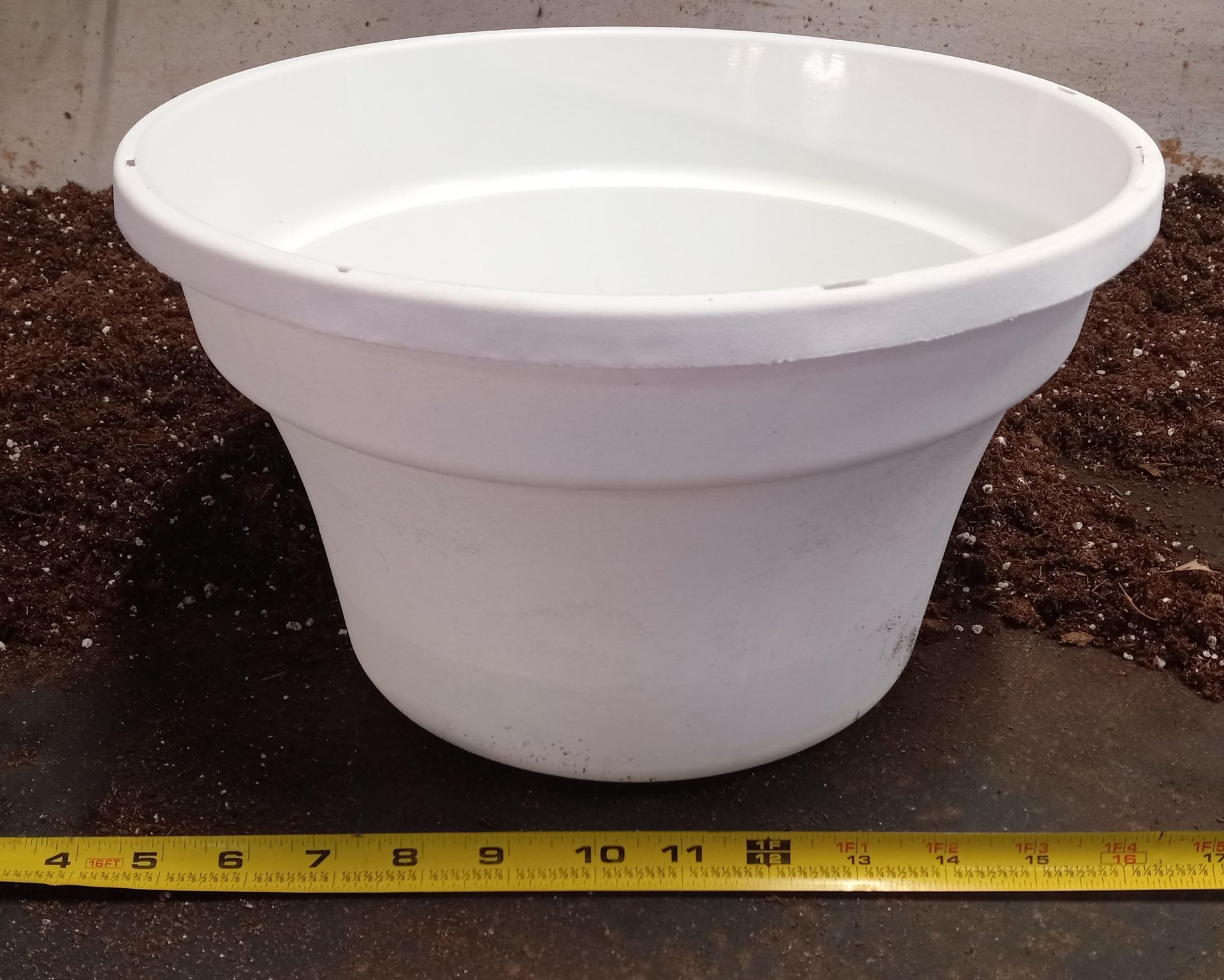
- Life Cycle - Perennial plants will come back year-after-year. Annual plants live only one year. Tender perennials must be taken indoors over the winter in order to survive Iowa winters.
- Flavor - Herbs vary widely and subtly in flavor, making them very difficult to describe. We recommend gently rubbing the leaves of herbs you are interested in to lightly bruise the leaf, which will release the aroma of that herb and give you an idea of its flavor.
- Not just for cooking! - Herbs make some of our favorite garden plants, even if we never harvest them! Many are perennial, low maintenance, and have attractive foliage–which has the added benefit of filling your garden with sweet aromas. Most also bloom and are favorites of pollinators.
- Container Plants - Nearly all herbs take well to container cultivation, as long as they are given enough light. Keep in mind that moisture loving herbs like mint will require larger containers and more attention than drought tolerant herbs such as rosemary.
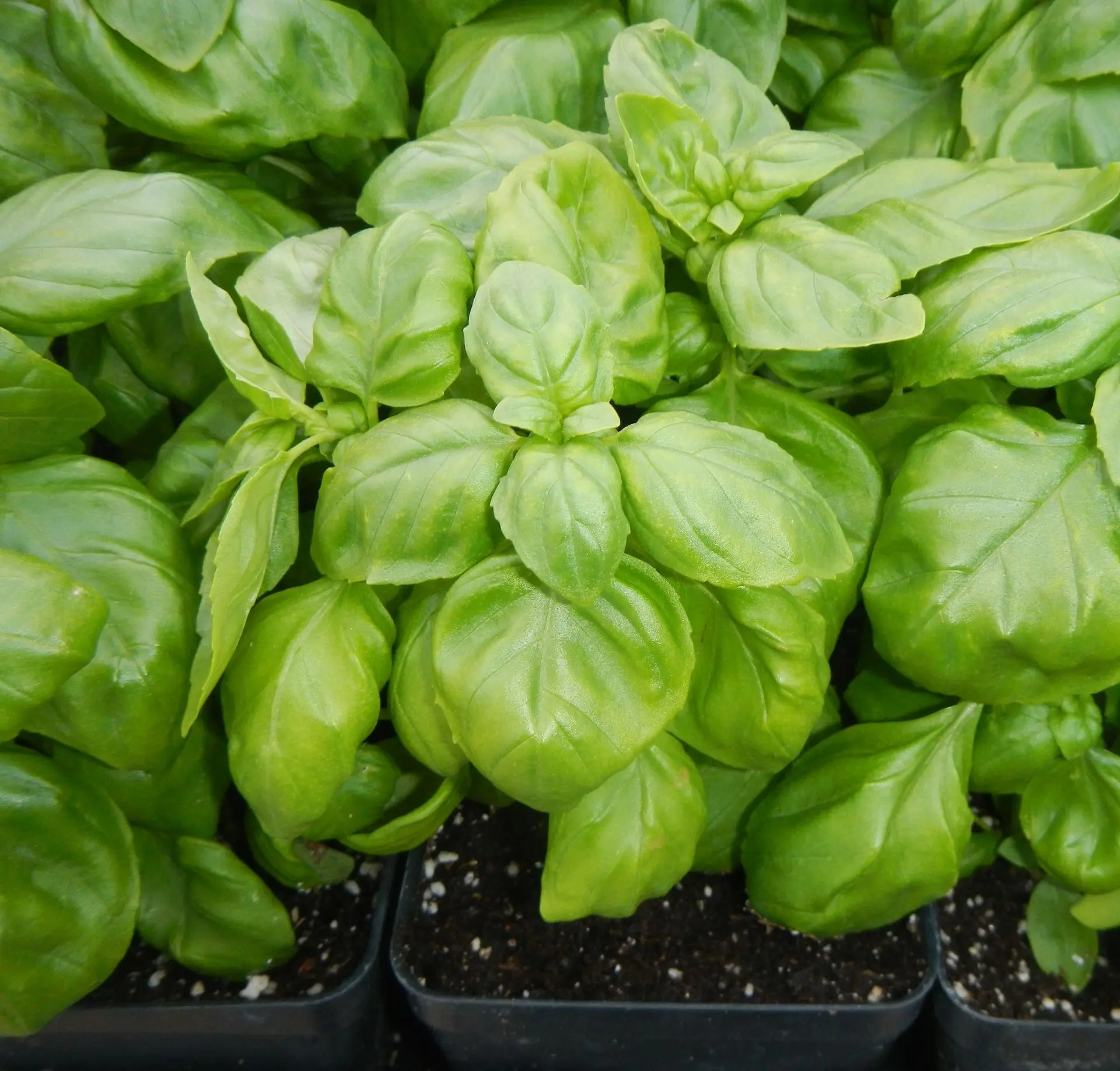
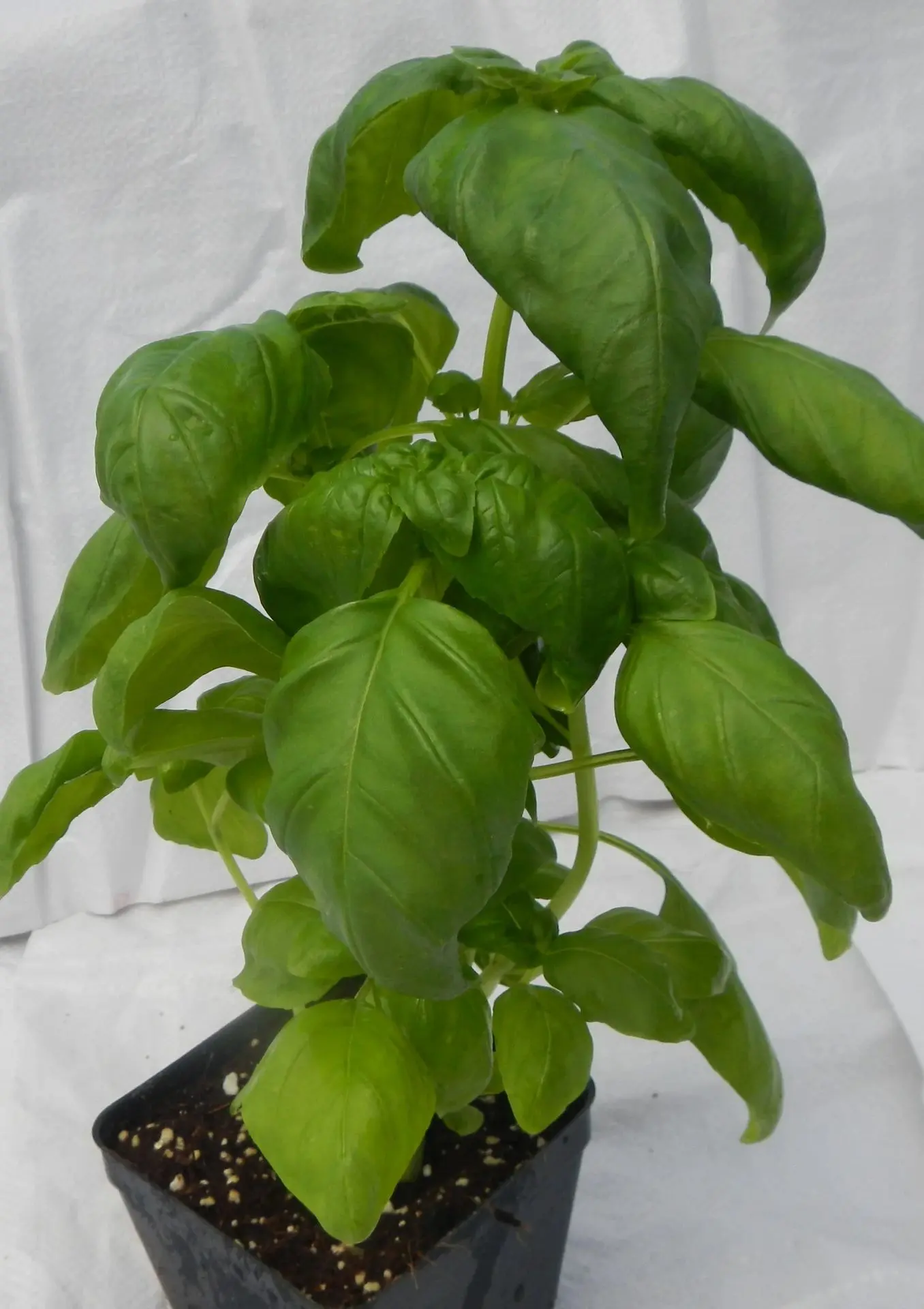
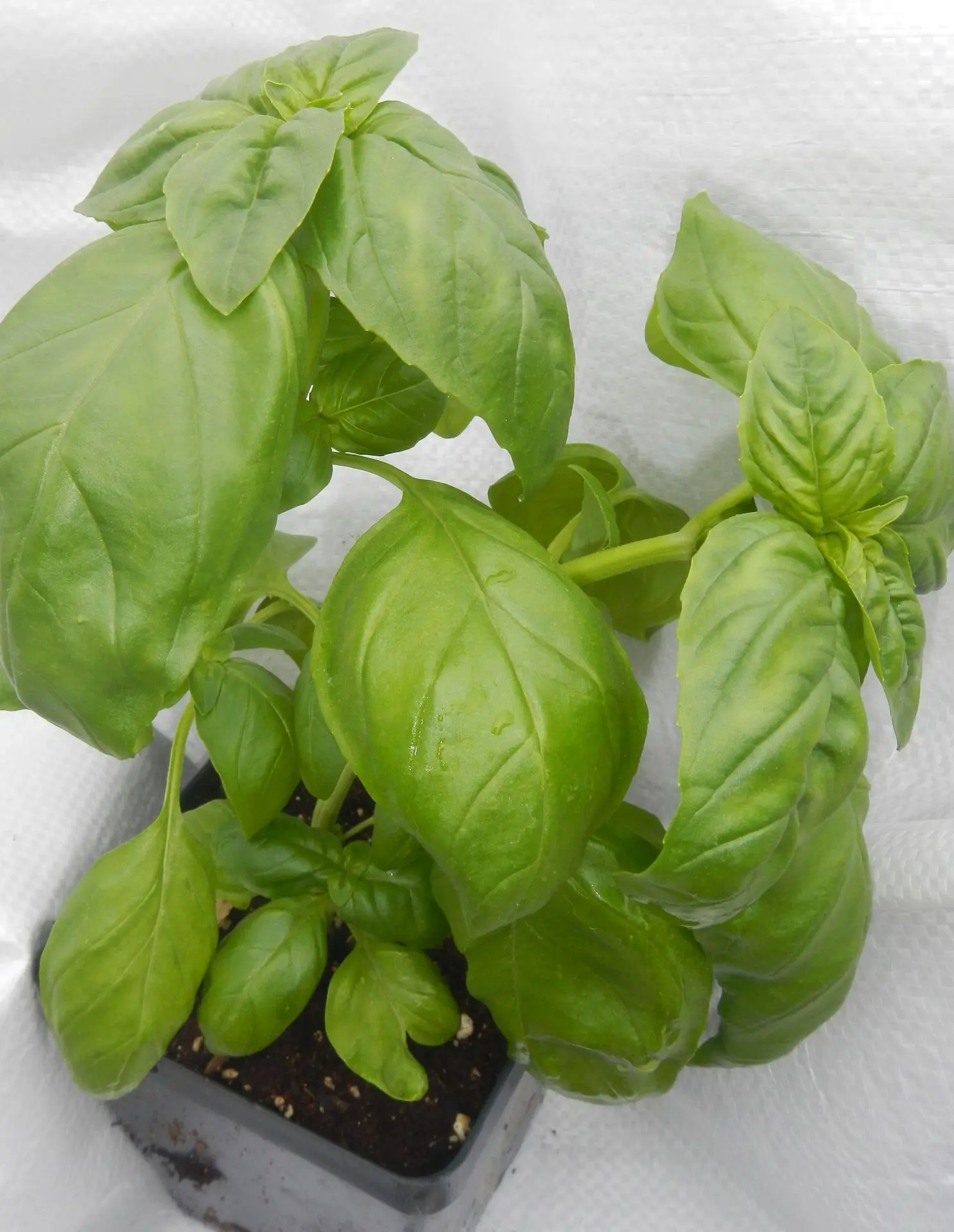
Sweet basil has the classic Genovese Italian basil flavor and aroma that goes perfect with salads, sauces, pasta dishes, and much more. It grows well in containers or in the ground with well-drained soil.
We often offer a variety called Everleaf which is compact with a dense leafing pattern–perfect for pinching a few leaves to use in the kitchen. Everleaf is slow to flower than other varieties (basil's flavor becomes unfavorable when the plant flowers).
Many of the varieties of sweet basil we offer have good downy mildew resistance. Downy mildew is one of the most devastating basil diseases in our area, so if you have had issues growing basil in the past, this may increase your success. Please ask us to ensure that the particular plants being offered at the time are resistant.
Available during May in a 4" pot. Plant outdoors only after danger of frost has passed (May 15). Basil is very tender–take indoors if temperatures drop below 45° F and protect from cold, early-season winds.
Light: Full Sun |
Life Cycle: Annual |
Height: 16-24" |
Leaf Size: 2-3" long |
Sweet basil has the classic Genovese Italian basil flavor and aroma that goes perfect with salads, sauces, pasta dishes, and much more. It grows well in containers or in the ground with well-drained soil.
We often offer a variety called Everleaf which is compact with a dense leafing pattern–perfect for pinching a few leaves to use in the kitchen. Everleaf is slow to flower than other varieties (basil's flavor becomes unfavorable when the plant flowers).
Available during May in a 4" pot. Plant outdoors only after danger of frost has passed (May 15). Basil is very tender–take indoors if temperatures drop below 45° F and protect from cold, early-season winds.
Light: Full Sun |
Life Cycle: Annual |
Height: 16-24" |
Leaf Size: 2-3" long |
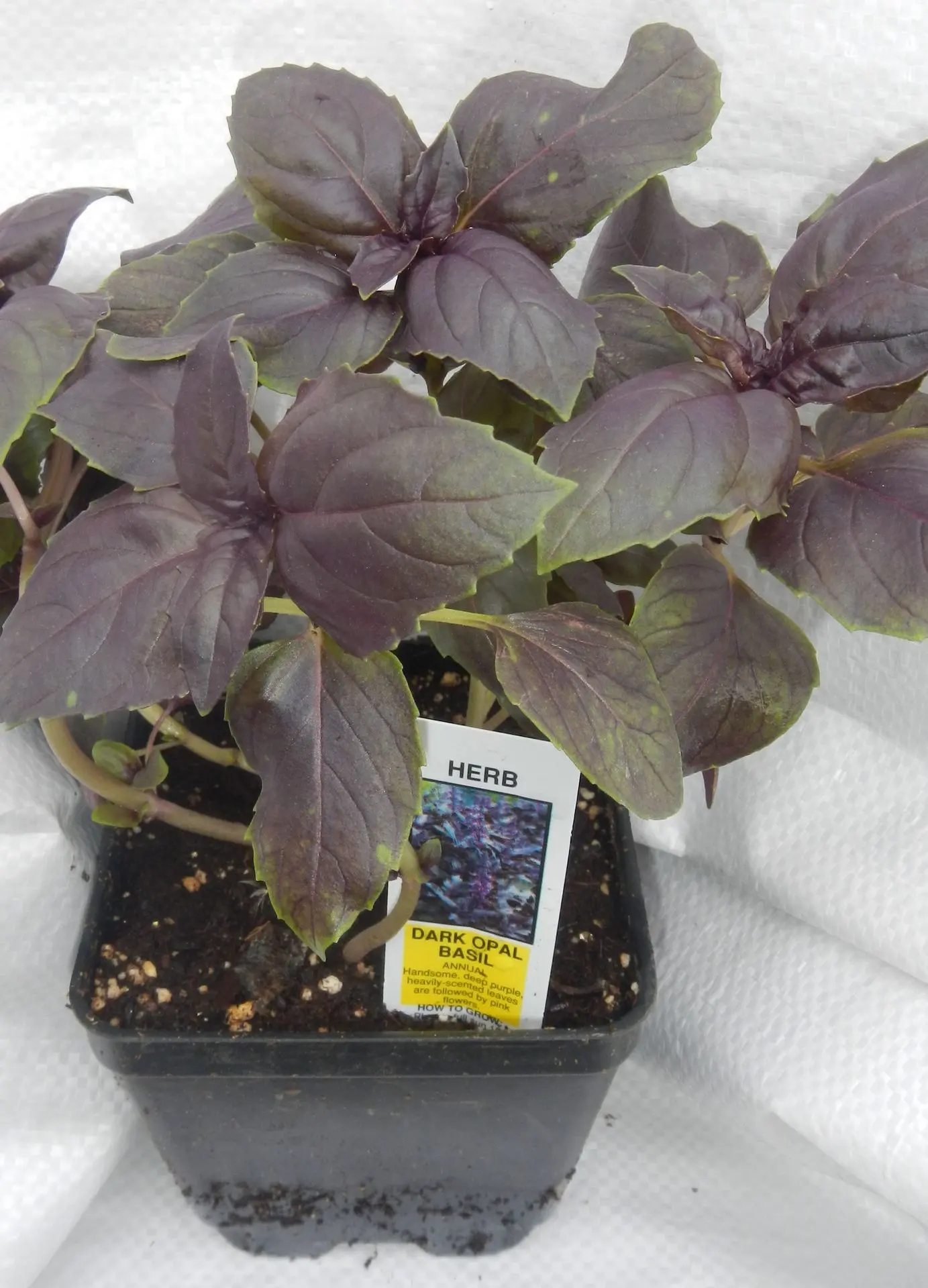
Purple Basil has an intense basil flavor with an interesting pop of color. The leaves are often fringed with green and the plant will develop purple flowers at maturity. It grows well in containers or in the ground with well-drained soil.
Available during May, typically in a 3" pot. Plant outdoors only after danger of frost has passed (May 15). Basil is very tender–take indoors if temperatures drop below 45° F and protect from cold, early-season winds.
Light: Full Sun |
Life Cycle: Annual |
Height: 16-18" |
Leaf Size: 1.5-3" long |
Purple Basil has an intense basil flavor with an interesting pop of color. The leaves are often fringed with green and the plant will develop purple flowers at maturity. It grows well in containers or in the ground with well-drained soil.
Available during May, typically in a 3" pot. Plant outdoors only after danger of frost has passed (May 15). Basil is very tender–take indoors if temperatures drop below 45° F and protect from cold, early-season winds.
Light: Full Sun |
Life Cycle: Annual |
Height: 16-18" |
Leaf Size: 1.5-3" long |
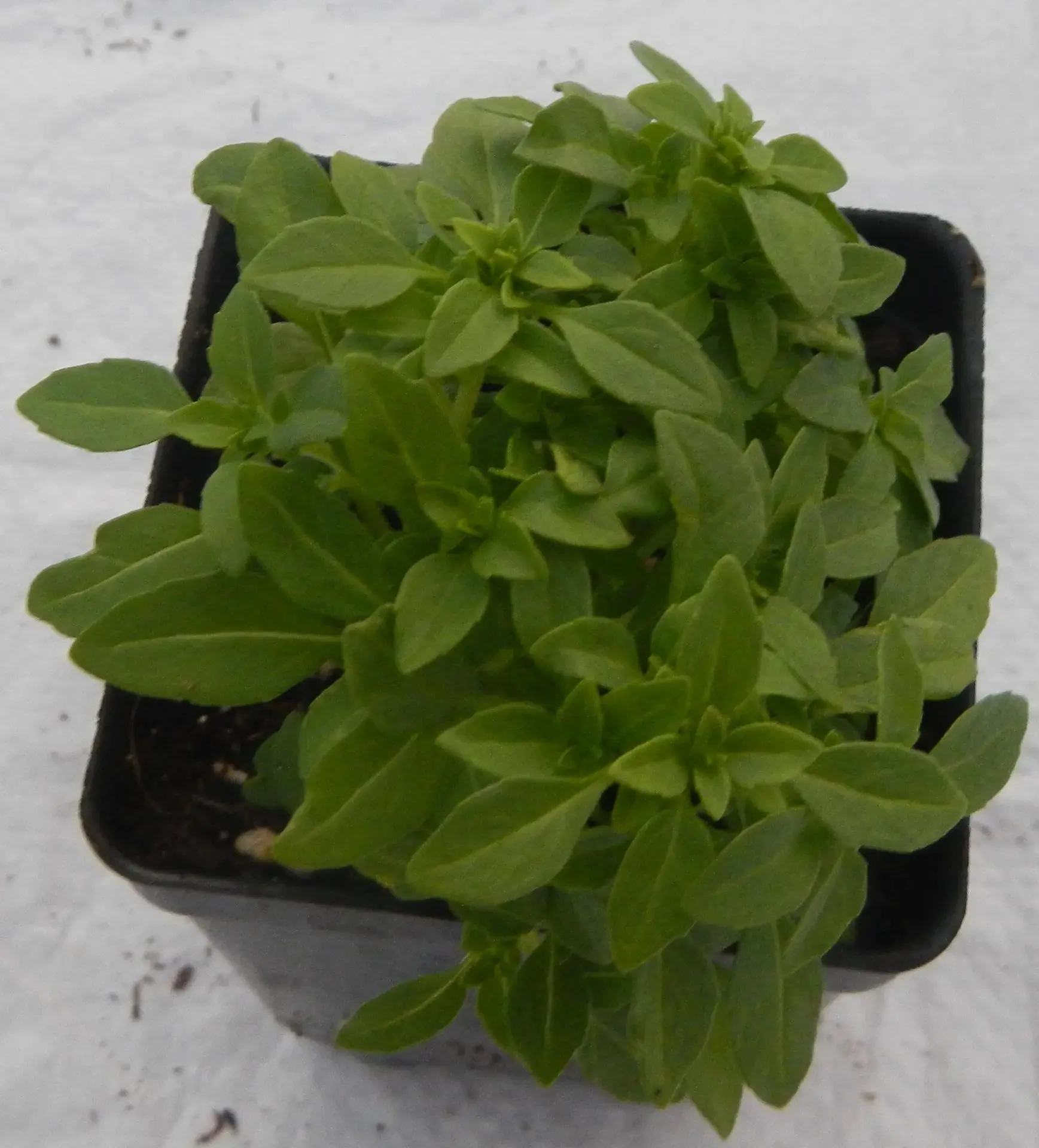
Spicy Globe Basil forms an attractive, small, dome-shaped canopy of dense leaves that makes it perfect for adding a decorative pop of green to any space. The leaves have a spicy-sweet flavor, typical of Greek basils. It grows well in containers or in the ground with well-drained soil.
Available during May, typically in a 3" pot. Plant outdoors only after danger of frost has passed (May 15). Basil is very tender–take indoors if temperatures drop below 45° F and protect from cold, early-season winds.
Light: Full Sun |
Life Cycle: Annual |
Height: 8-14" |
Leaf Size: 1/2-1" |
Spicy Globe Basil forms an attractive, small, dome-shaped canopy of dense leaves that makes it perfect for adding a decorative pop of green to any space. The leaves have a spicy-sweet flavor, typical of Greek basils. It grows well in containers or in the ground with well-drained soil.
Available during May, typically in a 3" pot. Plant outdoors only after danger of frost has passed (May 15). Basil is very tender–take indoors if temperatures drop below 45° F and protect from cold, early-season winds.
Light: Full Sun |
Life Cycle: Annual |
Height: 8-14" |
Leaf Size: 1/2-1" |
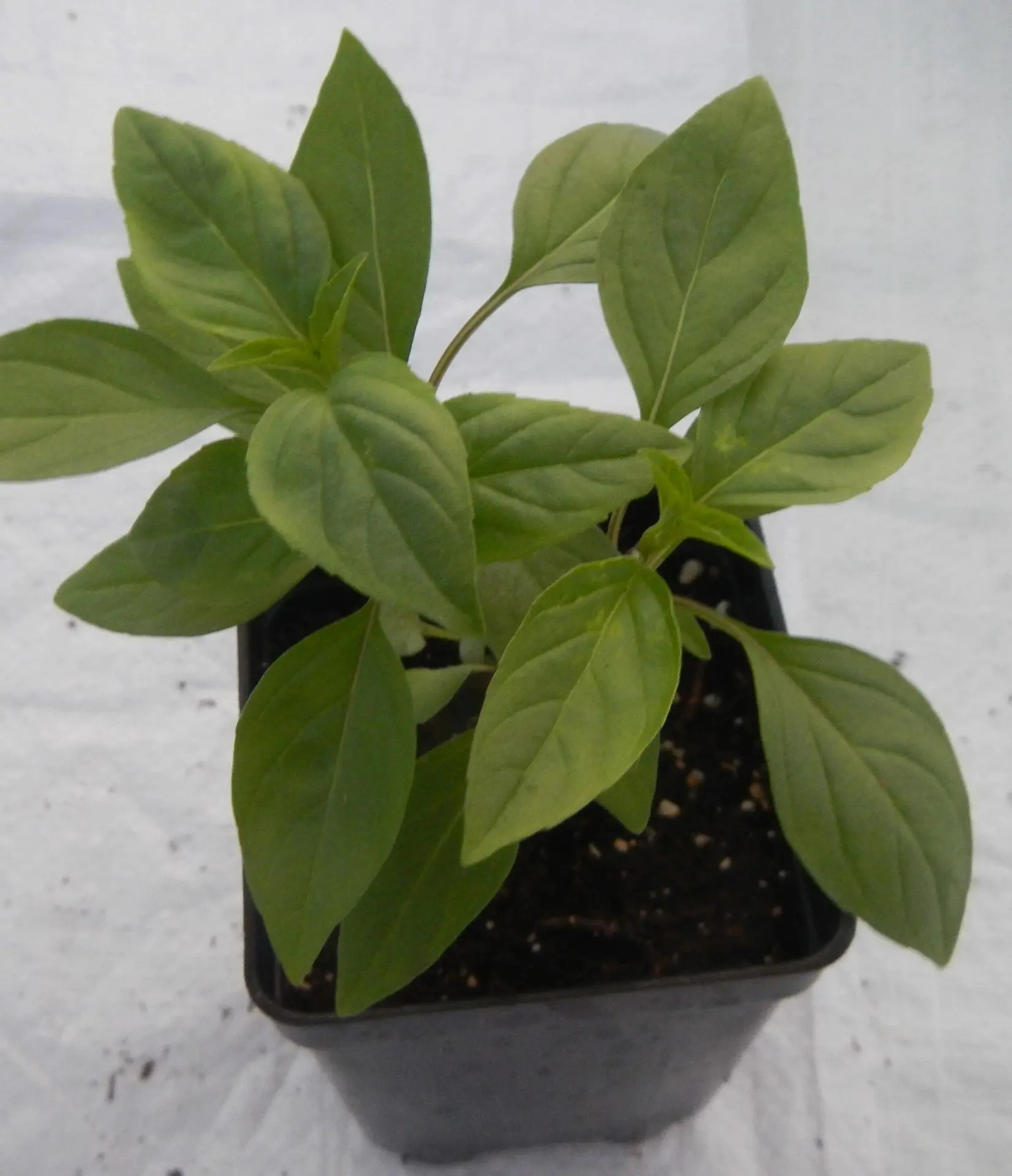
Thai Basil has the typical basil flavor with spicy tones and a hint of anise flavor. As the plant ages, it develops attractive deep purple stems and flowers, which are also edible and have a more intense flavor. It grows well in containers or in the ground with well-drained soil.
Available during May, typically in a 3" pot. Plant outdoors only after danger of frost has passed (May 15). Basil is very tender–take indoors if temperatures drop below 45° F and protect from cold, early-season winds.
Light: Full Sun |
Life Cycle: Annual |
Height: 16-20" |
Leaf Size: 2" |
Thai Basil has the typical basil flavor with spicy tones and a hint of anise flavor. As the plant ages, it develops attractive deep purple stems and flowers, which are also edible and have a more intense flavor. It grows well in containers or in the ground with well-drained soil.
Available during May, typically in a 3" pot. Plant outdoors only after danger of frost has passed (May 15). Basil is very tender–take indoors if temperatures drop below 45° F and protect from cold, early-season winds.
Light: Full Sun |
Life Cycle: Annual |
Height: 16-20" |
Leaf Size: 2" |
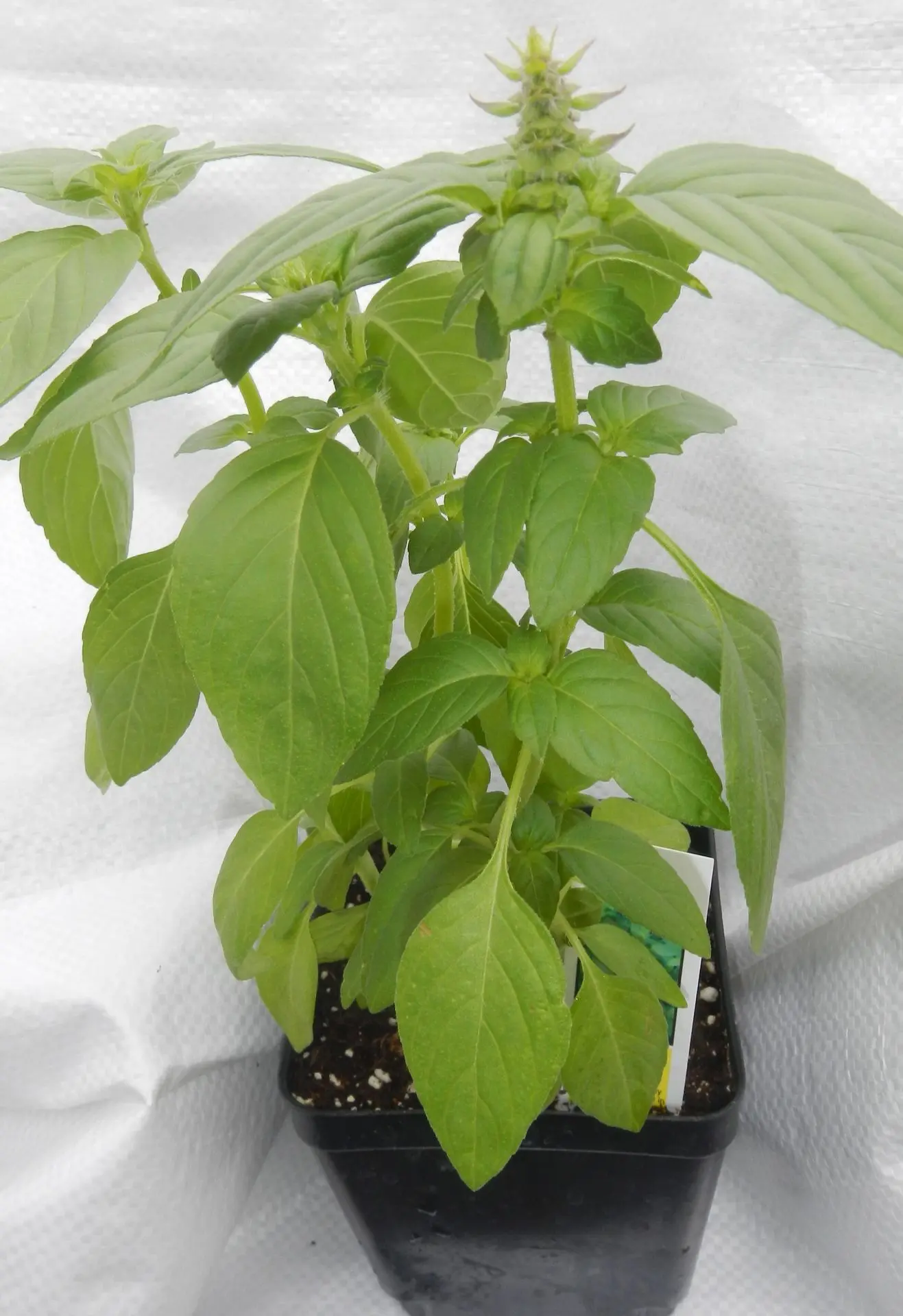
Lemon Basil is sweet with tangy citrus tones. Often used in curry, soups, or steamed and grilled dishes, it also makes an attractive decorative plant. At maturity, it develops bright white, edible flowers. It grows well in containers or in the ground with well-drained soil.
Available during May, typically in a 3" pot. Plant outdoors only after danger of frost has passed (May 15). Basil is very tender–take indoors if temperatures drop below 45° F and protect from cold, early-season winds.
Light: Full Sun |
Life Cycle: Annual |
Height: 20-24" |
Leaf Size: 2" |
Lemon Basil is sweet with tangy citrus tones. Often used in curry, soups, or steamed and grilled dishes, it also makes an attractive decorative plant. At maturity, it develops bright white, edible flowers. It grows well in containers or in the ground with well-drained soil.
Available during May, typically in a 3" pot. Plant outdoors only after danger of frost has passed (May 15). Basil is very tender–take indoors if temperatures drop below 45° F and protect from cold, early-season winds.
Light: Full Sun |
Life Cycle: Annual |
Height: 20-24" |
Leaf Size: 2" |
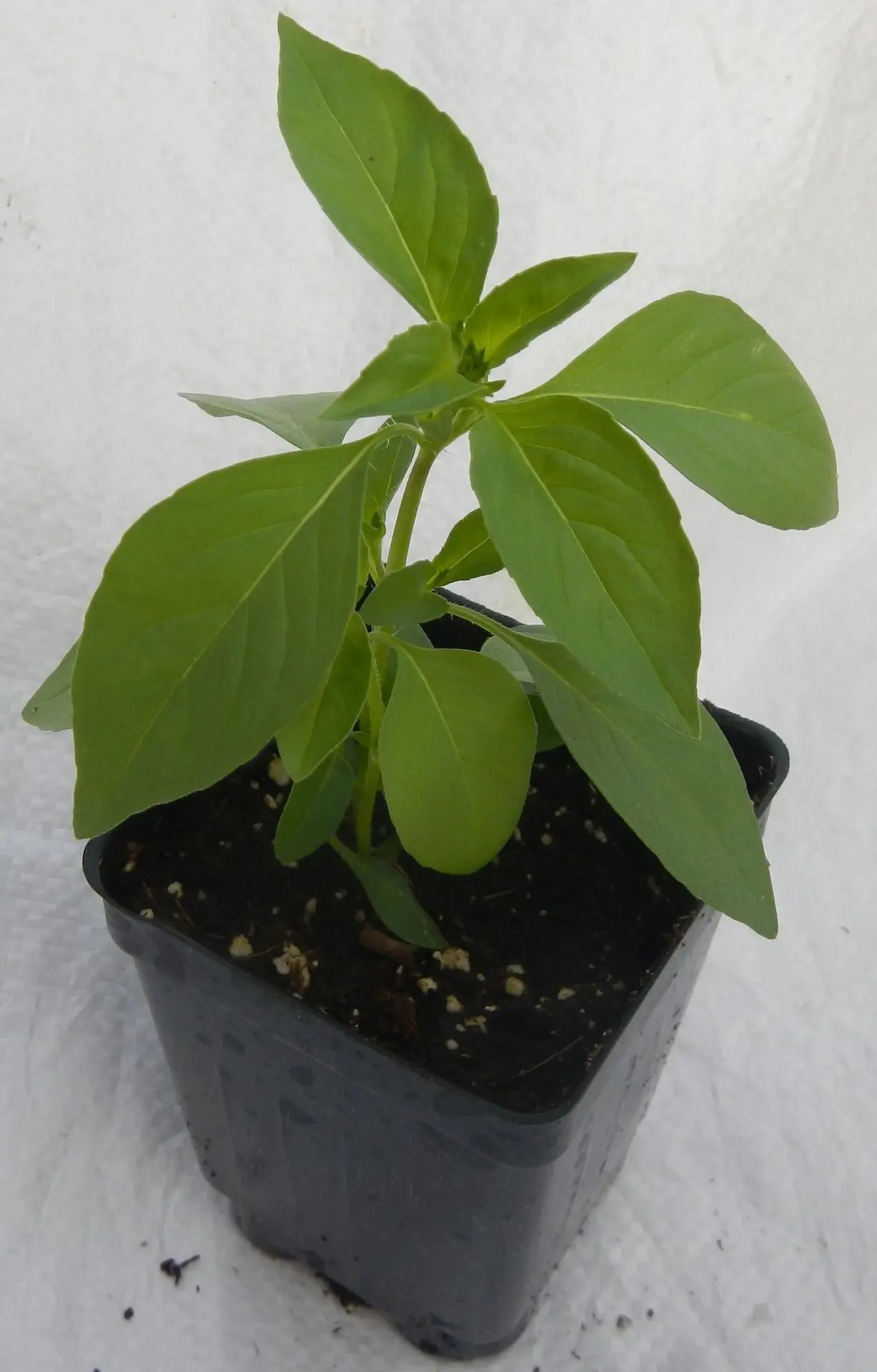
Lime Basil has a unique, zesty citrus flavor. It grows well in containers or in the ground with well-drained soil.
Available during May, typically in a 3" pot. Plant outdoors only after danger of frost has passed (May 15). Basil is very tender–take indoors if temperatures drop below 45° F and protect from cold, early-season winds.
Light: Full Sun |
Life Cycle: Annual |
Height: 16-20" |
Leaf Size: 2" |
Lime Basil has a unique, zesty citrus flavor. It grows well in containers or in the ground with well-drained soil.
Available during May, typically in a 3" pot. Plant outdoors only after danger of frost has passed (May 15). Basil is very tender–take indoors if temperatures drop below 45° F and protect from cold, early-season winds.
Light: Full Sun |
Life Cycle: Annual |
Height: 16-20" |
Leaf Size: 2" |
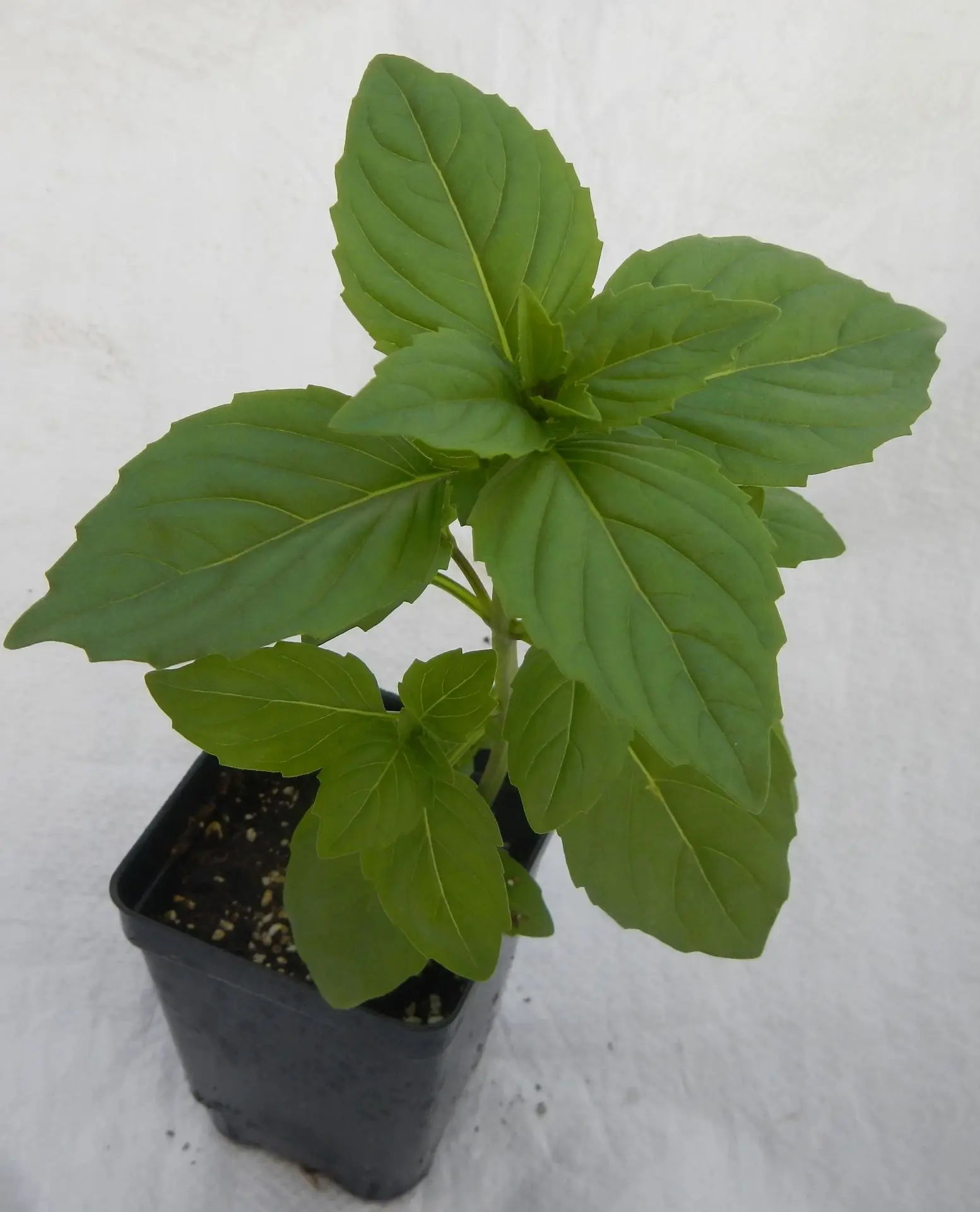
Cinnamon Basil combines the sweet flavor of basil with warm tones of cinnamon and mint. As the plant matures it will develop deep violet stems and flowers. It grows well in containers or in the ground with well-drained soil.
Available during May, typically in a 3" pot. Plant outdoors only after danger of frost has passed (May 15). Basil is very tender–take indoors if temperatures drop below 45° F and protect from cold, early-season winds.
Light: Full Sun |
Life Cycle: Annual |
Height: 26-30" |
Leaf Size: 2" |
Cinnamon Basil combines the sweet flavor of basil with warm tones of cinnamon and mint. As the plant matures it will develop deep violet stems and flowers. It grows well in containers or in the ground with well-drained soil.
Available during May, typically in a 3" pot. Plant outdoors only after danger of frost has passed (May 15). Basil is very tender–take indoors if temperatures drop below 45° F and protect from cold, early-season winds.
Light: Full Sun |
Life Cycle: Annual |
Height: 26-30" |
Leaf Size: 2" |
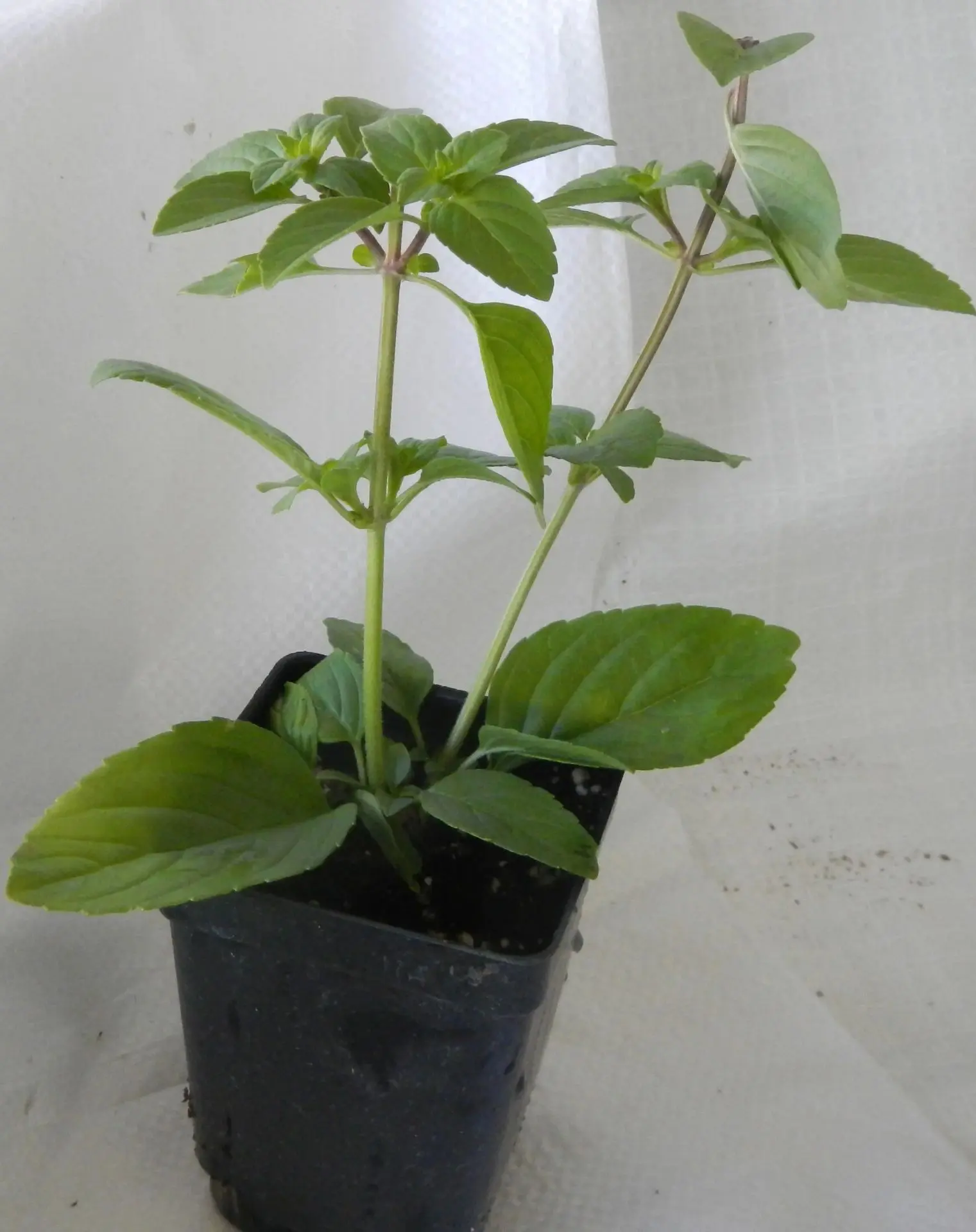
African Blue Basil has a strong, rich basil flavor. The plants grow to a large bush and bloom profusely; the blossoms are well-loved by bees, butterflies, and other insects. African Blue Basil does better indoors than most other basils, but still appreciates time outside. We have had good success growing it outdoors in pots and bringing it indoors to overwinter. It grows well in containers or in the ground with well-drained soil.
Available during May, typically in a 3" pot. Plant outdoors only after danger of frost has passed (May 15). Basil is very tender–take indoors if temperatures drop below 45° F and protect from cold, early-season winds.
Light: Full Sun |
Life Cycle: Tender Perennial (treat as an annual) |
Height: 24-36" |
Leaf Size: 1-2" |
African Blue Basil has a strong, rich basil flavor. The plants grow to a large bush and bloom profusely; the blossoms are well-loved by bees, butterflies, and other insects. African Blue Basil does better indoors than most other basils, but still appreciates time outside. We have had good success growing it outdoors in pots and bringing it indoors to overwinter. It grows well in containers or in the ground with well-drained soil.
Available during May, typically in a 3" pot. Plant outdoors only after danger of frost has passed (May 15). Basil is very tender–take indoors if temperatures drop below 45° F and protect from cold, early-season winds.
Light: Full Sun |
Life Cycle: Tender Perennial (treat as an annual) |
Height: 24-36" |
Leaf Size: 1-2" |
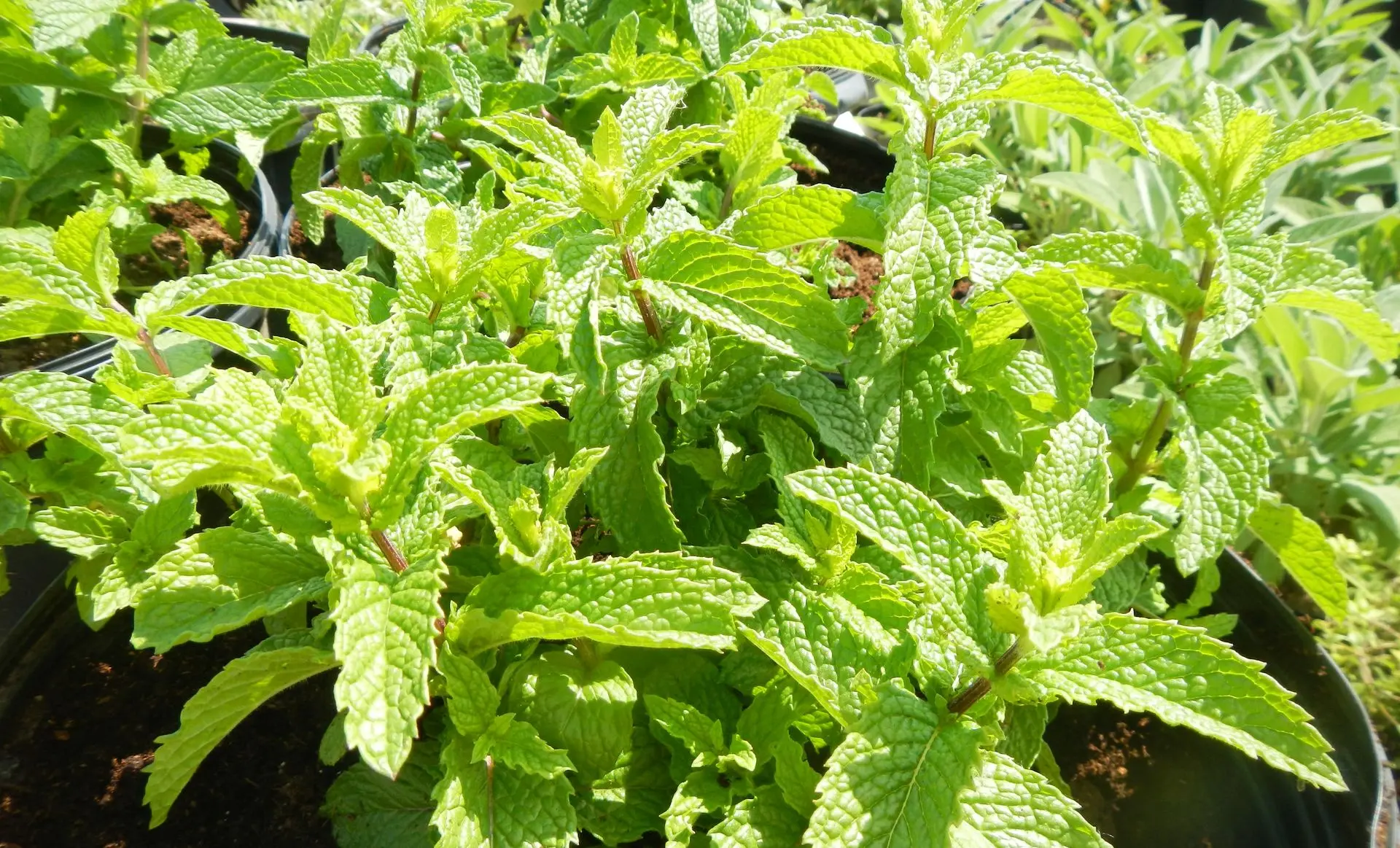
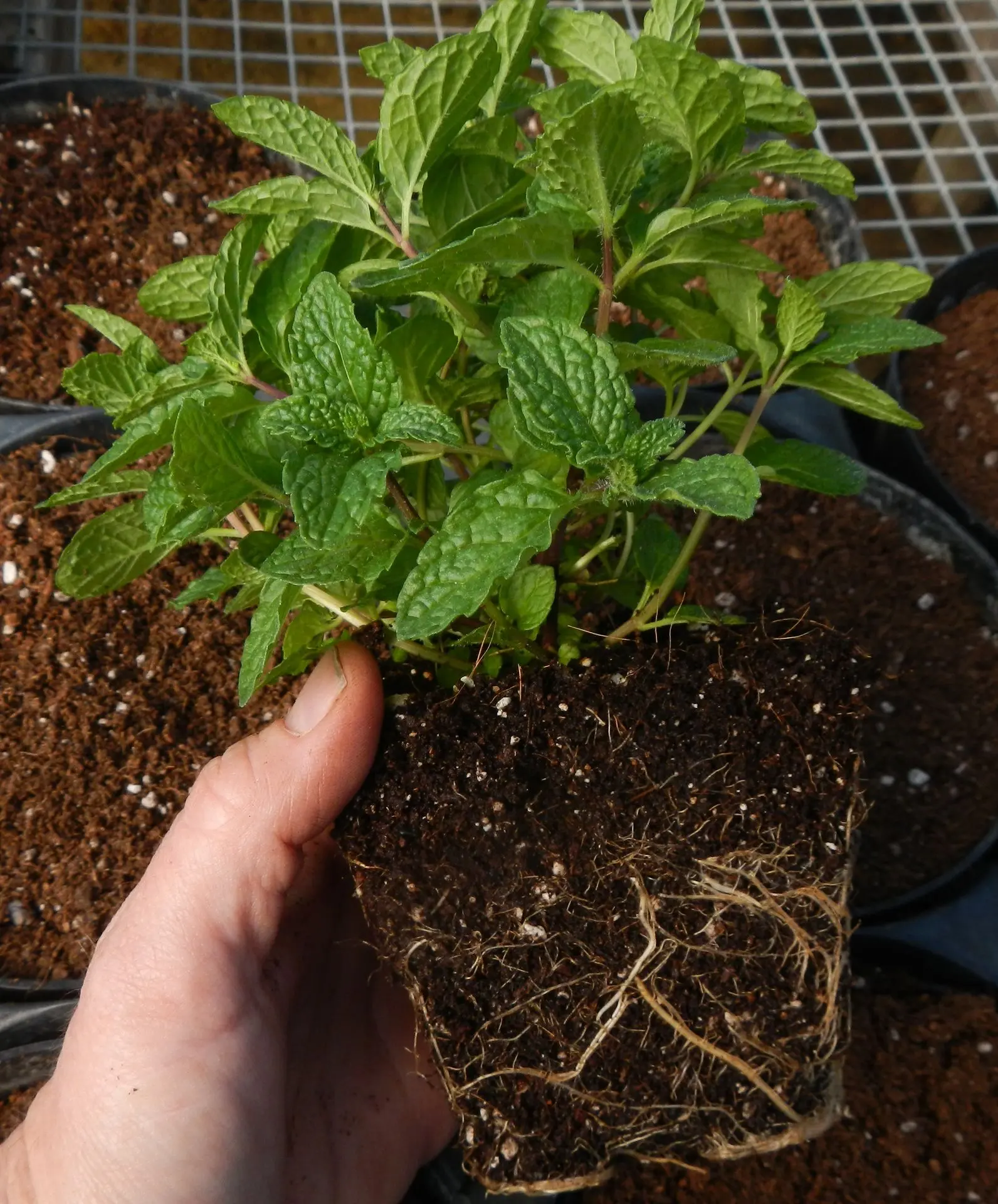
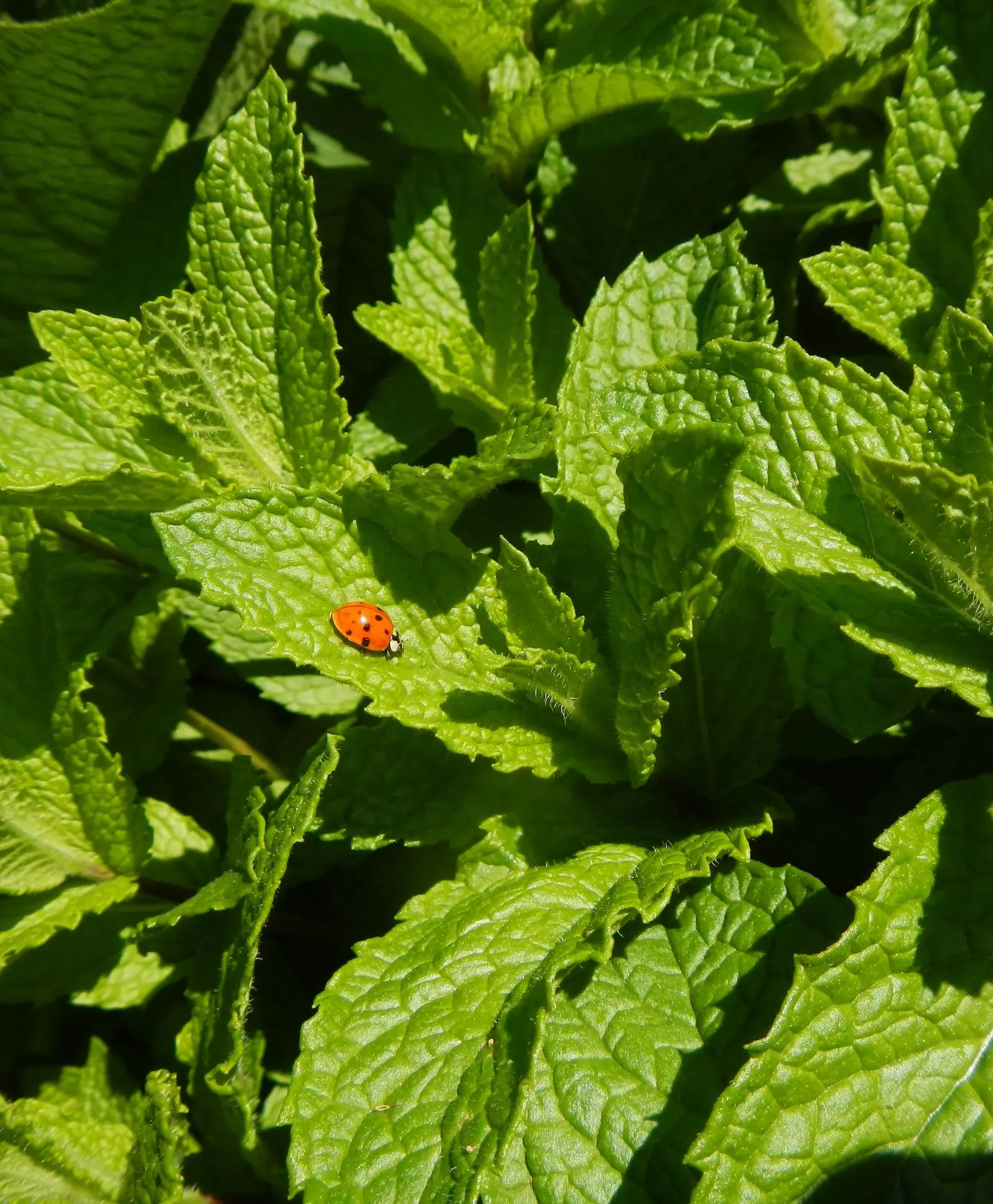
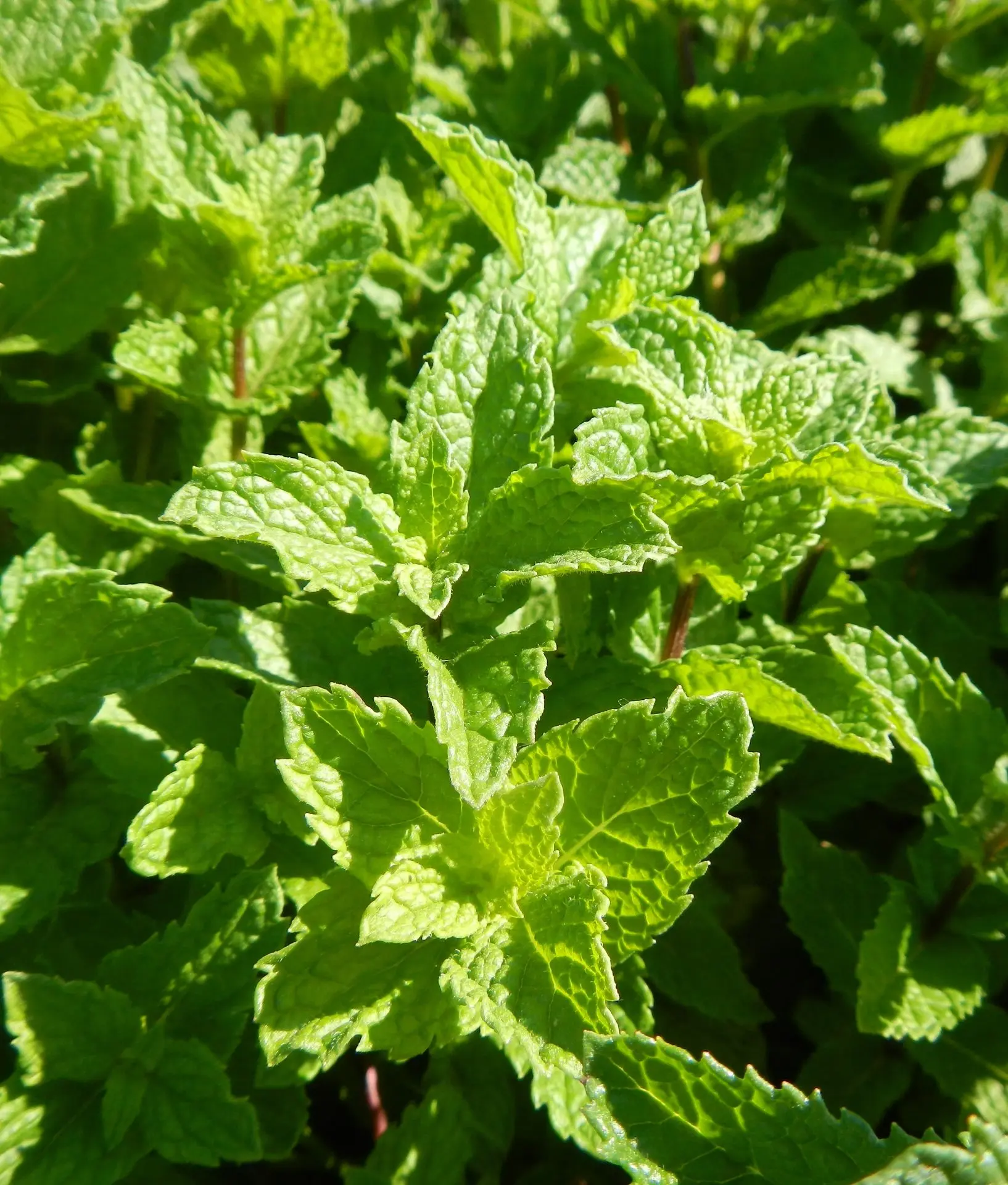
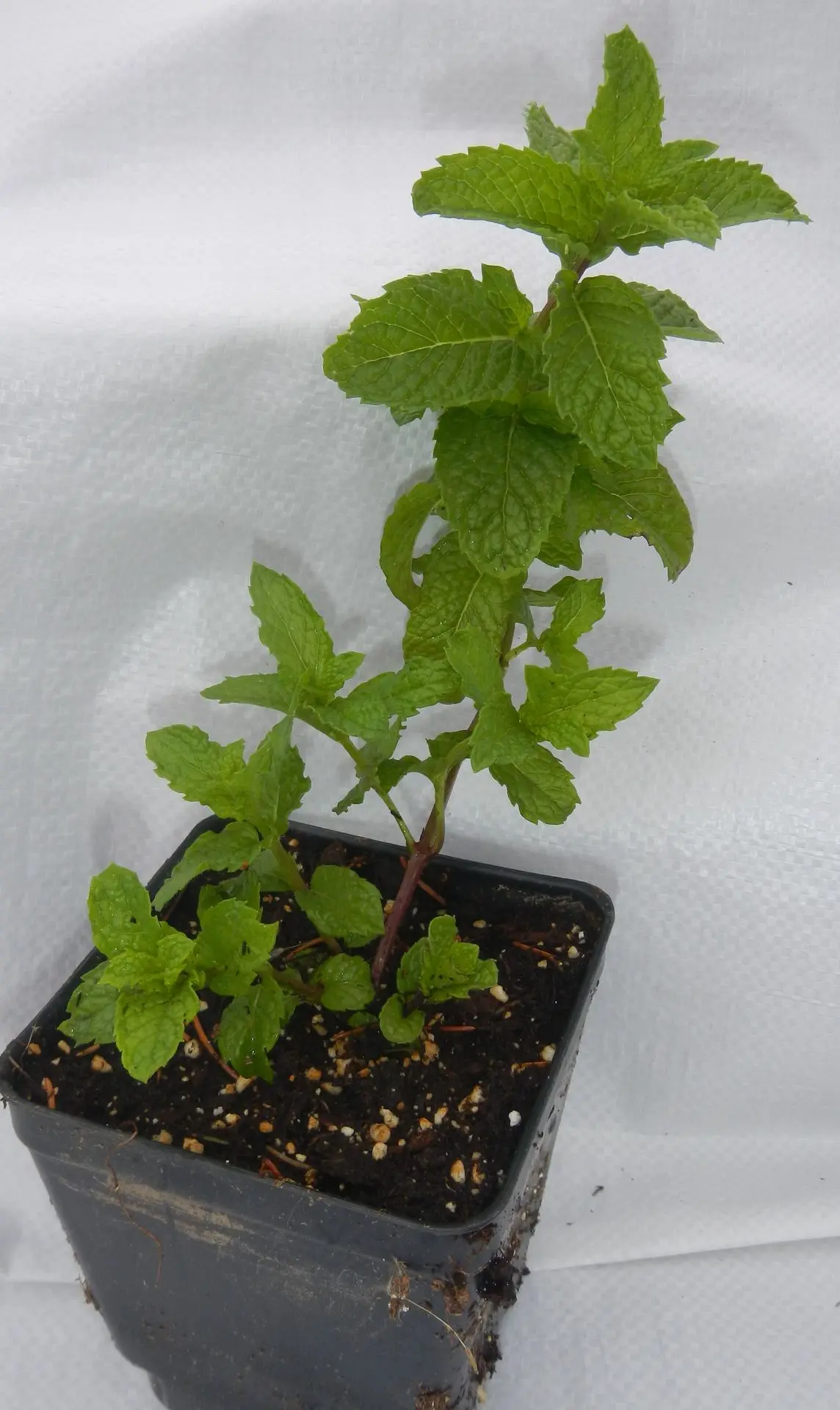
Spearmint has a strong mint flavor. It is extremely vigorous and will spread quickly by rhizome. Similar in flavor to Mojito mint, Spearmint can be used as a substitute when making Mojitos.
Available during May in a 4" pot.
Light: Full Sun to Part Shade |
Life Cycle: Perennial |
Height: 10-15" |
Spearmint has a strong mint flavor. It is extremely vigorous and will spread quickly by rhizome. Similar in flavor to Mojito mint, Spearmint can be used as a substitute when making Mojitos.
Available during May in a 4" pot.
Light: Full Sun to Part Shade |
Life Cycle: Perennial |
Height: 10-15" |
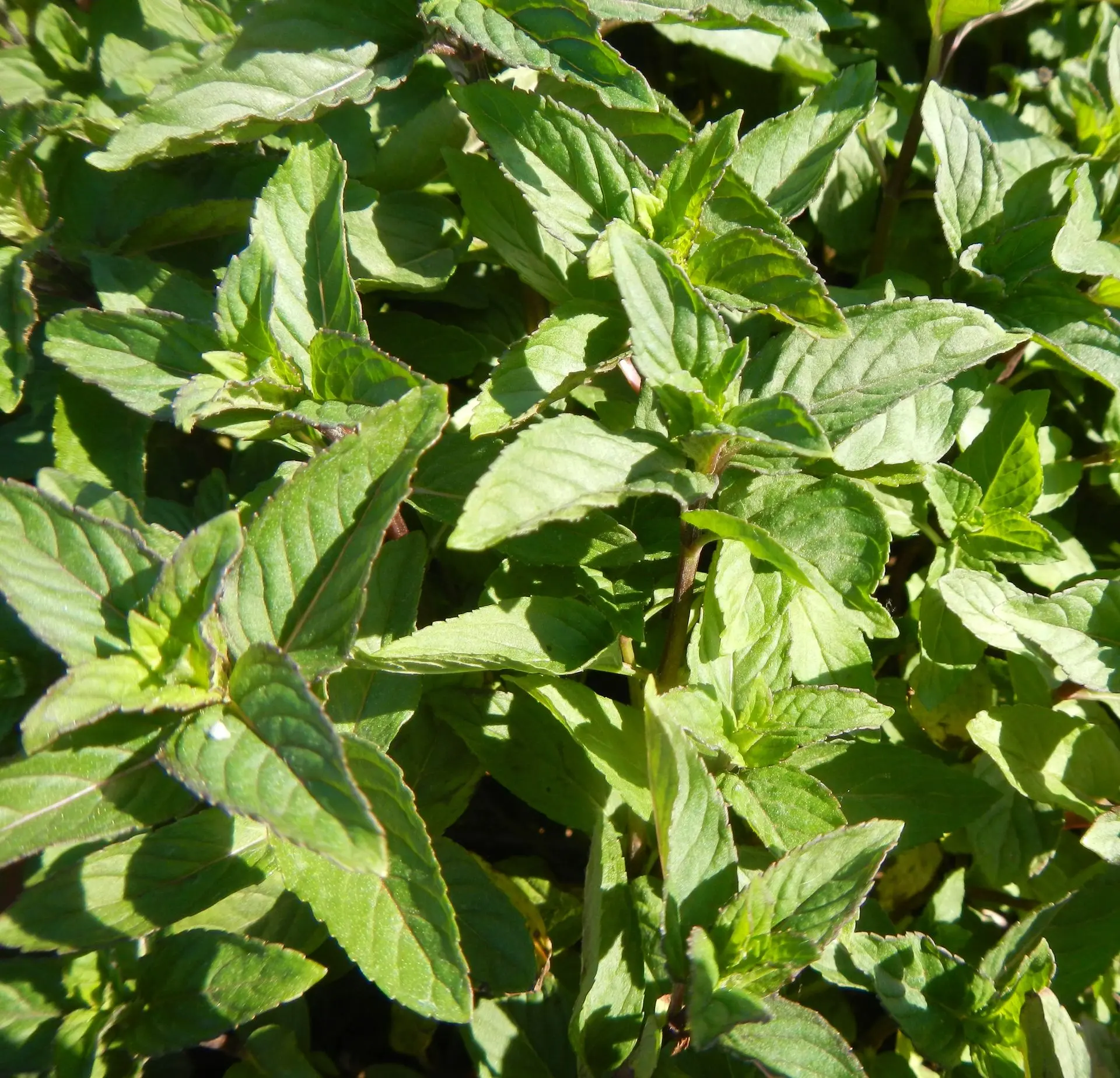
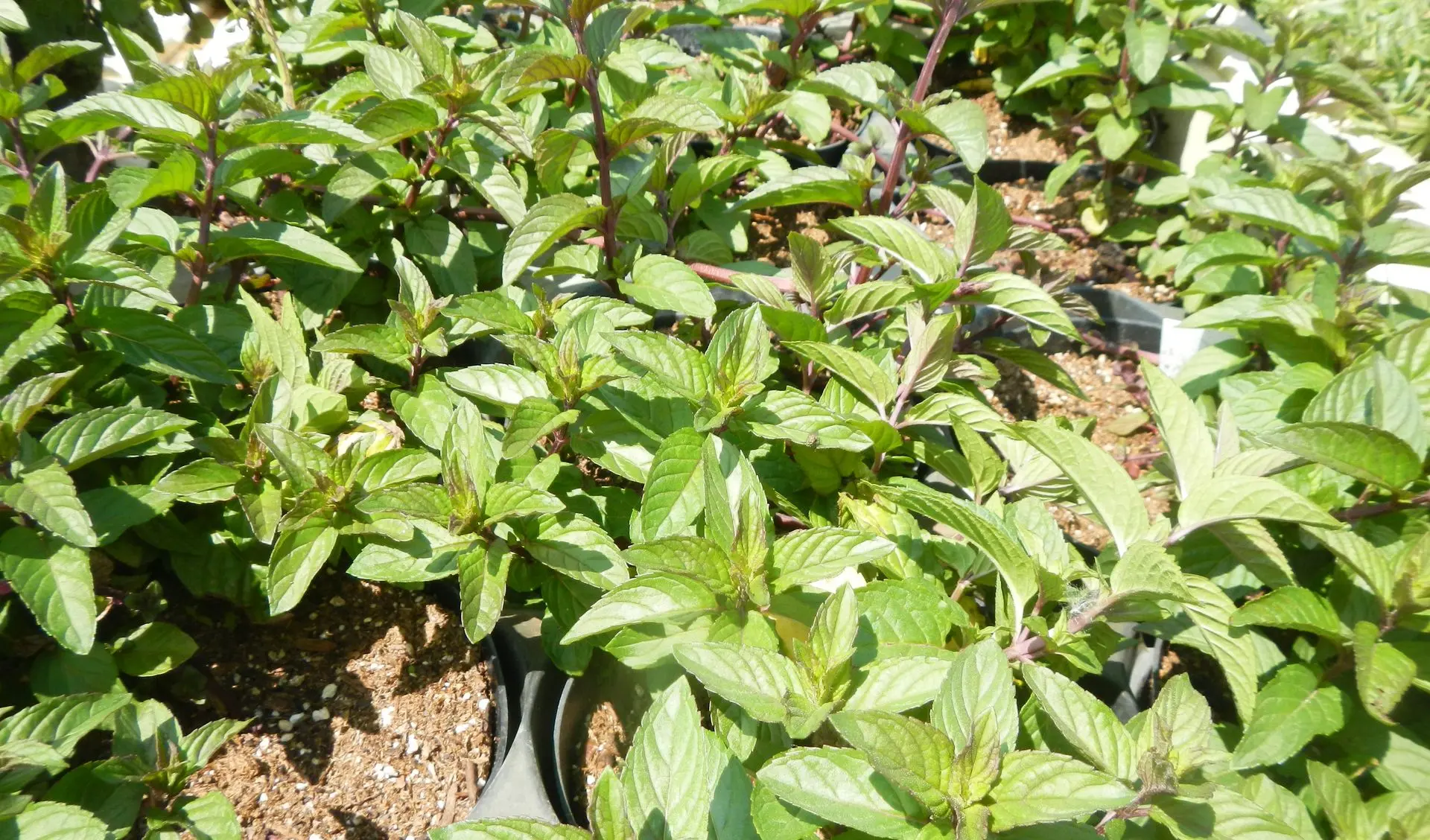
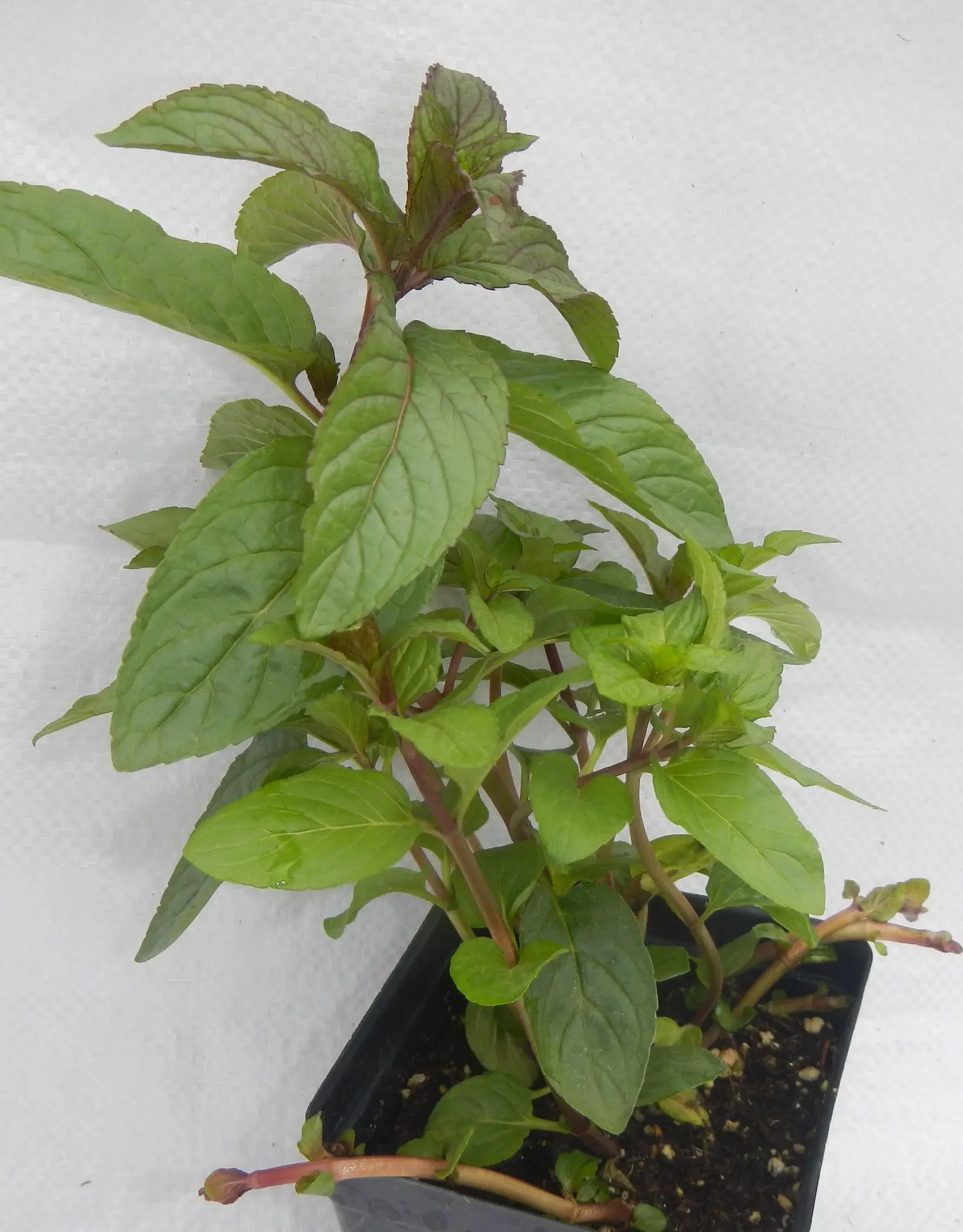
Peppermint has the pleasant, classic flavor found in candy canes and chewing gum. It is extremely vigorous and will spread quickly by rhizome. The plants develop purple stems in full sun, and will bloom violet in summer.
Available during May in a 4" pot.
Light: Full Sun to Part Shade |
Life Cycle: Perennial |
Height: 10-15" |
Peppermint has the pleasant, classic flavor found in candy canes and chewing gum. It is extremely vigorous and will spread quickly by rhizome. The plants develop purple stems in full sun, and will bloom violet in summer.
Available during May in a 4" pot.
Light: Full Sun to Part Shade |
Life Cycle: Perennial |
Height: 10-15" |
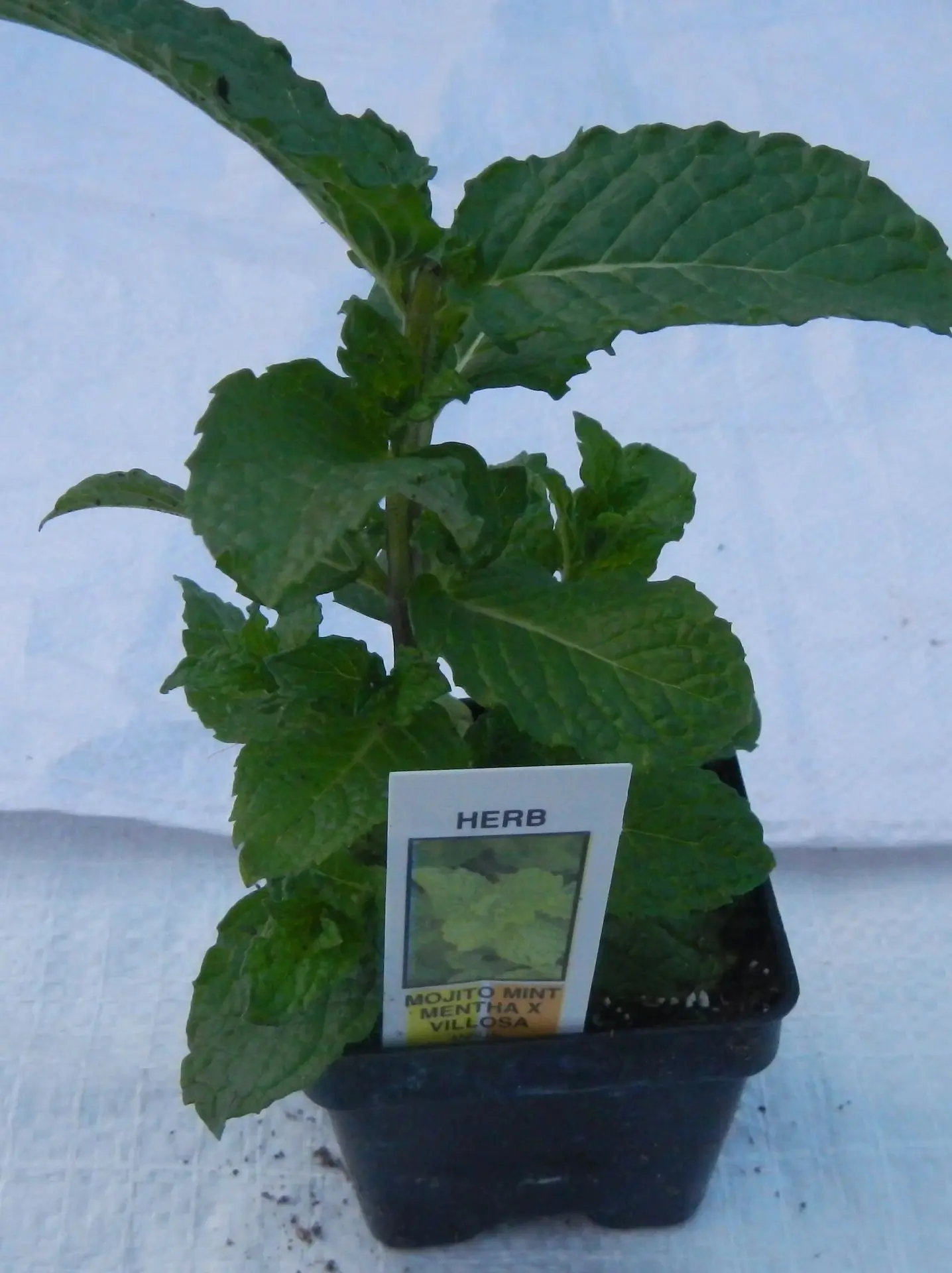
Mojito mint is very similar to Spearmint, but typically has larger leaves, a milder flavor with citrus tones, and is somewhat less vigorous. It is popular for flavoring Mojitos, its namesake beverage.
Available during May in a 4" pot.
Light: Full Sun to Part Shade |
Life Cycle: Perennial |
Height: 10-15" |
Mojito mint is very similar to Spearmint, but typically has larger leaves, a milder flavor with citrus tones, and is somewhat less vigorous. It is popular for flavoring Mojitos, its namesake beverage.
Available during May in a 4" pot.
Light: Full Sun to Part Shade |
Life Cycle: Perennial |
Height: 10-15" |
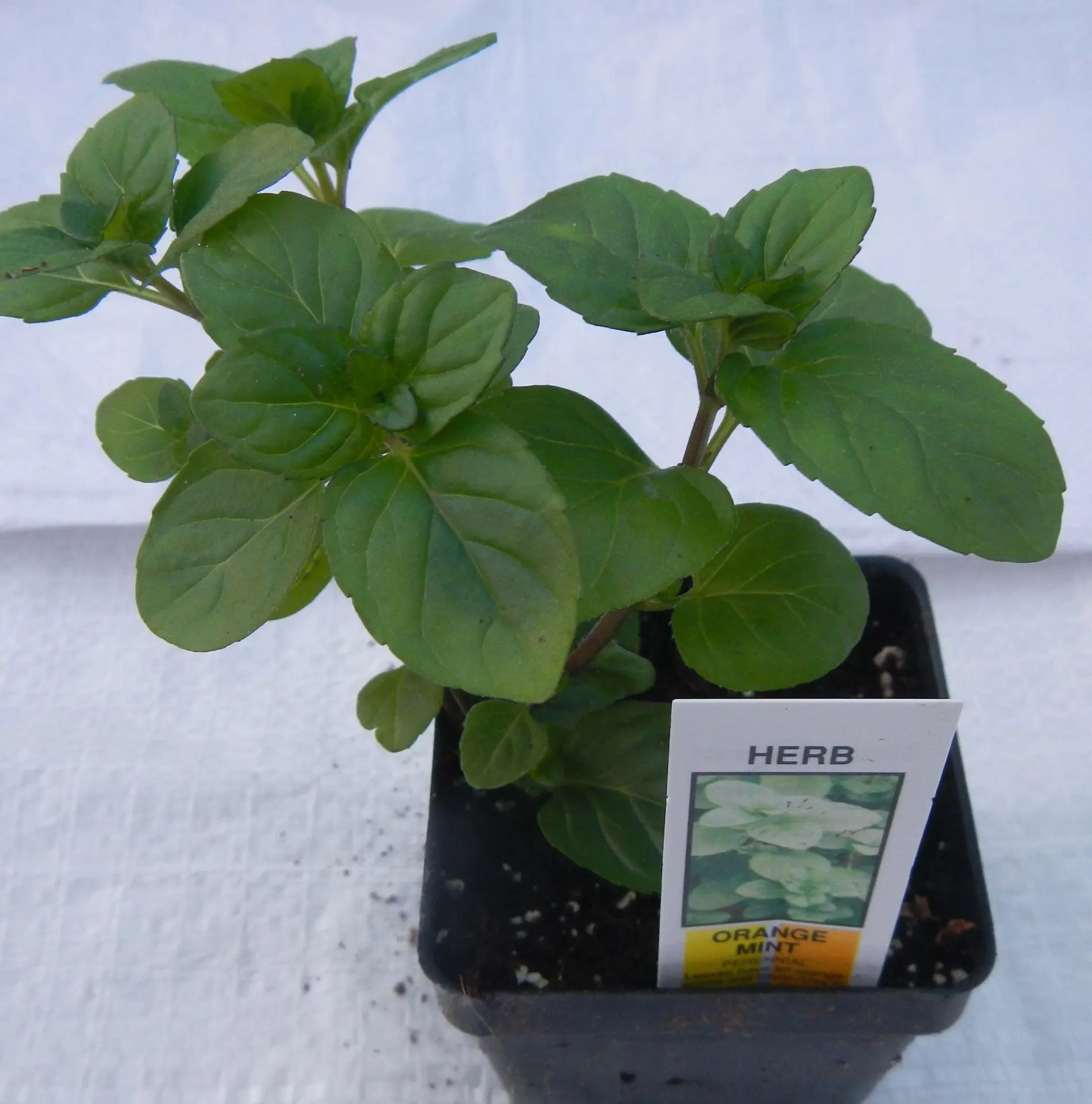
Orange mint has a unique citrus flavor. It is extremely vigorous and will spread quickly by rhizome. The rounded, lush, light-green leaves can be tinged with orange in full sun, making it an attractive garden plant.
Available during May in a 4" pot.
Light: Full Sun to Part Shade |
Life Cycle: Perennial |
Height: 10-20" |
Orange mint has a unique citrus flavor. It is extremely vigorous and will spread quickly by rhizome. The rounded, lush, light-green leaves can be tinged with orange in full sun, making it an attractive garden plant.
Available during May in a 4" pot.
Light: Full Sun to Part Shade |
Life Cycle: Perennial |
Height: 10-20" |
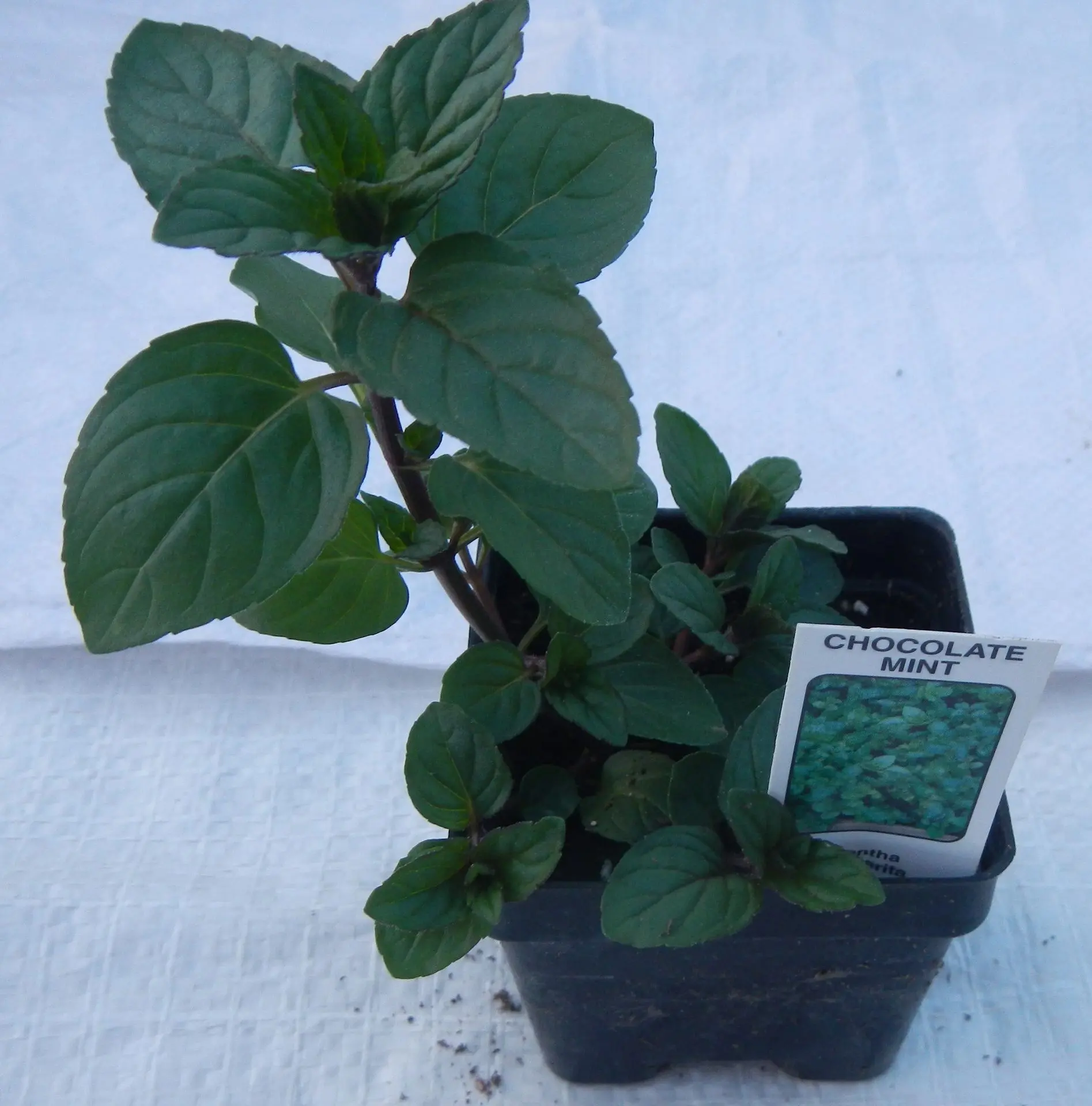
Chocolate mint has a classic mint flavor with hints of coco and vanilla. The foliage has unique brown and purple tones, similar to but deeper than peppermint. Chocolate mint is less vigorous than other mints making it easier to manage, but will still spread if conditions are favorable.
Available during May in a 4" pot.
Light: Full Sun to Part Shade |
Life Cycle: Perennial |
Height: 10-15" |
Chocolate mint has a classic mint flavor with hints of coco and vanilla. The foliage has unique brown and purple tones, similar to but deeper than peppermint. Chocolate mint is less vigorous than other mints making it easier to manage, but will still spread if conditions are favorable.
Available during May in a 4" pot.
Light: Full Sun to Part Shade |
Life Cycle: Perennial |
Height: 10-15" |
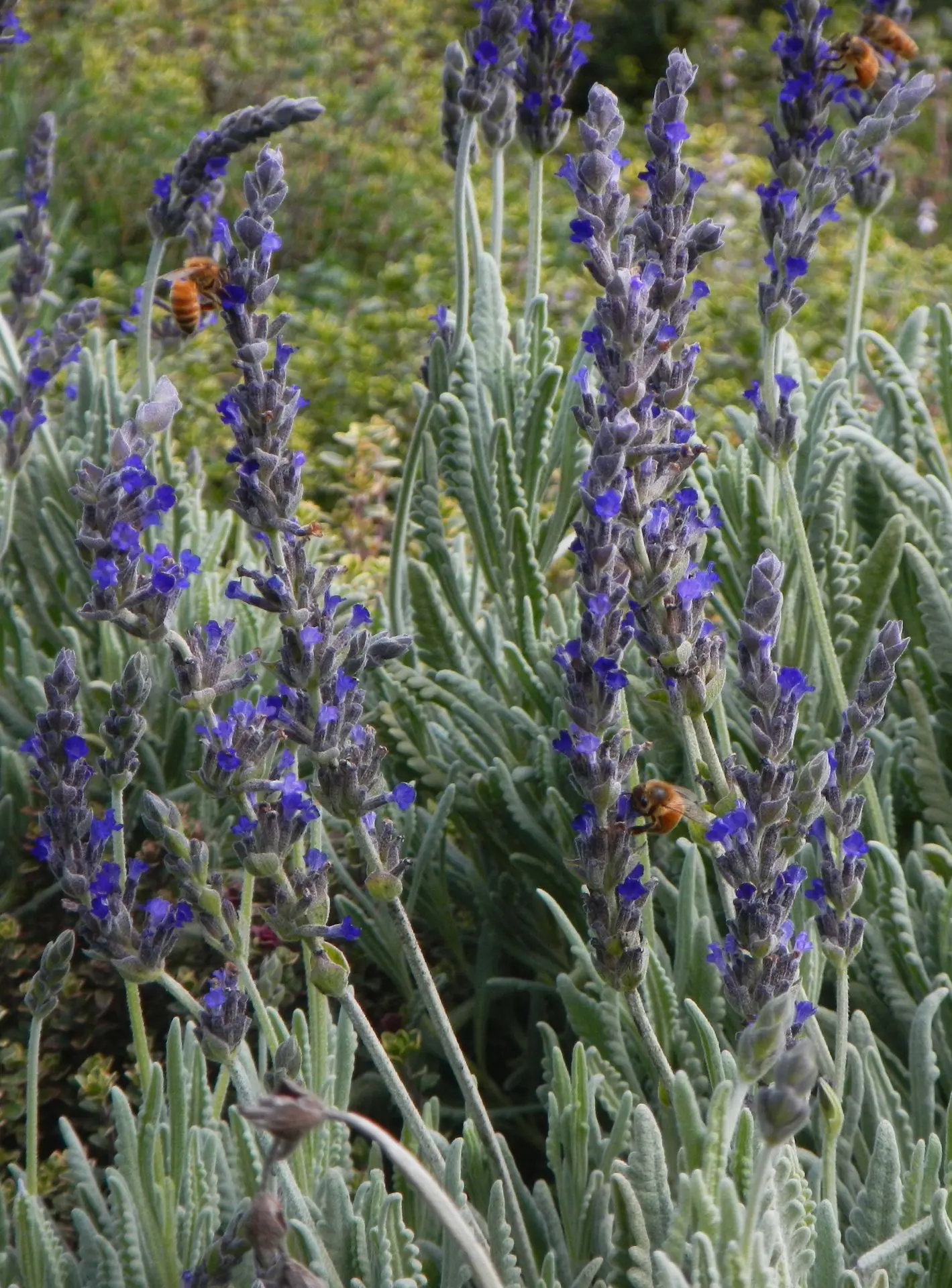
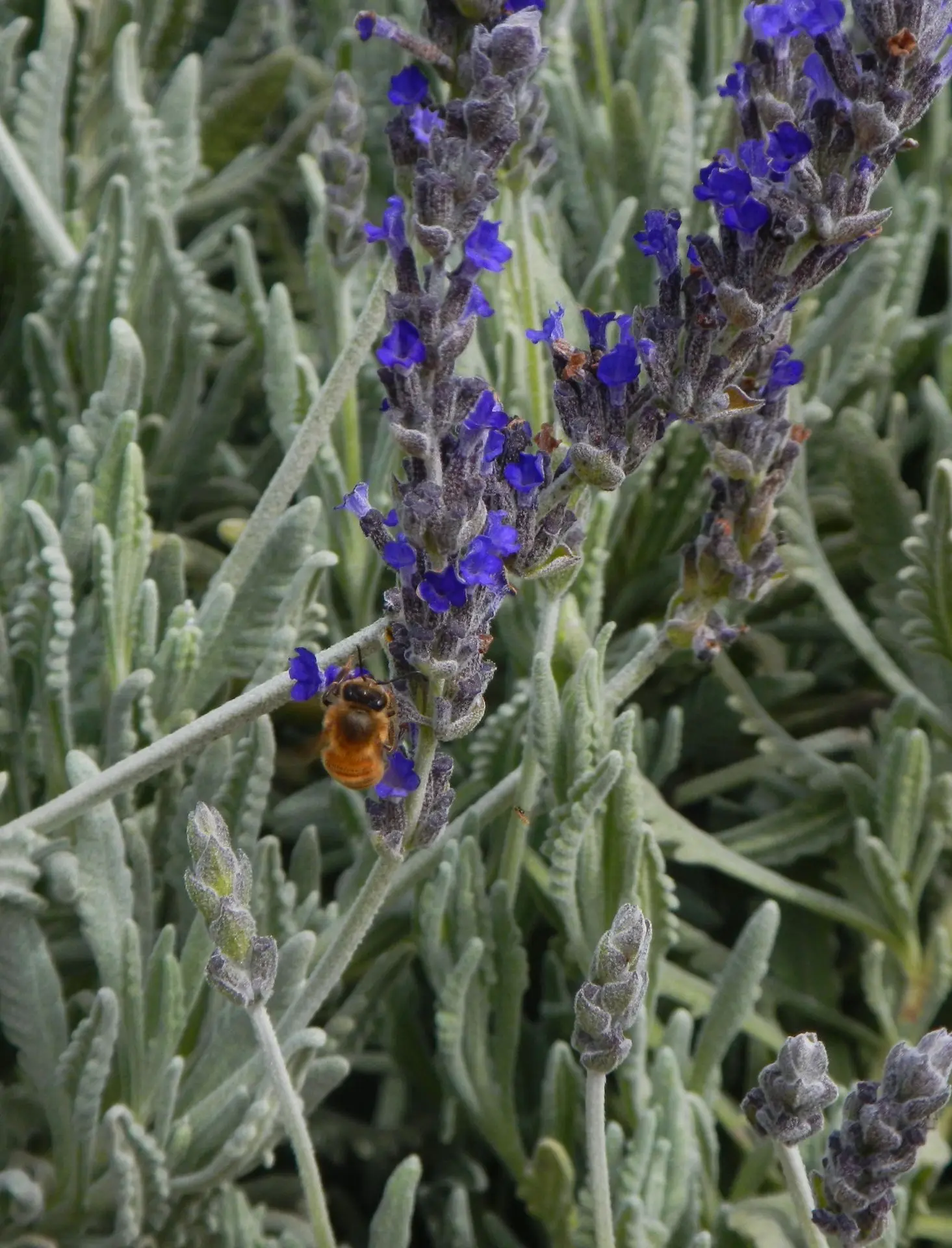
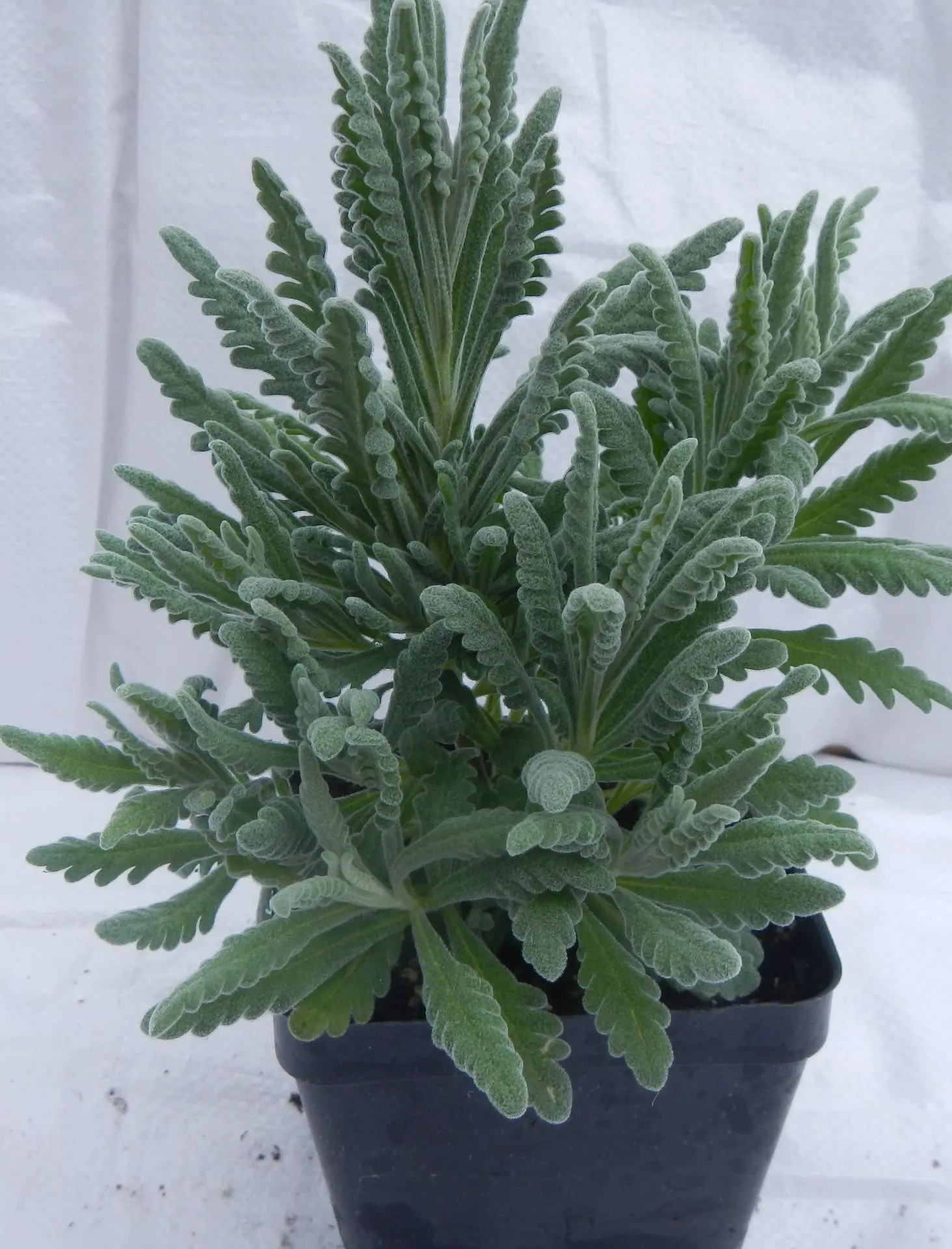
Goodwin Creek Lavender is very fragrant and produces beautiful, deep purple blooms that bees, butterflies, and other pollinators love. We like to plant this lavender in large pots to place in our garden during the summer, and them bring them indoors for the winter. It thrives in well-drained soil.
Available during May in a 4" pot. Plant outdoors only after danger of frost has passed (May 15).
Light: Full Sun |
Life Cycle: Tender Perennial (treat as an annual) |
Height: 24-36" |
Goodwin Creek Lavender is very fragrant and produces beautiful, deep purple blooms that bees, butterflies, and other pollinators love. We like to plant this lavender in large pots to place in our garden during the summer, and them bring them indoors for the winter. It thrives in well-drained soil.
Available during May in a 4" pot. Plant outdoors only after danger of frost has passed (May 15).
Light: Full Sun |
Life Cycle: Tender Perennial (treat as an annual) |
Height: 24-36" |

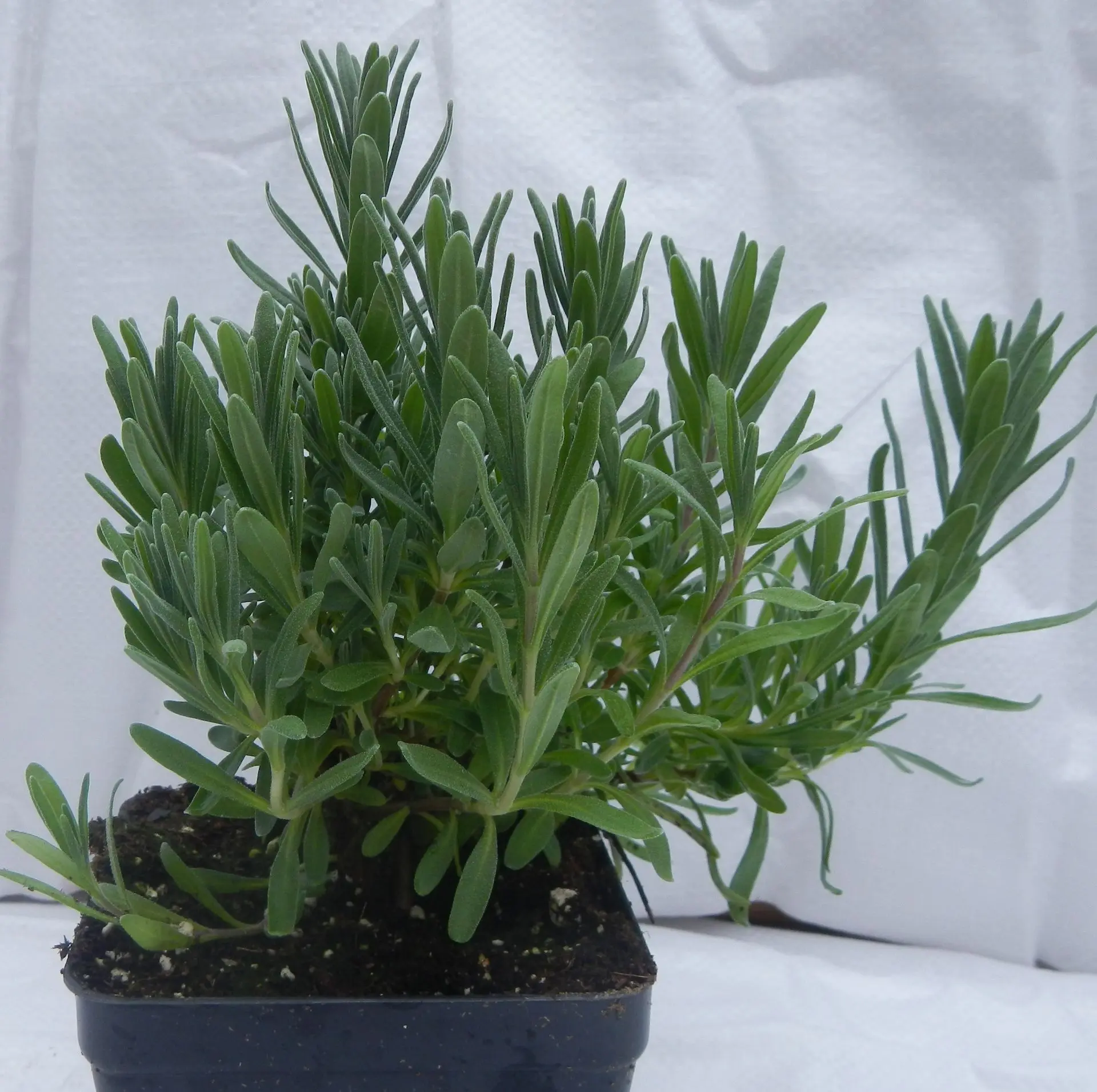
Also known as English Lavender, Munstead is very fragrant, and is often used for cooking. The plant is compact, low, and bushy, with profuse, blue flowers in early summer that attract pollinators like butterflies and bees. Requires well-drained soil.
Available during May in a 4" pot.
Light: Full Sun |
Life Cycle: Perennial |
Height: 12-18" |
Also known as English Lavender, Munstead is very fragrant, and is often used for cooking. The plant is compact, low, and bushy, with profuse, blue flowers in early summer that attract pollinators like butterflies and bees. Requires well-drained soil.
Available during May in a 4" pot.
Light: Full Sun |
Life Cycle: Perennial |
Height: 12-18" |

Variegated Lavender has beautiful gold and green foliage and emits an extremely pleasant fragrance. These plants are quite slow-growing and require well-drained soil but will reward patience with their uniquely attractive foliage. Because of its slow growth and cold sensitivity we recommend growing it outdoors in a container and bringing it indoors during the winter.
Available during May in a 4" or 6" pot. Plant outdoors only after danger of frost has passed (May 15).
Light: Full Sun |
Life Cycle: Tender Perennial (treat as an annual) |
Height: 12-24" |
Variegated Lavender has beautiful gold and green foliage and emits an extremely pleasant fragrance. These plants are quite slow-growing and require well-drained soil but will reward patience with their uniquely attractive foliage. Because of its slow growth and cold sensitivity we recommend growing it outdoors in a container and bringing it indoors during the winter.
Available during May in a 4" or 6" pot. Plant outdoors only after danger of frost has passed (May 15).
Light: Full Sun |
Life Cycle: Tender Perennial (treat as an annual) |
Height: 12-24" |
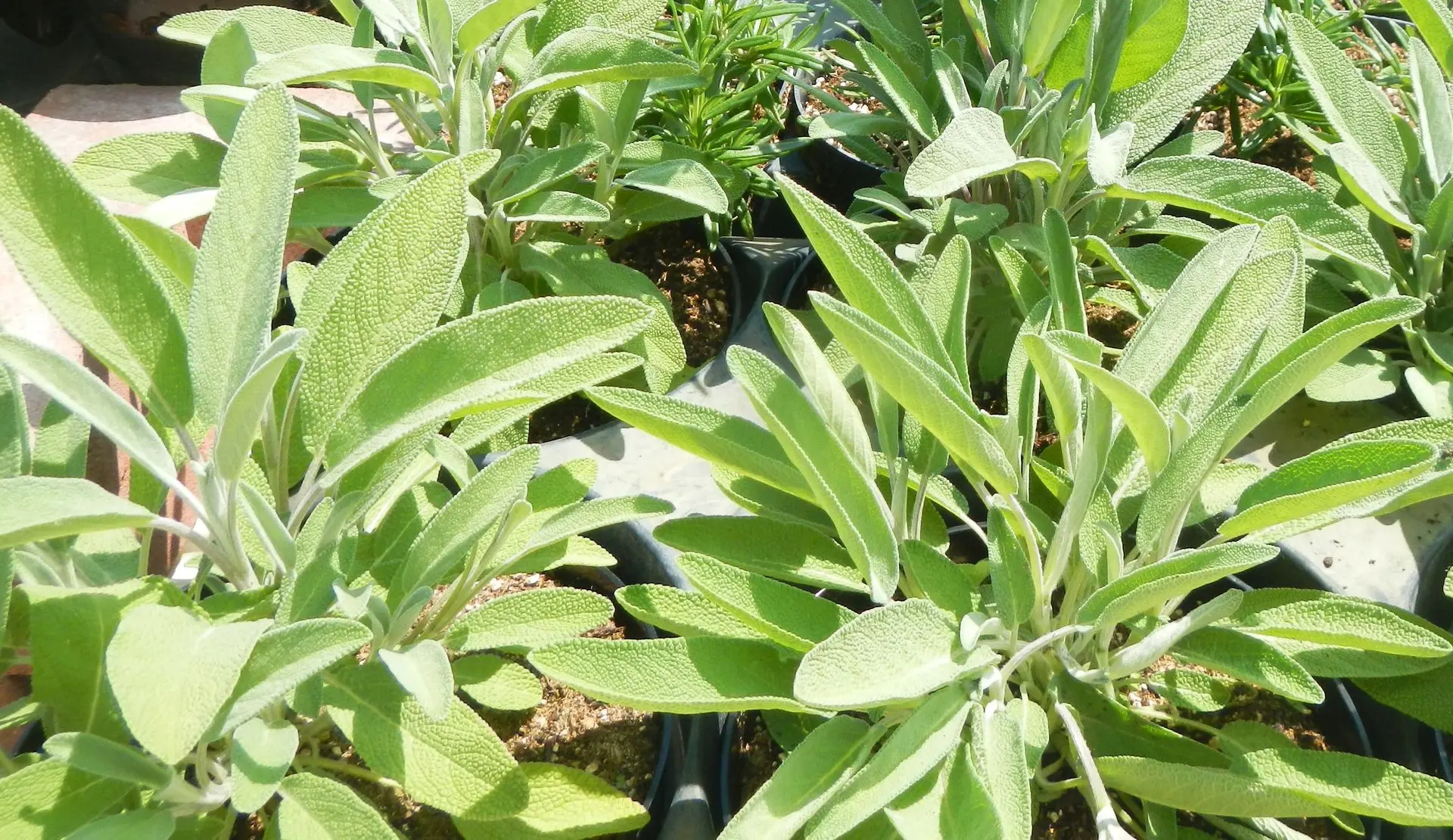
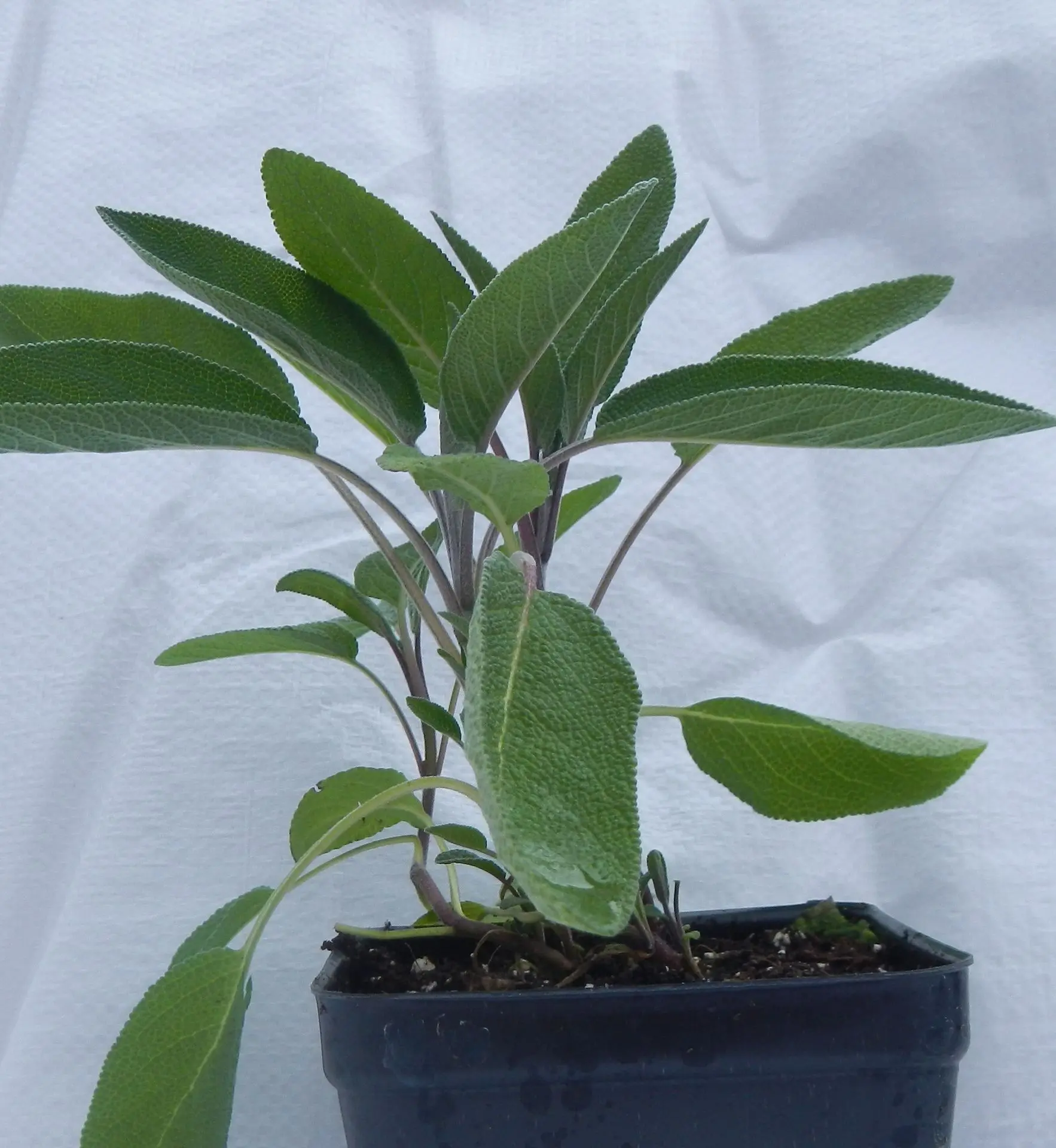
Sage makes an excellent garden plant, forming a bush that will bloom violet as it matures. Its pleasant, mild flavor and aroma make it useful in a wide variety of dishes. Sage is very low maintenance once established, prefers well-drained soil, and can tolerate dry conditions.
Available during May in a 4" pot.
Light: Full Sun |
Life Cycle: Perennial |
Height: 18-36" |
Sage makes an excellent garden plant, forming a bush that will bloom violet as it matures. Its pleasant, mild flavor and aroma make it useful in a wide variety of dishes. Sage is very low maintenance once established, prefers well-drained soil, and can tolerate dry conditions.
Available during May in a 4" pot.
Light: Full Sun |
Life Cycle: Perennial |
Height: 18-36" |

Variegated Sage sports unique golden-lime foliage with fascinating patterning. It is slower growing and more compact than typical sage, and must be taken indoors to overwinter in Iowa. It prefers well-drained soil and can tolerate dry conditions.
Available during May in a 4" pot. Plant outdoors only after danger of frost has passed (May 15).
Light: Full Sun |
Life Cycle: Tender Perennial (treat as an annual) |
Height: 10-12" |
Variegated Sage sports unique golden-lime foliage with fascinating patterning. It is slower growing and more compact than typical sage, and must be taken indoors to overwinter in Iowa. It prefers well-drained soil and can tolerate dry conditions.
Available during May in a 4" pot. Plant outdoors only after danger of frost has passed (May 15).
Light: Full Sun |
Life Cycle: Tender Perennial (treat as an annual) |
Height: 10-12" |
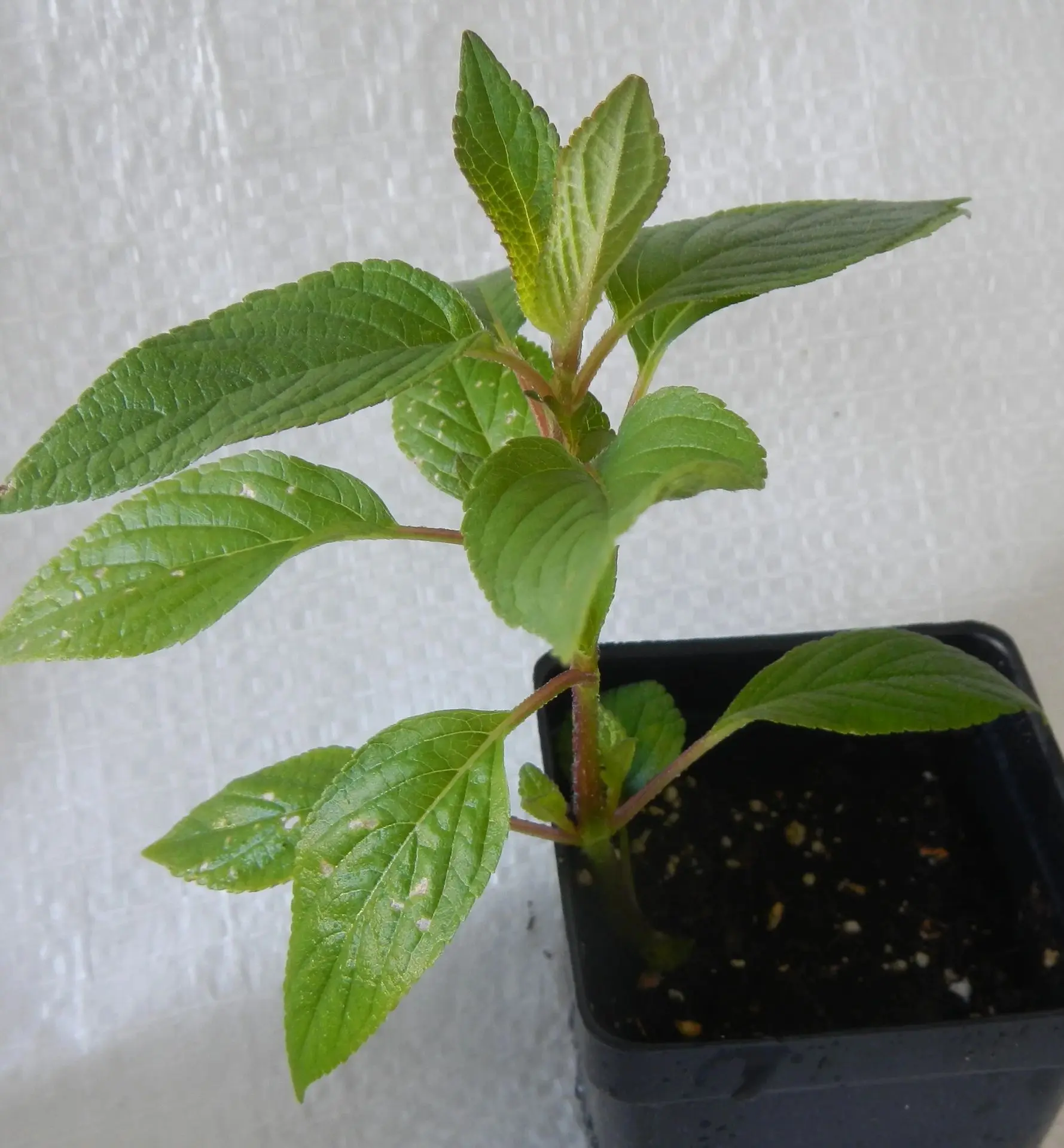
Pineapple Sage produces a strong, fresh pineapple fragrance when the leaves are bruised. It will quickly grow into a large, attractive bush, and when mature may sport bright red tubular flowers that hummingbirds love! It prefers well drained soil, but appreciates moisture, and will drop leaves if it gets too dry. We like to keep this plant in a large pot to bring in over the cold winter months; it will go dormant and lose most of its leaves, but come springtime will bud out to quickly become a large, vibrant bush–in fact we find that breaking dormancy often causes it to bloom.
Available during May in a 4" pot. Plant outdoors only after danger of frost has passed (May 15).
Light: Full Sun |
Life Cycle: Tender Perennial (treat as an annual) |
Height: 36-60" |
Pineapple Sage produces a strong, fresh pineapple fragrance when the leaves are bruised. It will quickly grow into a large, attractive bush, and when mature may sport bright red tubular flowers that hummingbirds love! It prefers well drained soil, but appreciates moisture, and will drop leaves if it gets too dry. We like to keep this plant in a large pot to bring in over the cold winter months; it will go dormant and lose most of its leaves, but come springtime will bud out to quickly become a large, vibrant bush–in fact we find that breaking dormancy often causes it to bloom.
Available during May in a 4" pot. Plant outdoors only after danger of frost has passed (May 15).
Light: Full Sun |
Life Cycle: Tender Perennial (treat as an annual) |
Height: 36-60" |
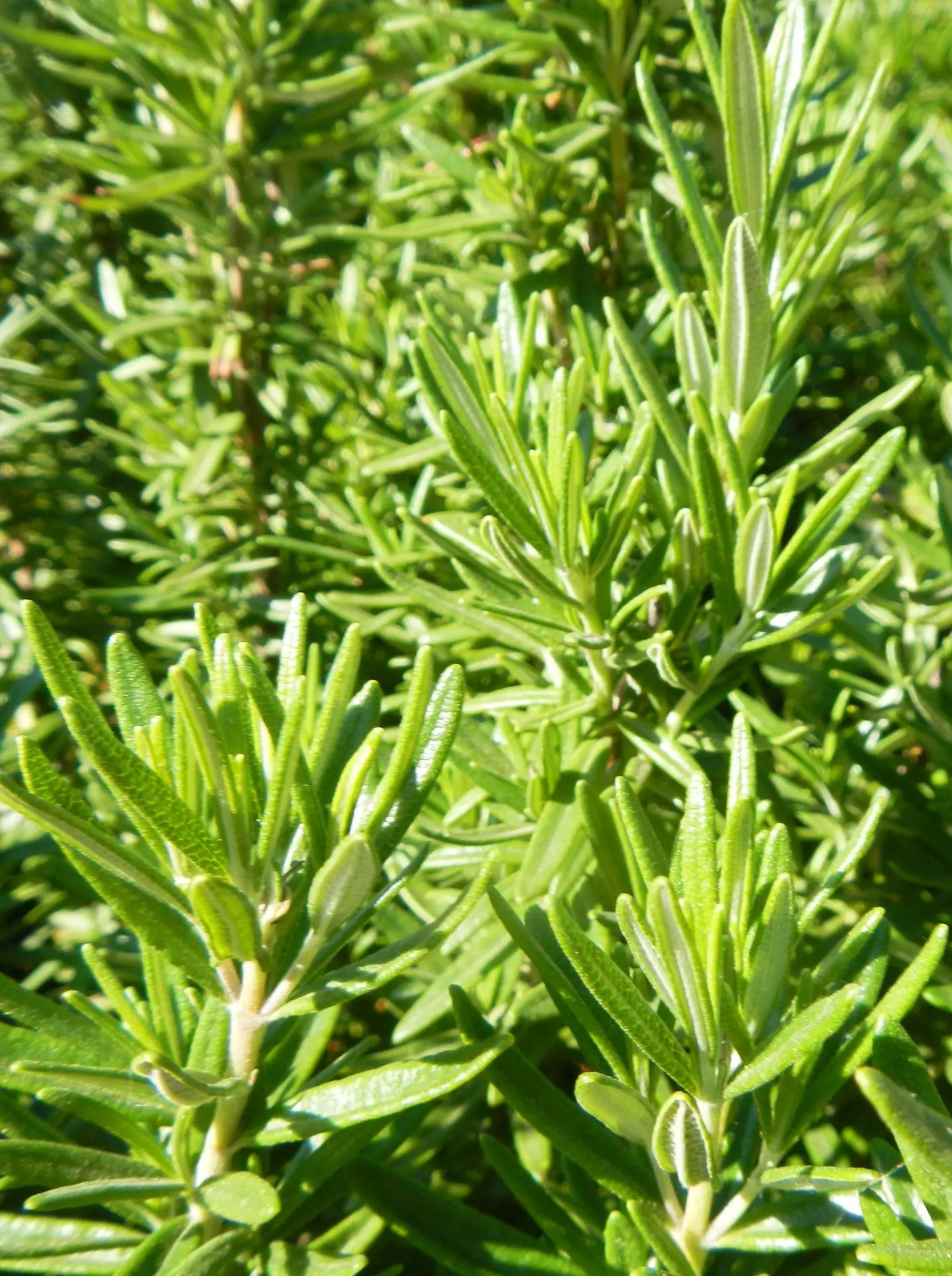
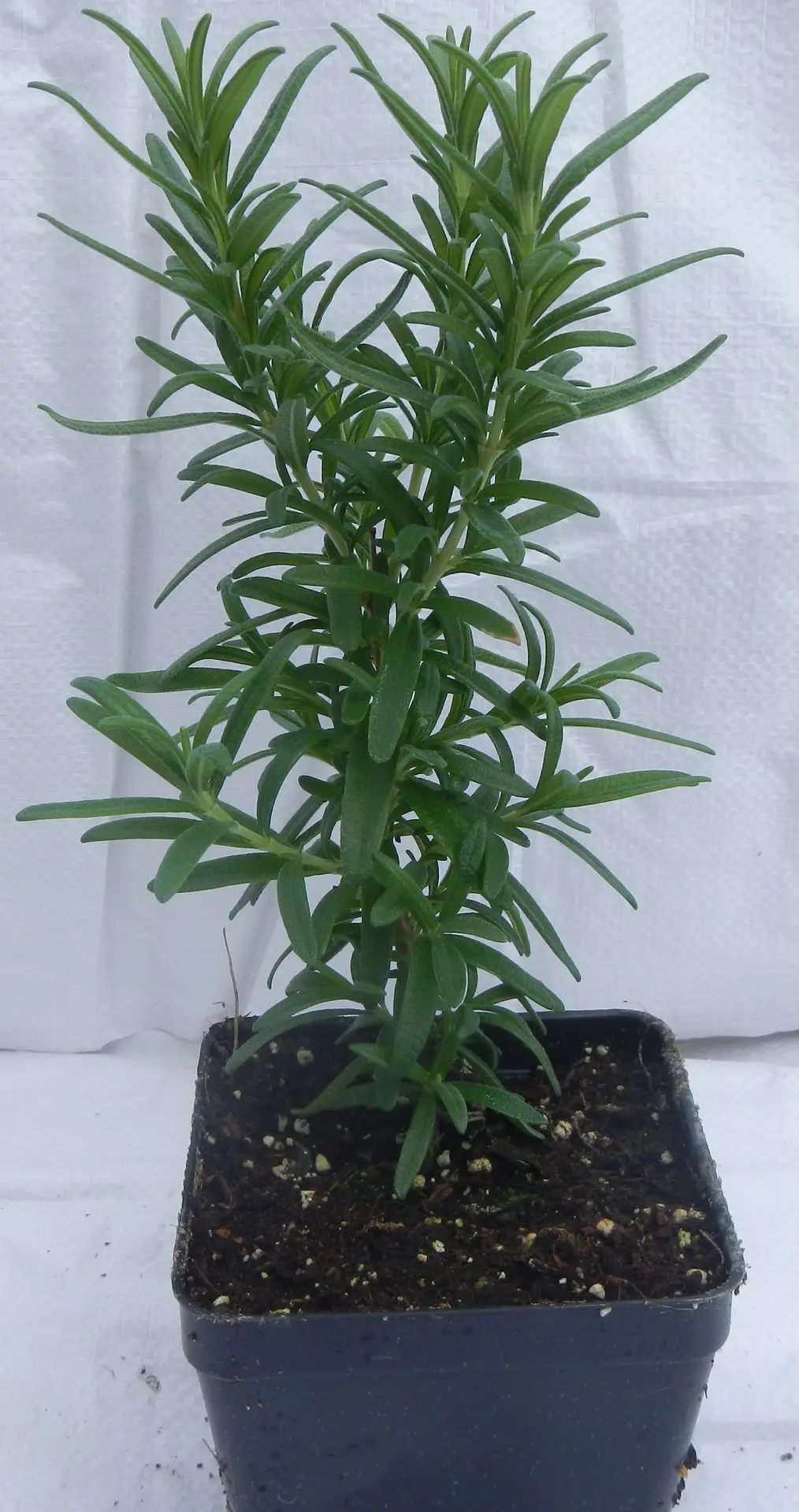
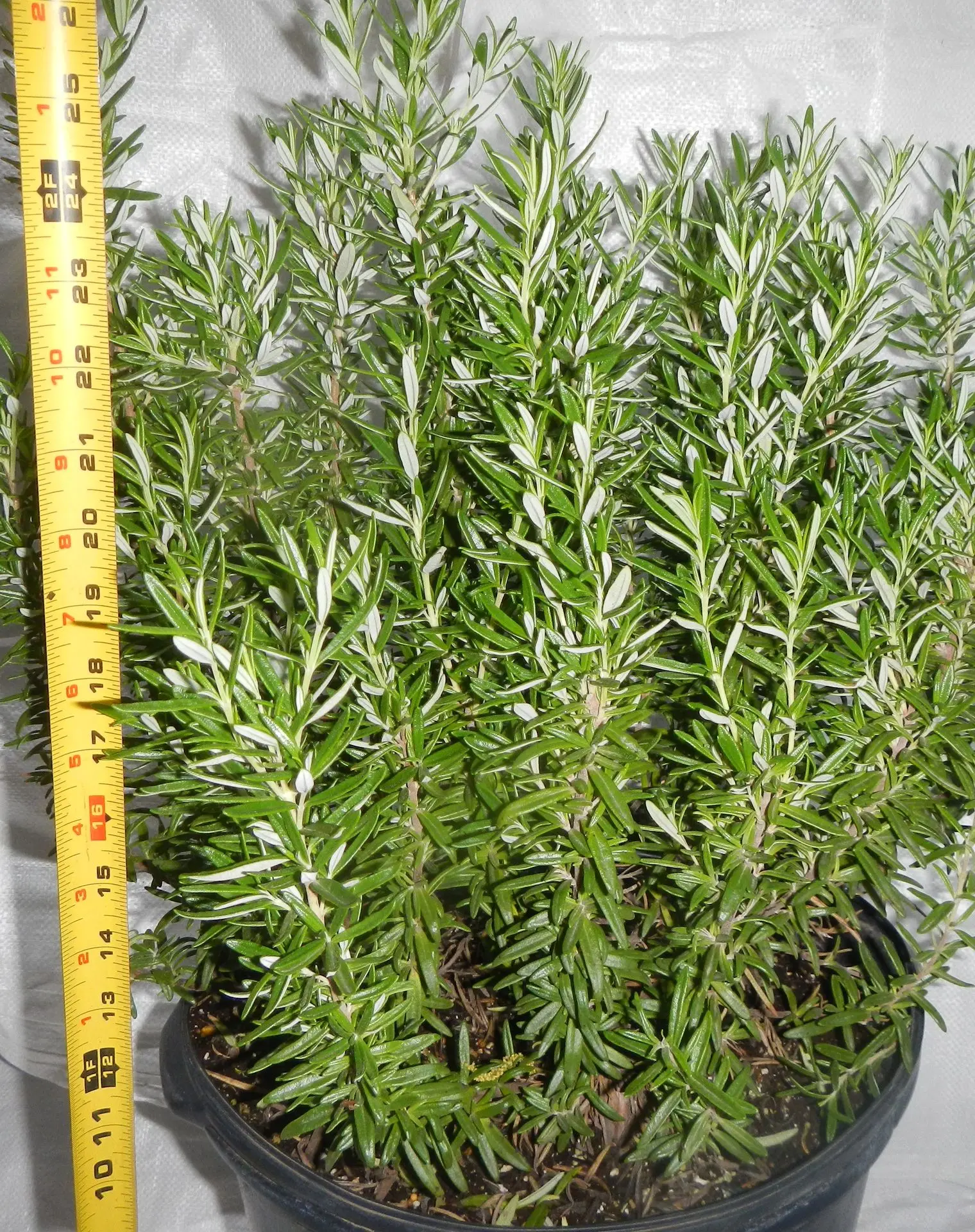
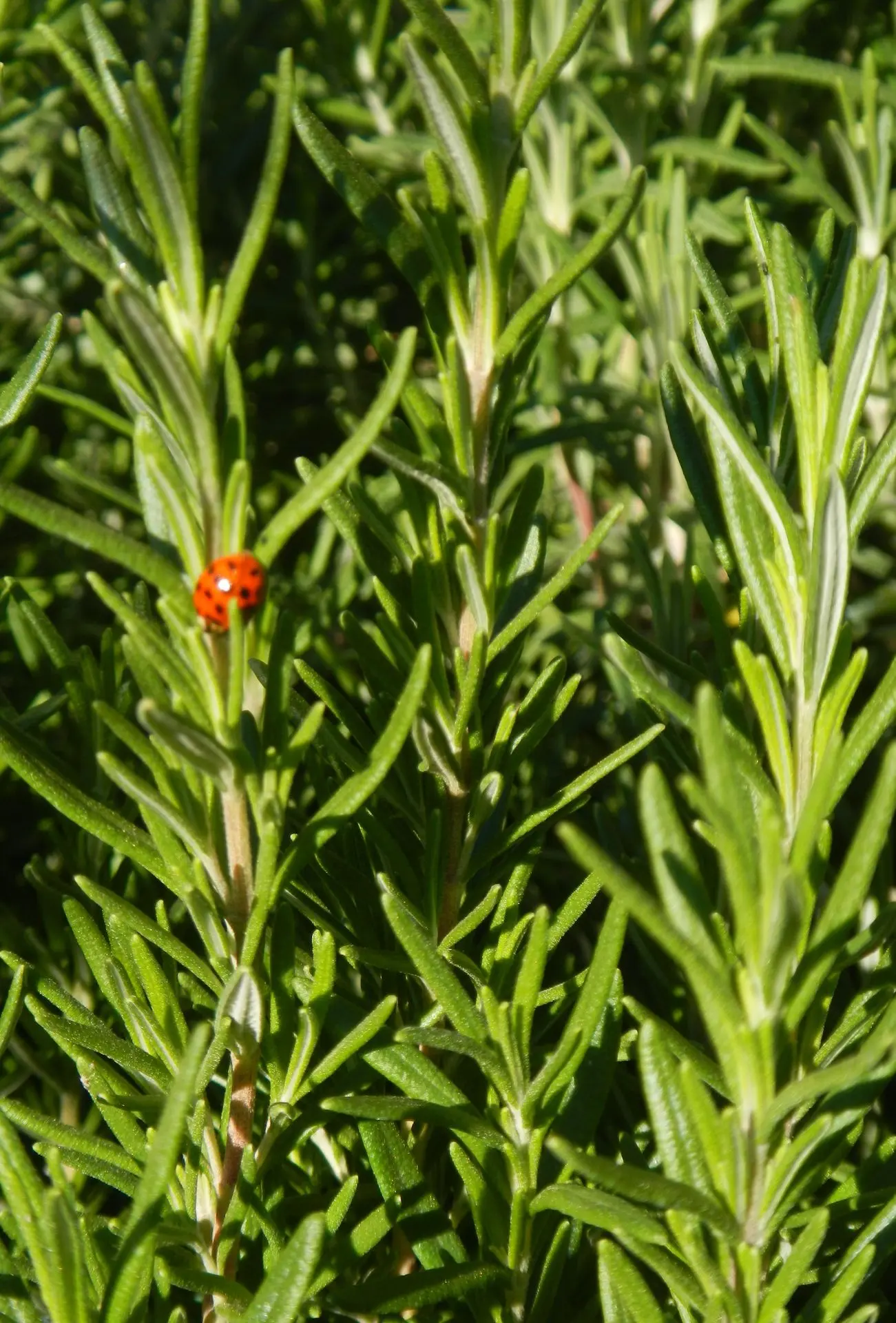
Rosemary is excellent for adding flavor to roasted dishes, breads, and more. It is very easy to grow and does well in containers. It requires well-drained soil and tolerates being dry very well. It must be brought indoors to overwinter.
Available during May in a 4" or 6" pot. Occasionally we will offer large, 2-3 year old plants we have overwintered in 5 gallon pots.
Light: Full Sun |
Life Cycle: Tender Perennial (treat as an annual) |
Height: 24-36" |
Rosemary is excellent for adding flavor to roasted dishes, breads, and more. It is very easy to grow and does well in containers. It requires well-drained soil and tolerates being dry very well. It must be brought indoors to overwinter.
Available during May in a 4" or 6" pot. Occasionally we will offer large, 2-3 year old plants we have overwintered in 5 gallon pots.
Light: Full Sun |
Life Cycle: Tender Perennial (treat as an annual) |
Height: 24-36" |
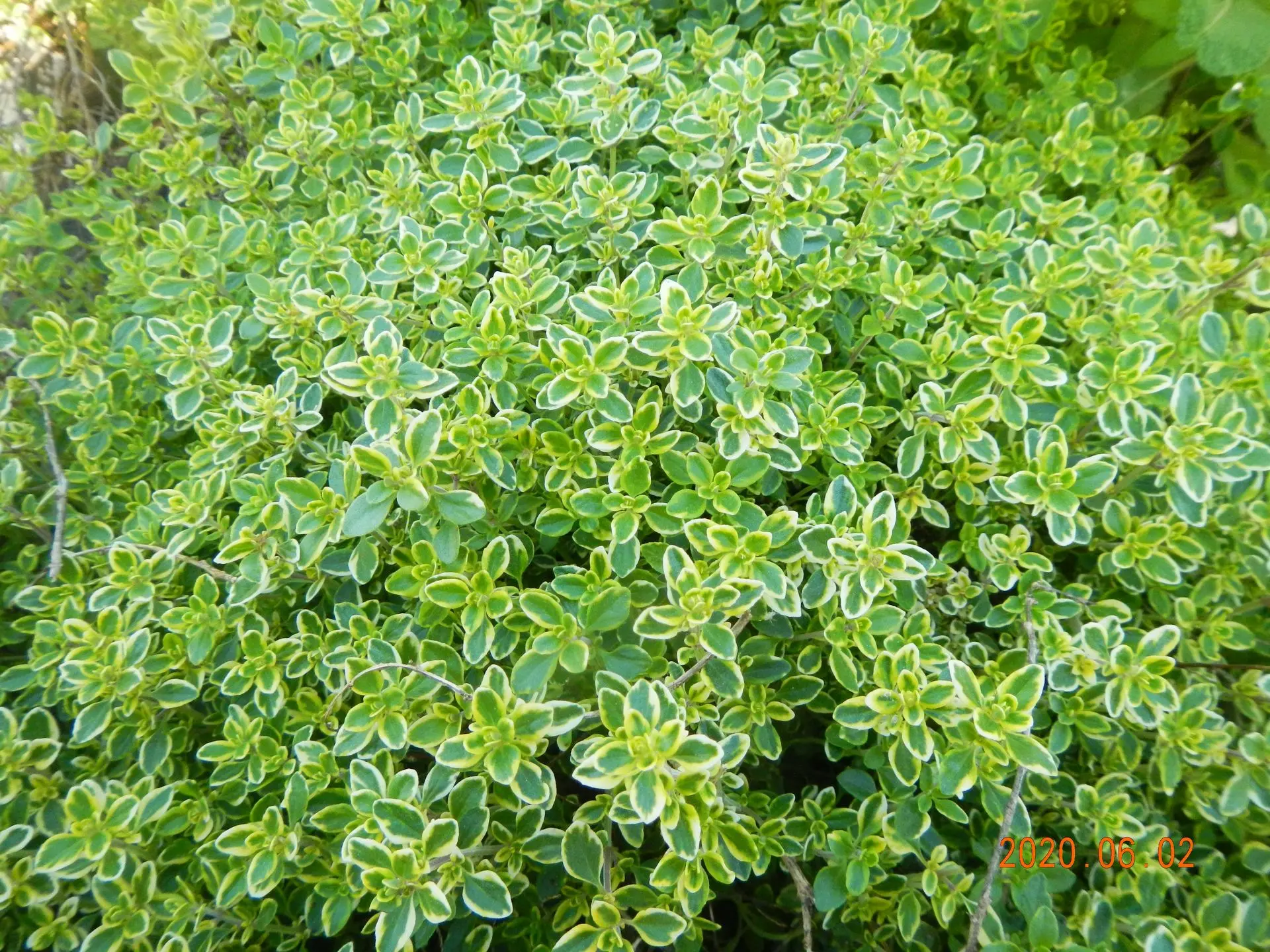

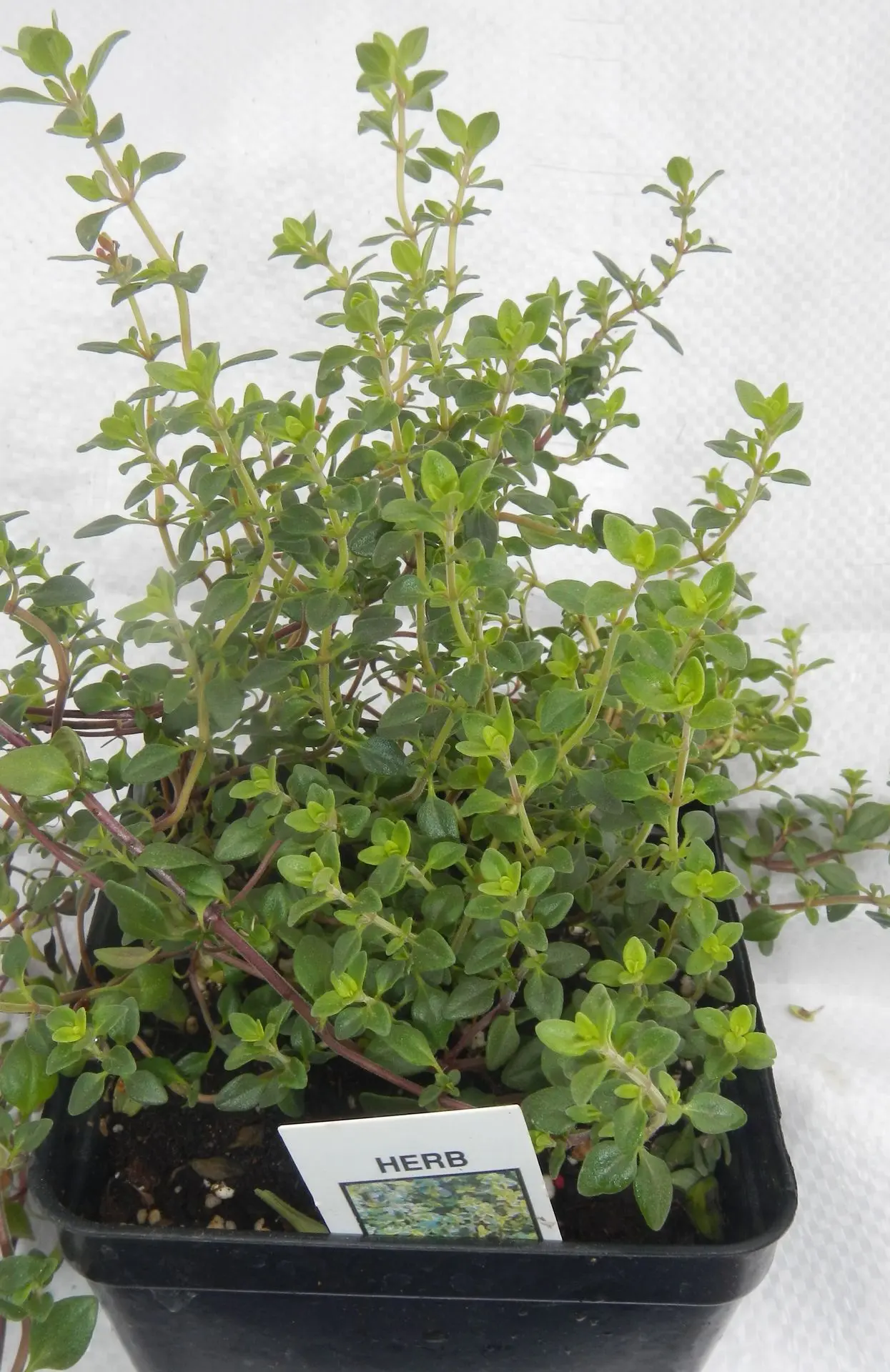
Lemon Thyme has a soft, lemony flavor and fragrance that make it an extremely popular herb. It tends to grow slowly, but is very resilient, and over the course of years can spread to become a dense, green and yellow ground cover. It will bloom with tiny lavender flowers in summer.
Available during May in a 4" pot.
Light: Full Sun to Part Shade |
Life Cycle: Perennial |
Height: 6-12" |
Lemon Thyme has a soft, lemony flavor and fragrance that make it an extremely popular herb. It tends to grow slowly, but is very resilient, and over the course of years can spread to become a dense, green and yellow ground cover. It will bloom with tiny lavender flowers in summer.
Available during May in a 4" pot.
Light: Full Sun to Part Shade |
Life Cycle: Perennial |
Height: 6-12" |
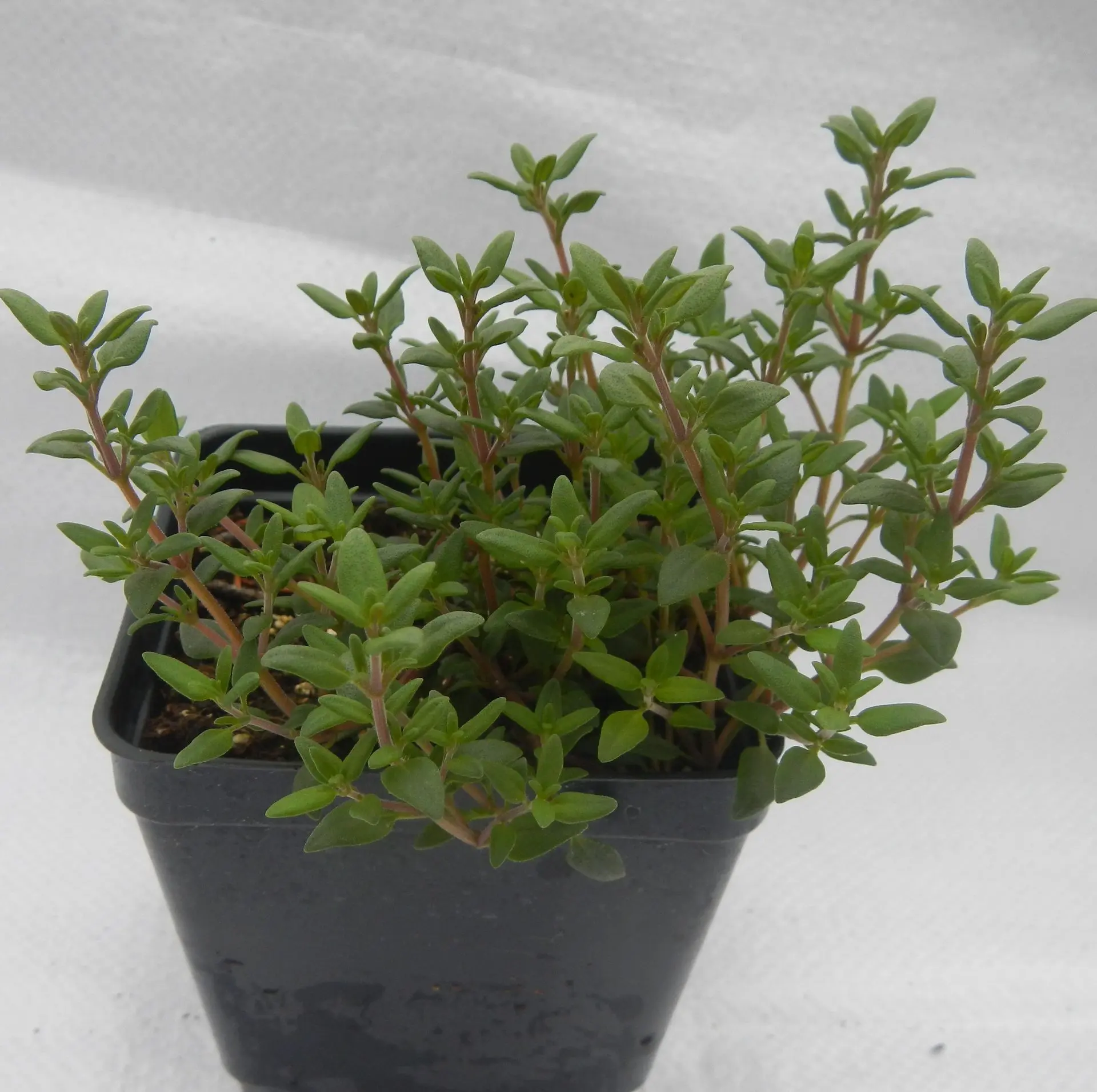
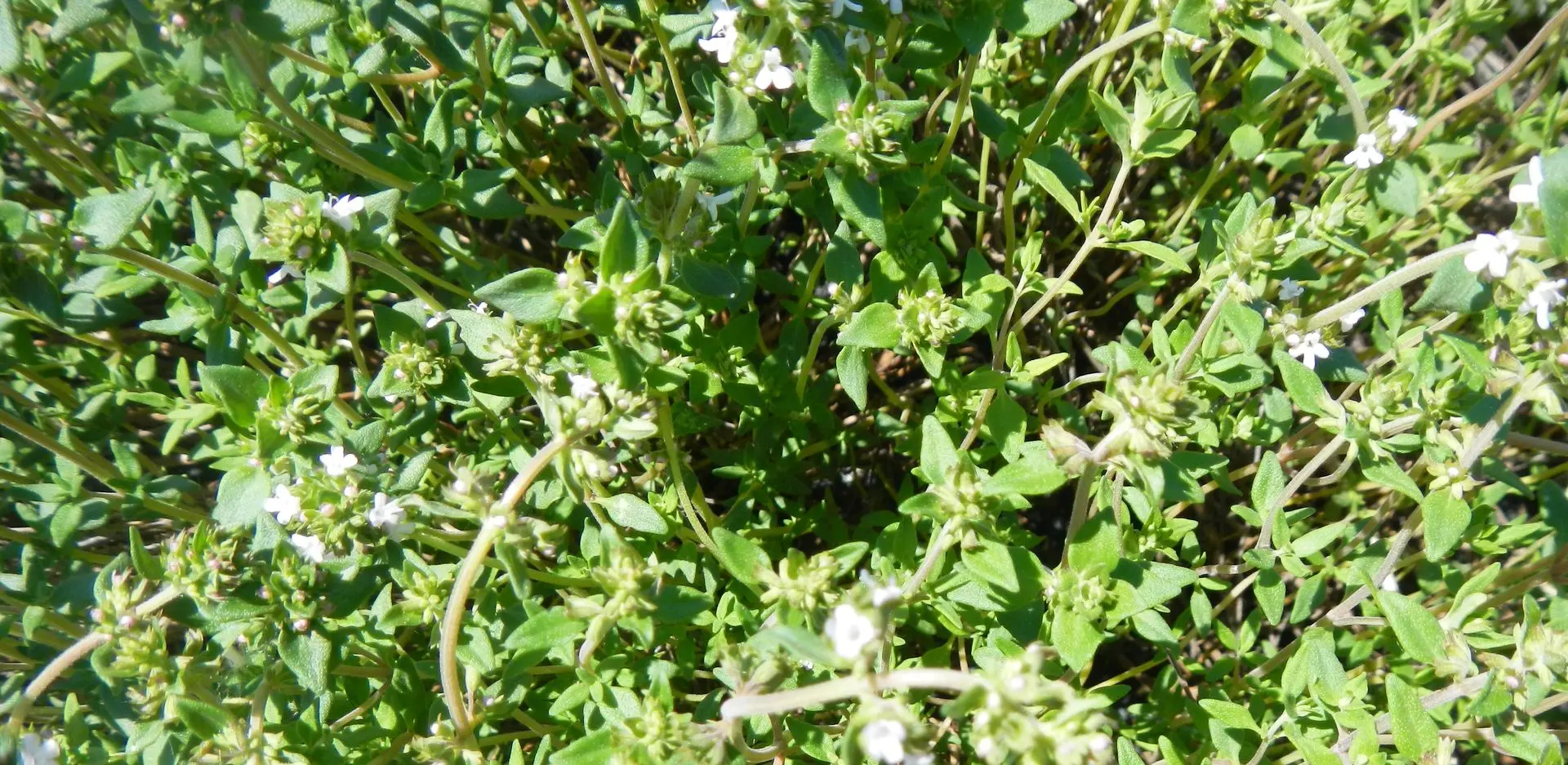
Winter thyme has a unique, soft flavor that goes well with roasted veggies, potatoes, eggs, and much more. The plants will slowly spread to form a ground cover, and when mature will sport tiny pink/white blossoms.
Available during May in a 4" pot.
Light: Full Sun to Part Shade |
Life Cycle: Perennial |
Height: 6-12" |
Winter thyme has a unique, soft flavor that goes well with roasted veggies, potatoes, eggs, and much more. The plants will slowly spread to form a ground cover, and when mature will sport tiny pink/white blossoms.
Available during May in a 4" pot.
Light: Full Sun to Part Shade |
Life Cycle: Perennial |
Height: 6-12" |
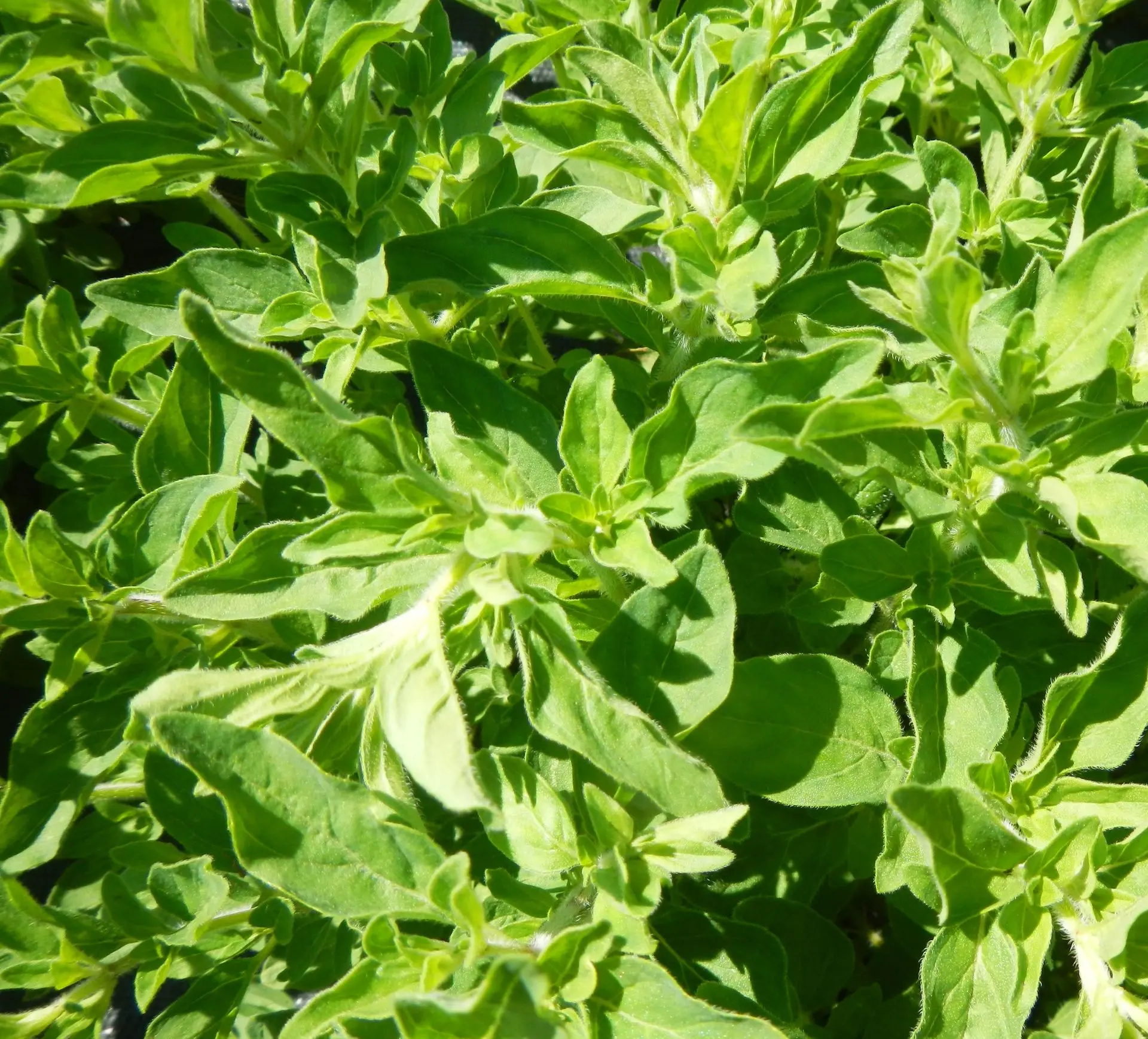
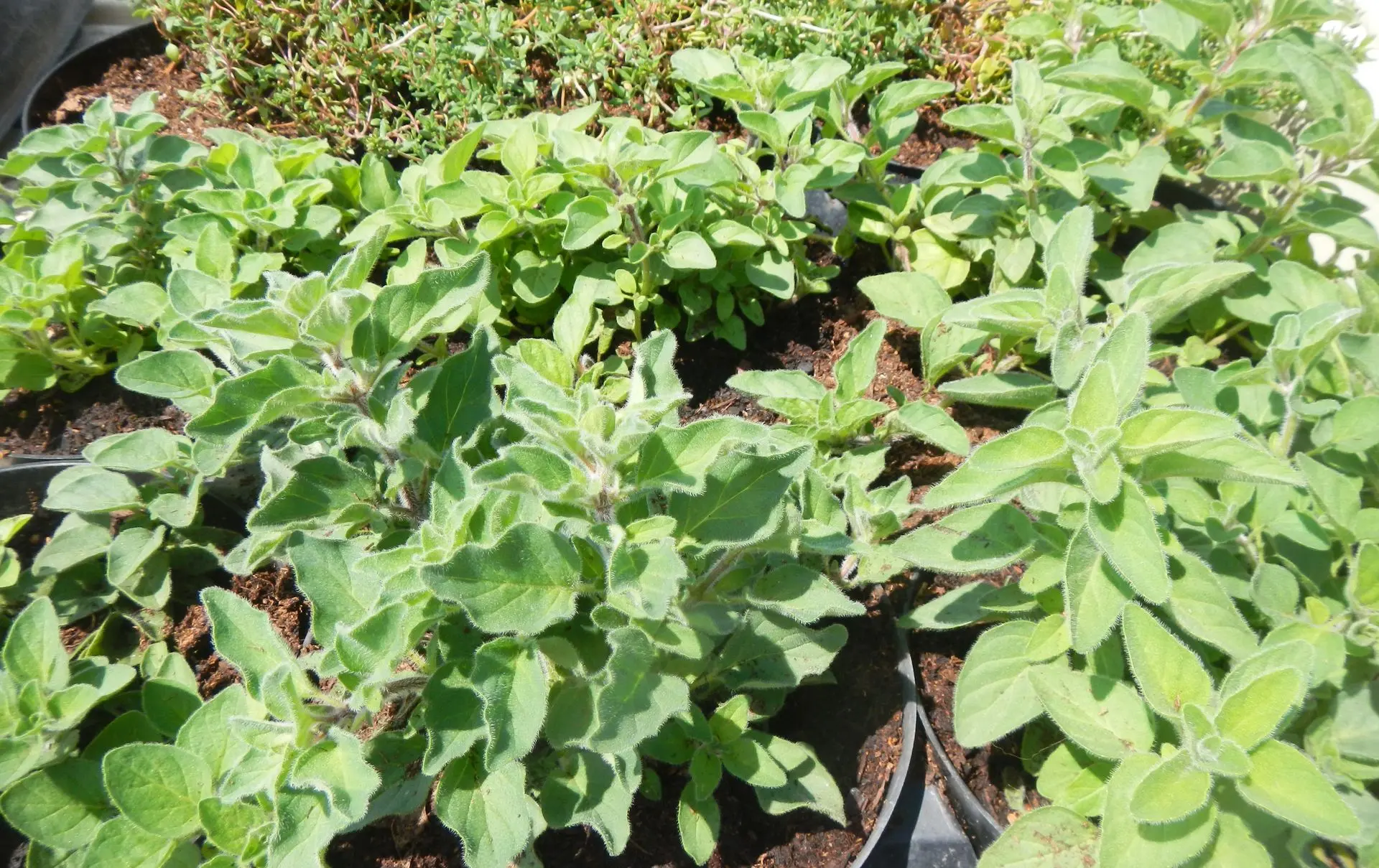
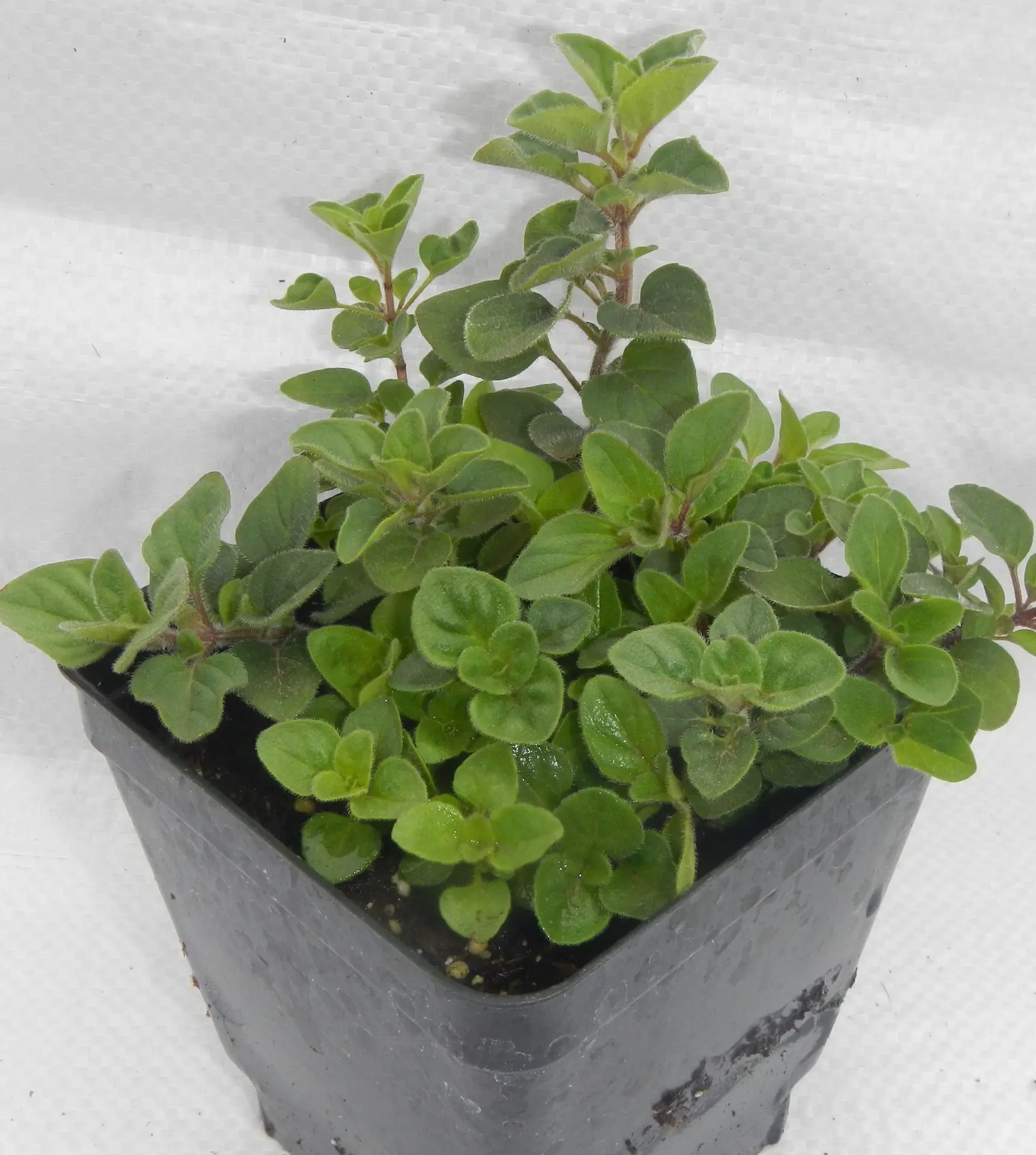
The soft, strongly aromatic leaves of Greek Oregano are great in pizza and other Italian dishes. The plants grow fairly quickly and will spread to form a mounded ground cover. In summer it will develop profuse white blooms that attract pollinators.
Available during May in a 4" pot.
Light: Full Sun to Part Shade |
Life Cycle: Perennial |
Height: 6-12" |
The soft, strongly aromatic leaves of Greek Oregano are great in pizza and other Italian dishes. The plants grow fairly quickly and will spread to form a mounded ground cover. In summer it will develop profuse white blooms that attract pollinators.
Available during May in a 4" pot.
Light: Full Sun to Part Shade |
Life Cycle: Perennial |
Height: 6-12" |
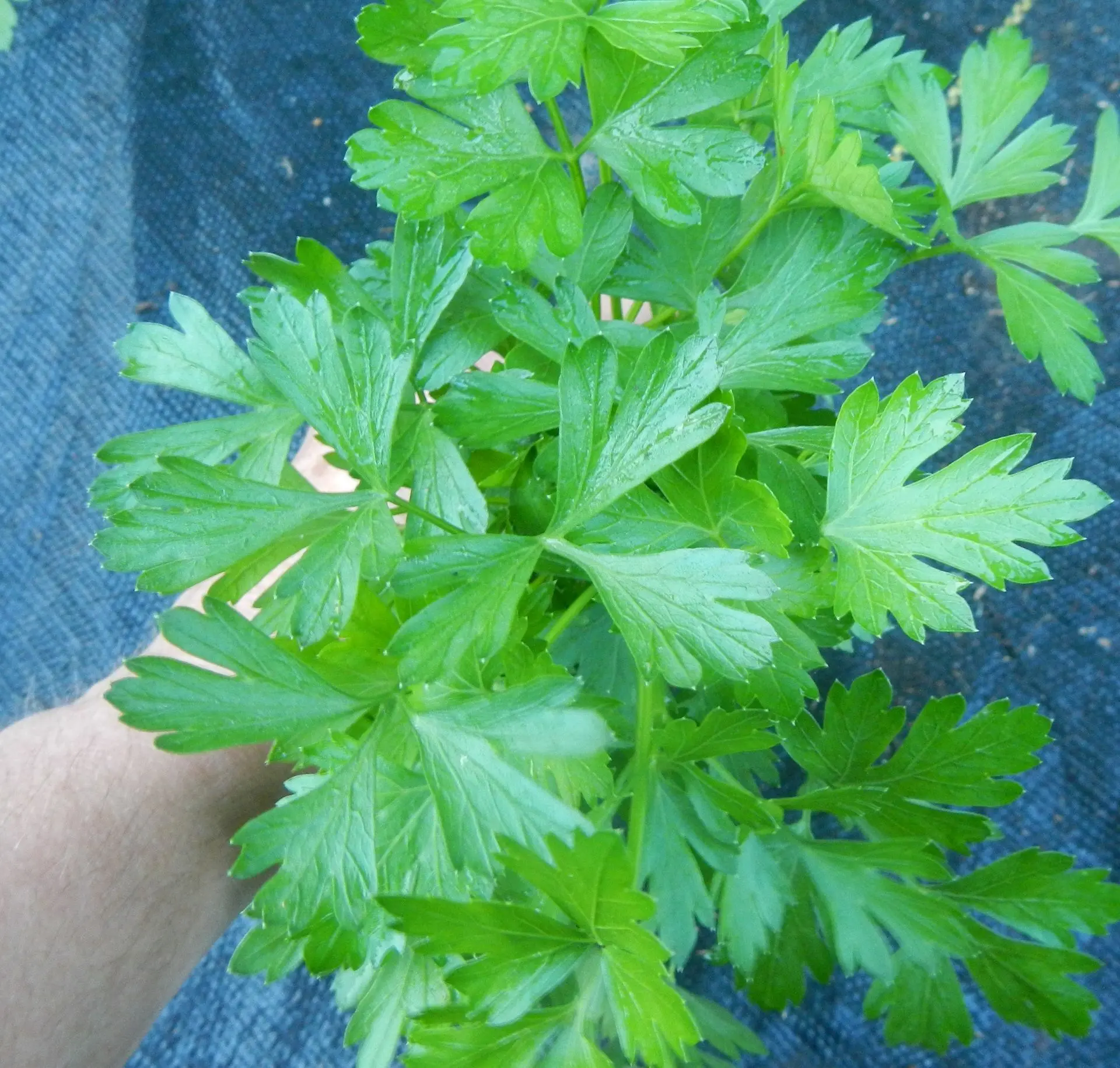
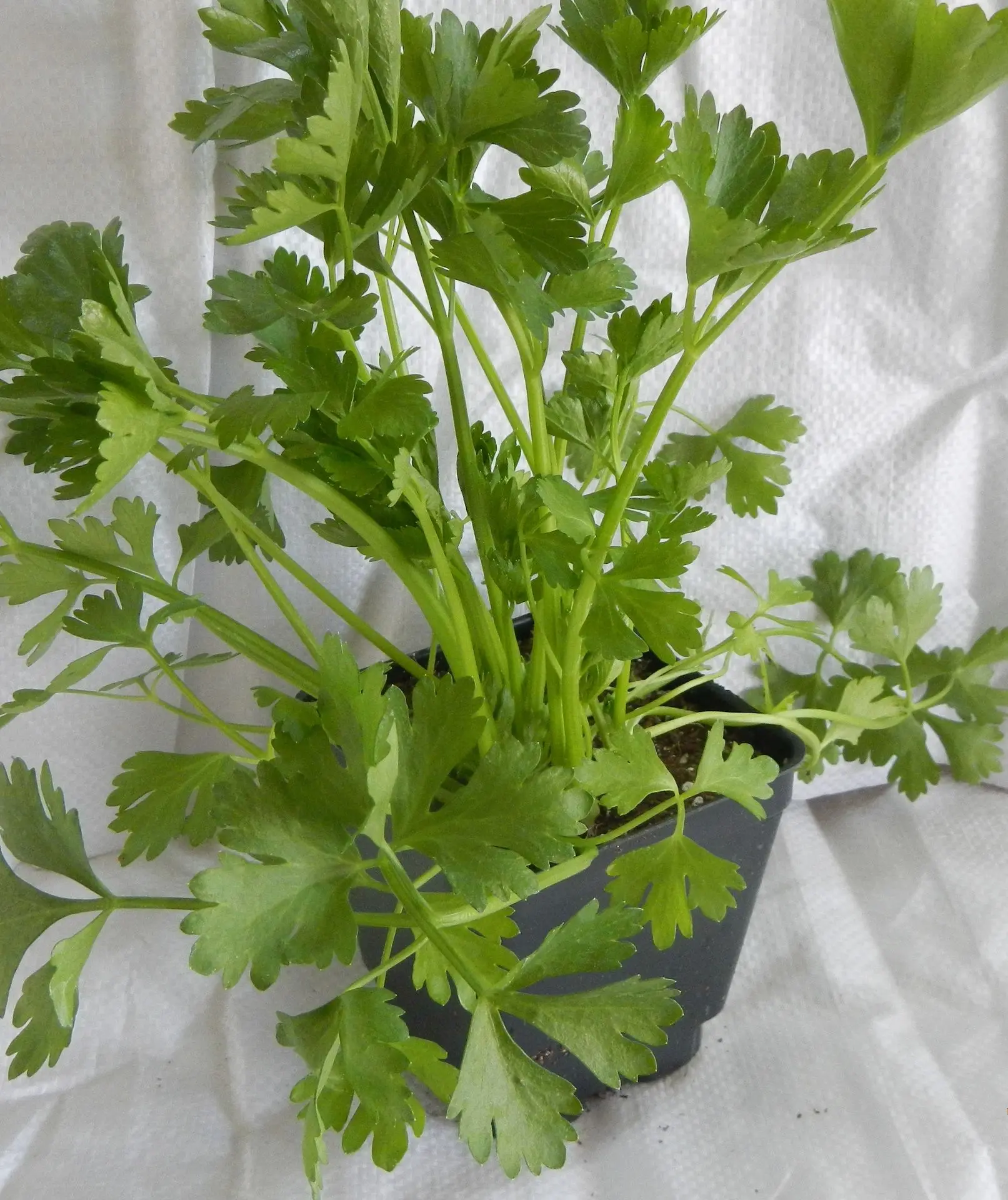
Flat Italian Parsley is popular for cooking, with strong flavor that makes it excellent as garnish, on salads, and in Italian dishes. The dense flat leaves are easy to chop. It does very well as a container plant.
Available during May in a 4" pot.
Light: Full Sun to Part Shade |
Life Cycle: Treat as an Annual |
Height: 12-18" |
Flat Italian Parsley is popular for cooking, with strong flavor that makes it excellent as garnish, on salads, and in Italian dishes. The dense flat leaves are easy to chop. It does very well as a container plant.
Available during May in a 4" pot.
Light: Full Sun to Part Shade |
Life Cycle: Treat as an Annual |
Height: 12-18" |
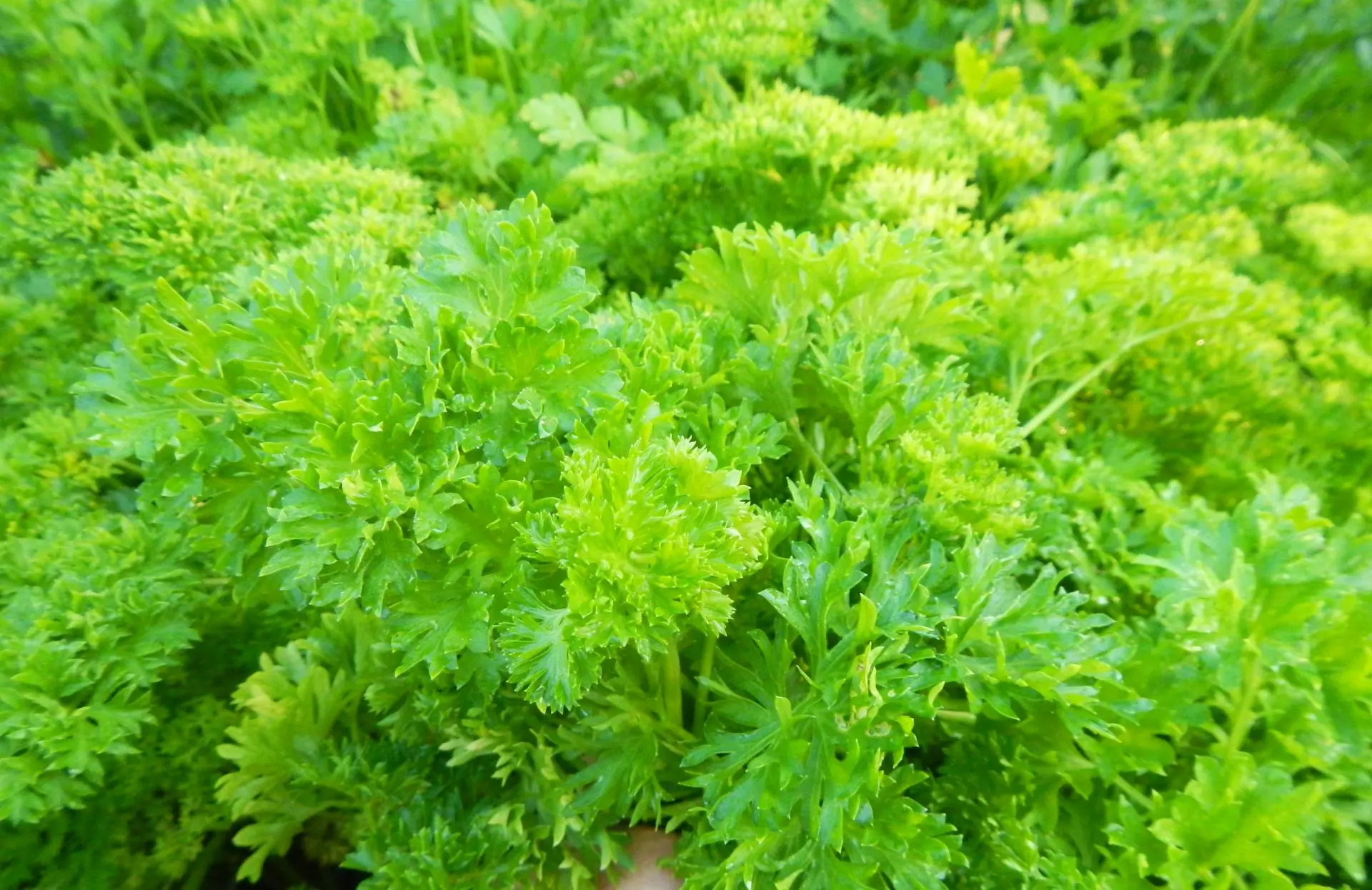
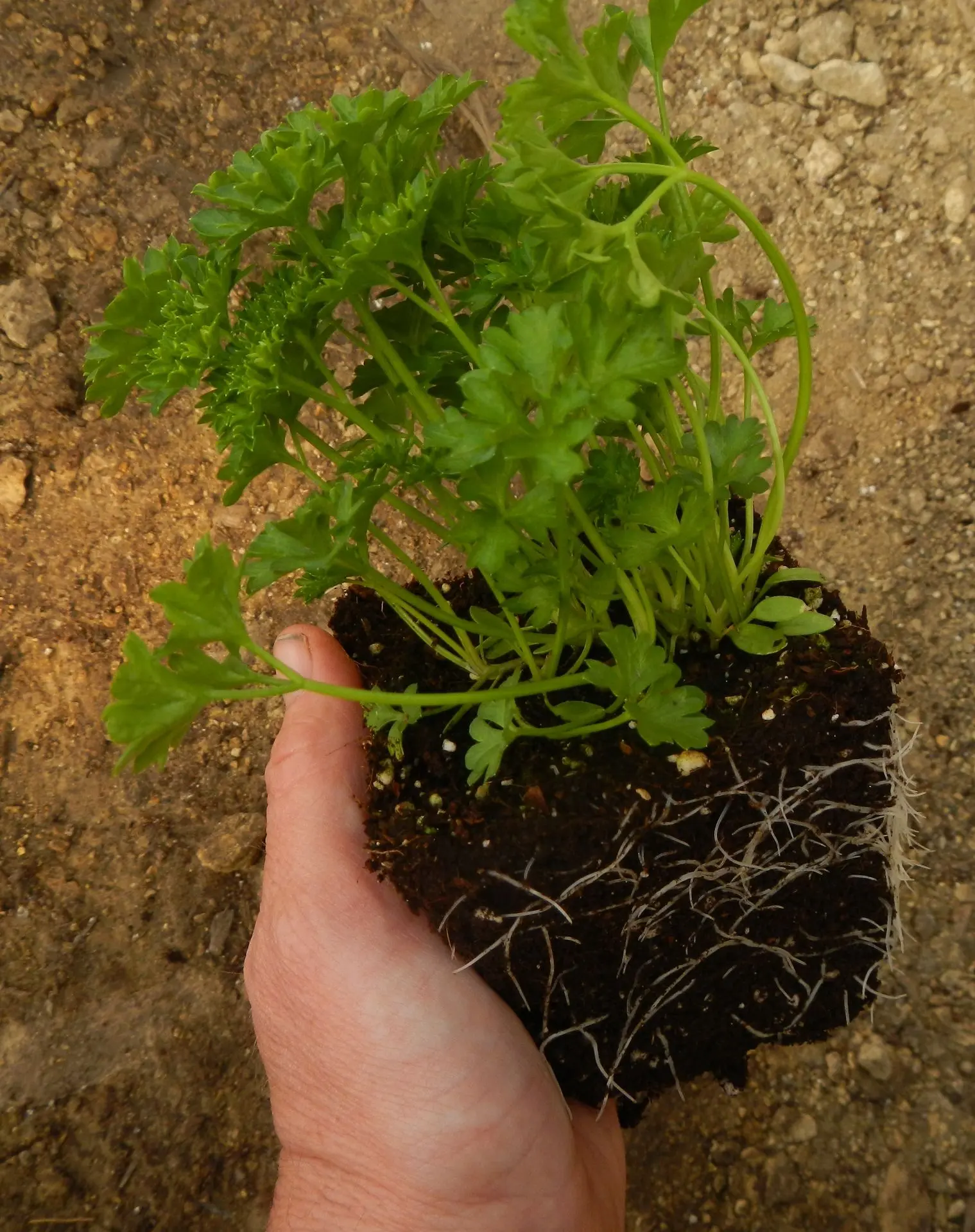
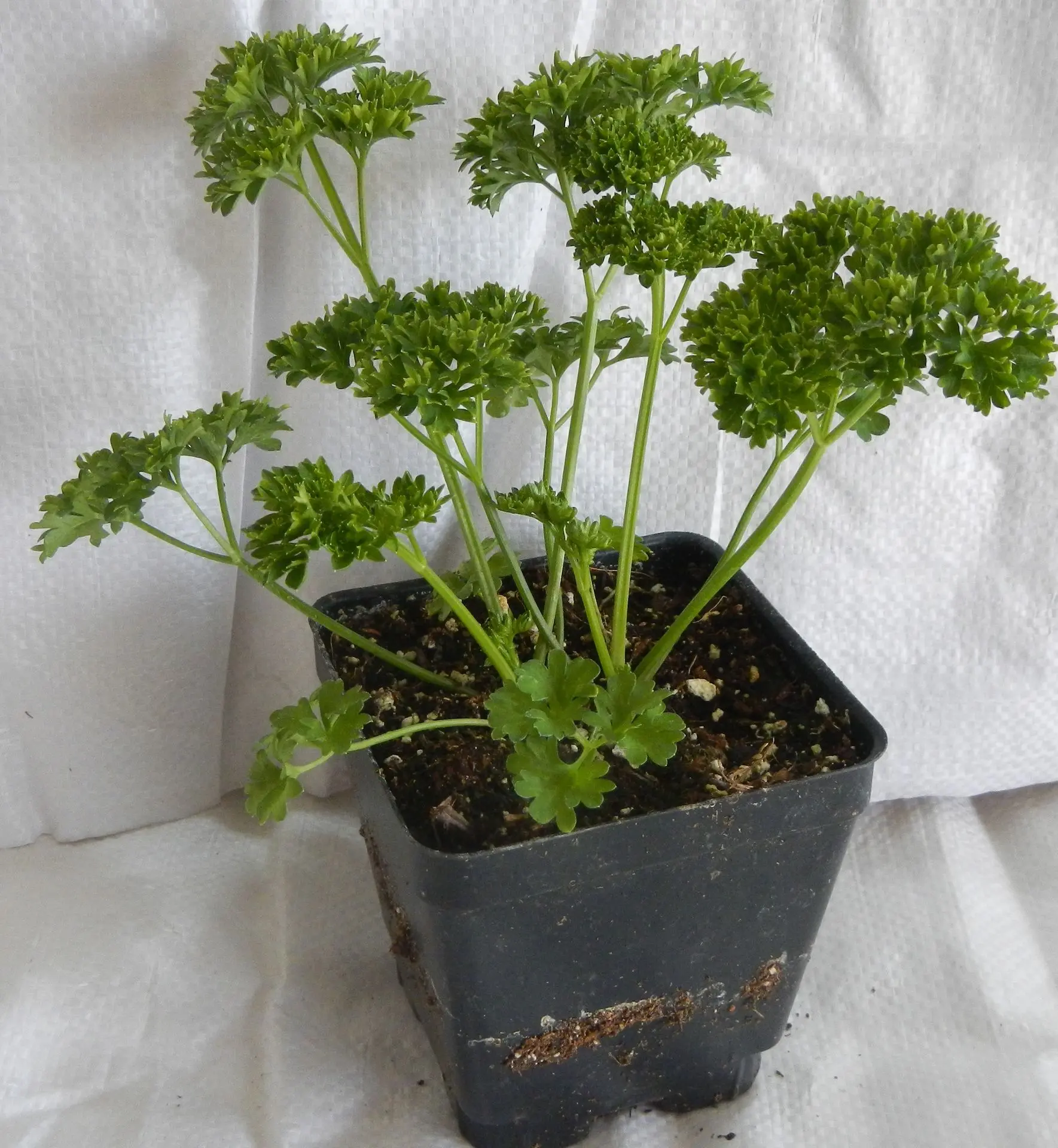
Curled Parsley has beautiful green, textured leaves that make it a perfect garnish. It does very well as a container plant.
Available during May in a 4" pot.
Light: Full Sun to Part Shade |
Life Cycle: Treat as an Annual |
Height: 12-18" |
Curled Parsley has beautiful green, textured leaves that make it a perfect garnish. It does very well as a container plant.
Available during May in a 4" pot.
Light: Full Sun to Part Shade |
Life Cycle: Treat as an Annual |
Height: 12-18" |
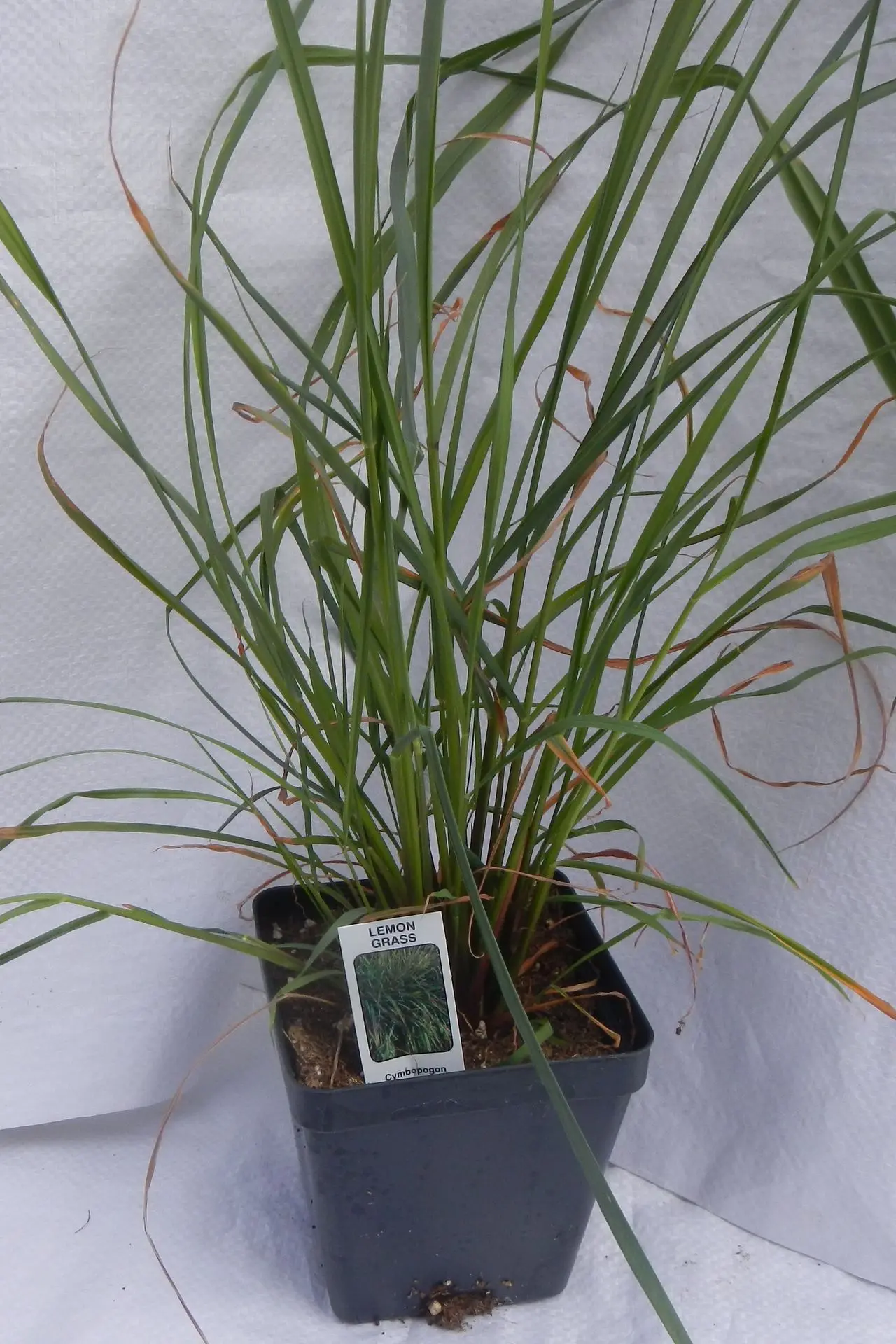
Lemongrass has a sweet lemon aroma and flavor that is popular for use in teas and Asian cuisine. The foliage is attractive, with varying shades of yellow, green, and magenta. It thrives in pots or in the ground until frost.
Available during May in a 4" pot. Plant outdoors only after danger of frost has passed (May 15).
Light: Full Sun |
Life Cycle: Tender Perennial (treat as an annual) |
Height: 24-36" |
Lemongrass has a sweet lemon aroma and flavor that is popular for use in teas and Asian cuisine. The foliage is attractive, with varying shades of yellow, green, and magenta. It thrives in pots or in the ground until frost.
Available during May in a 4" pot. Plant outdoors only after danger of frost has passed (May 15).
Light: Full Sun |
Life Cycle: Tender Perennial (treat as an annual) |
Height: 24-36" |
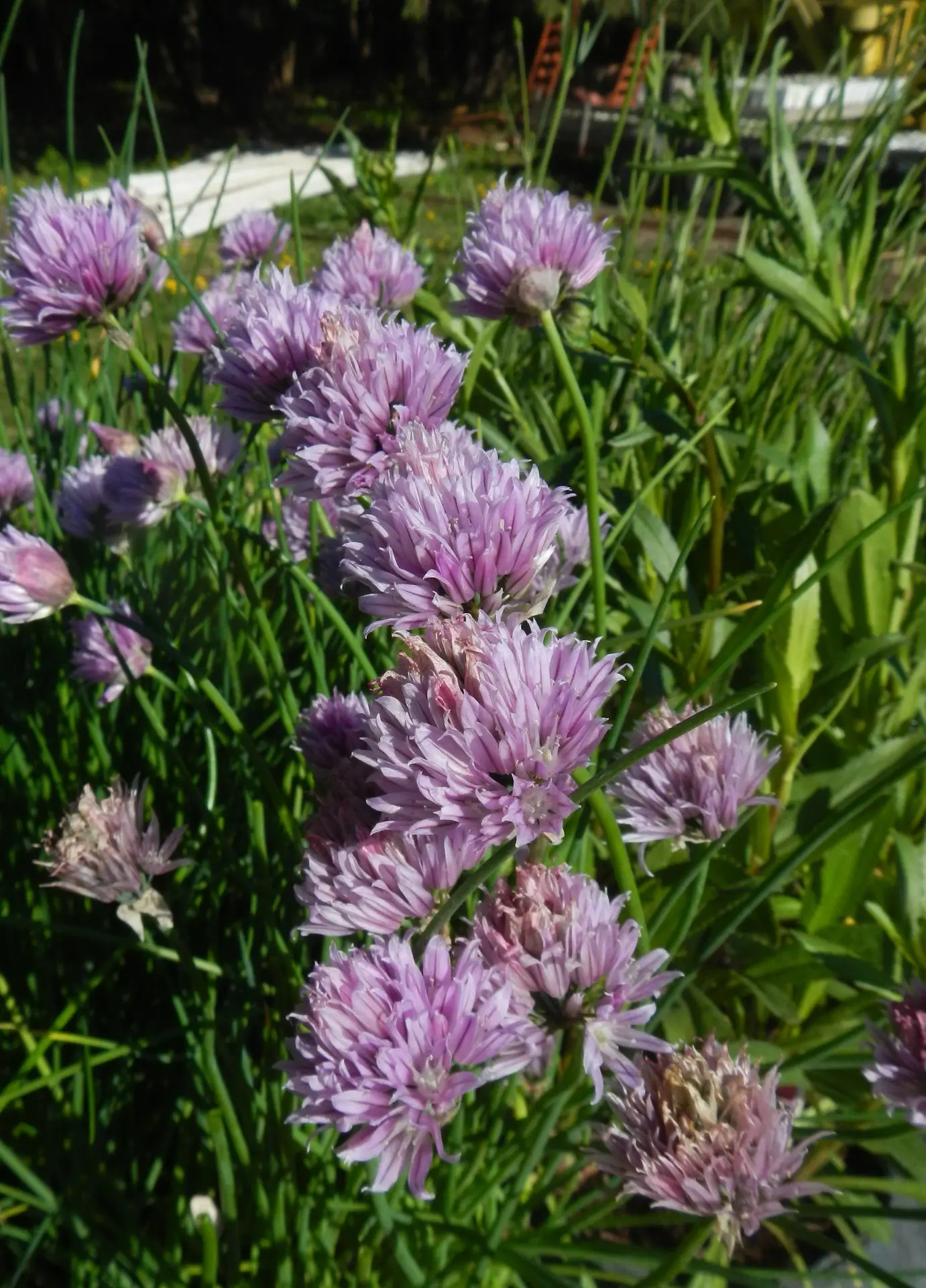
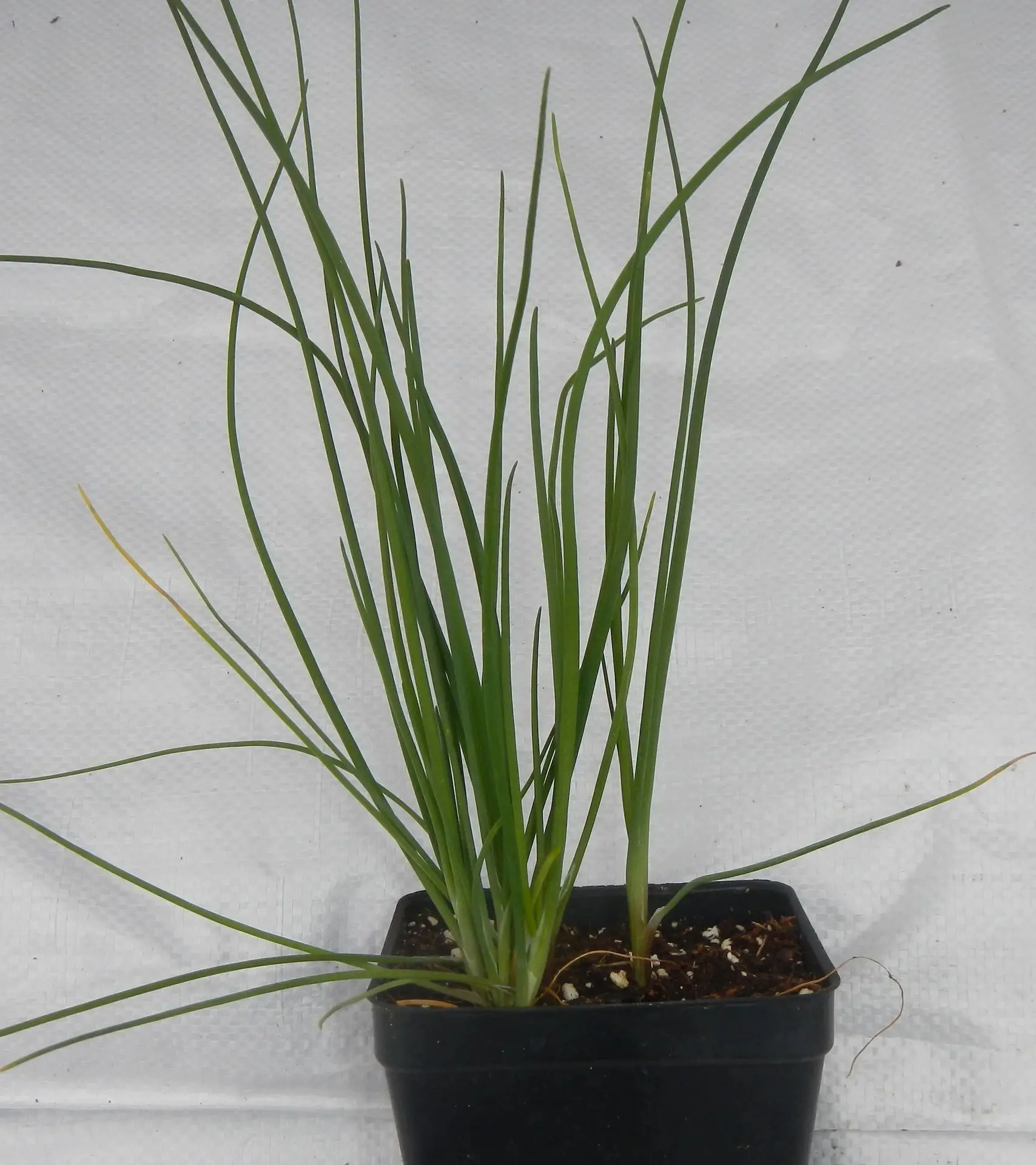
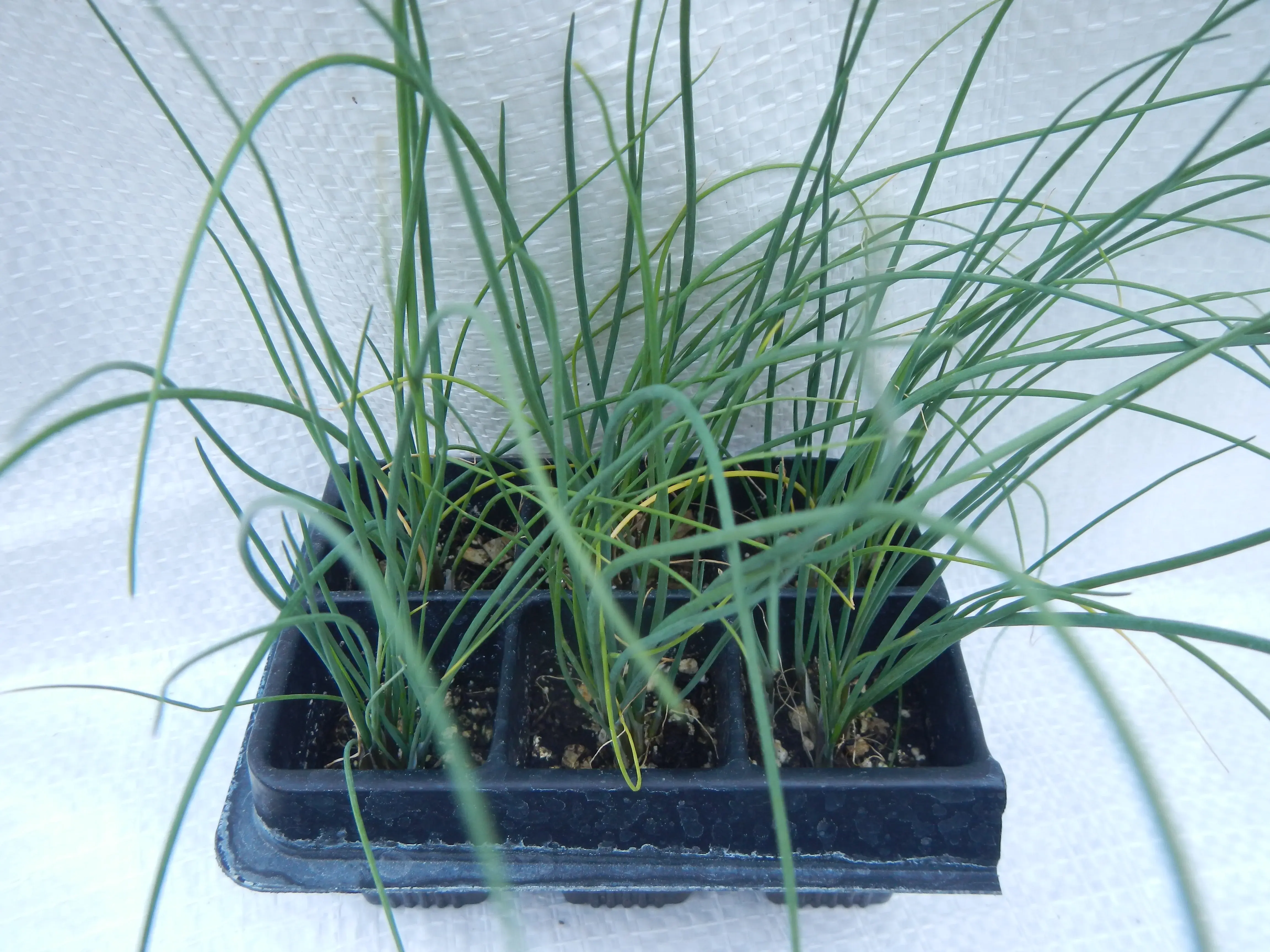
Chives have deep green, tube-like leaves with a mild onion flavor. They work as an excellent substitute to green onion tops in the summer and fall. Mature plants will produce beautiful, soft, rounded pink blossoms that attract pollinators. Chives will spread slowly by seed and bulb division.
Available during May in a 4" pot.
Light: Full Sun |
Life Cycle: Perennial |
Height: 10-15" |
Chives have deep green, tube-like leaves with a mild onion flavor. They work as an excellent substitute to green onion tops in the summer and fall. Mature plants will produce beautiful, soft, rounded pink blossoms that attract pollinators. Chives will spread slowly by seed and bulb division.
Available during May in a 4" pot.
Light: Full Sun |
Life Cycle: Perennial |
Height: 10-15" |
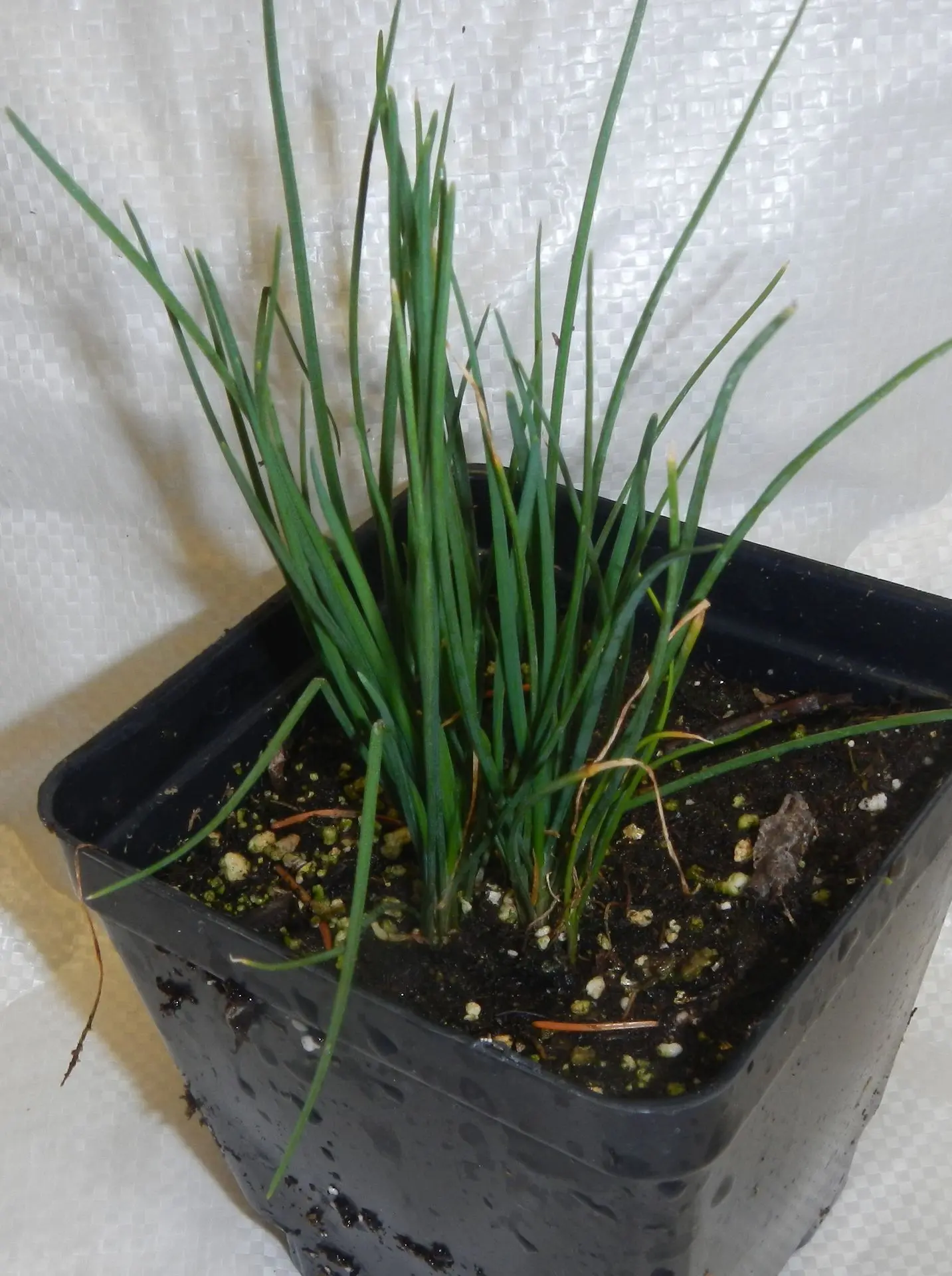
Garlic Chives have succulent, flattened, dark green leaves with a mild garlic flavor that is excellent in eggs and soups. Mature plants will produce white flowers that bees and butterflies enjoy. Garlic chives are easy to grow, and will slowly spread by seed over the course of several years.
Available during May in a 4" pot.
Light: Full Sun |
Life Cycle: Perennial |
Height: 10-15" |
Garlic Chives have succulent, flattened, dark green leaves with a mild garlic flavor that is excellent in eggs and soups. Mature plants will produce white flowers that bees and butterflies enjoy. Garlic chives are easy to grow, and will slowly spread by seed over the course of several years.
Available during May in a 4" pot.
Light: Full Sun |
Life Cycle: Perennial |
Height: 10-15" |
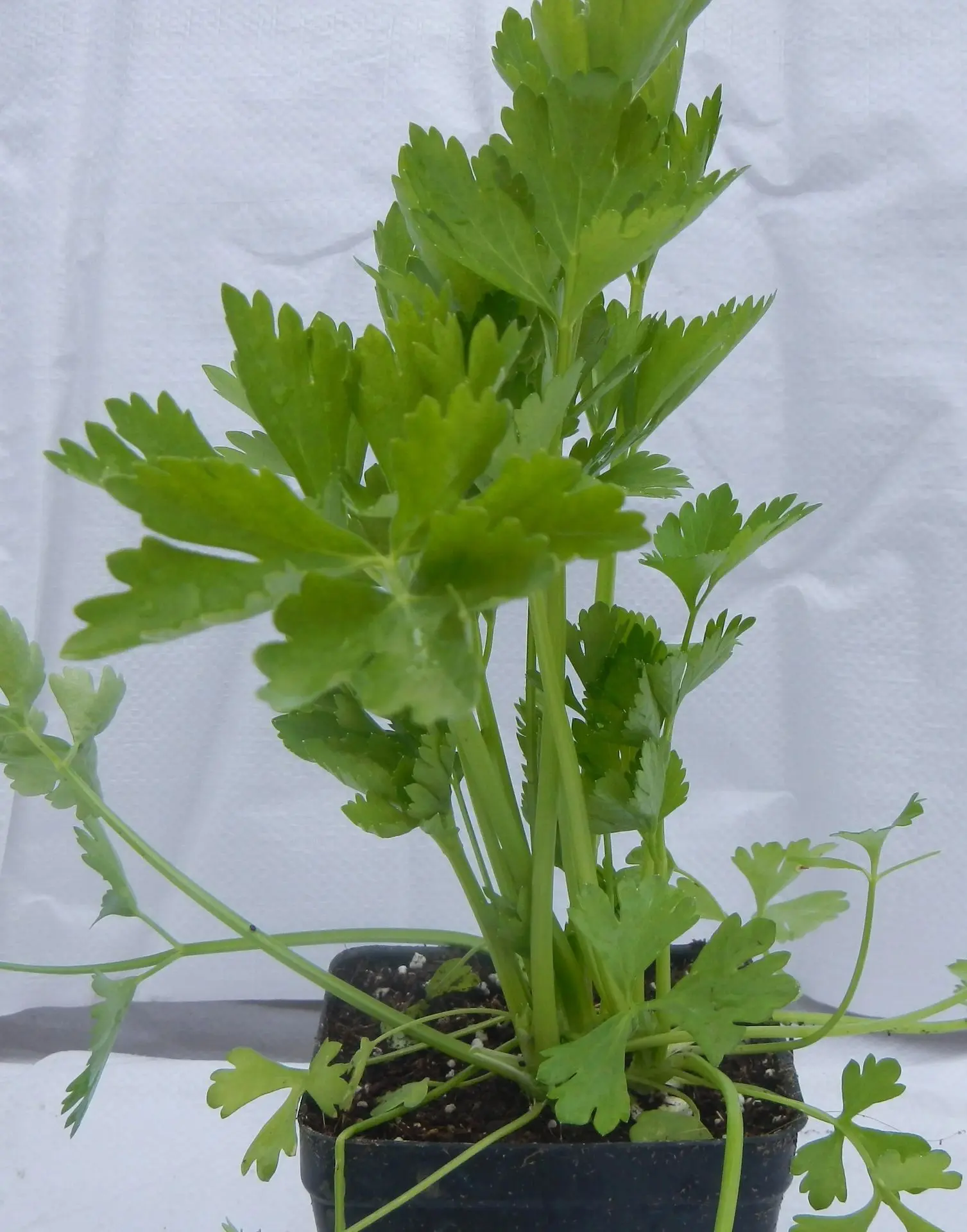
Cutting celery has a strong celery flavor that is popular in salads and soups. The stems are much narrower than regular celery but still have a little crunch. Both the leaves and stems can be used.
Available during May in a 4" pot.
Light: Full Sun |
Life Cycle: Annual |
Height: 10-15" |
Cutting celery has a strong celery flavor that is popular in salads and soups. The stems are much narrower than regular celery but still have a little crunch. Both the leaves and stems can be used.
Available during May in a 4" pot.
Light: Full Sun |
Life Cycle: Annual |
Height: 10-15" |
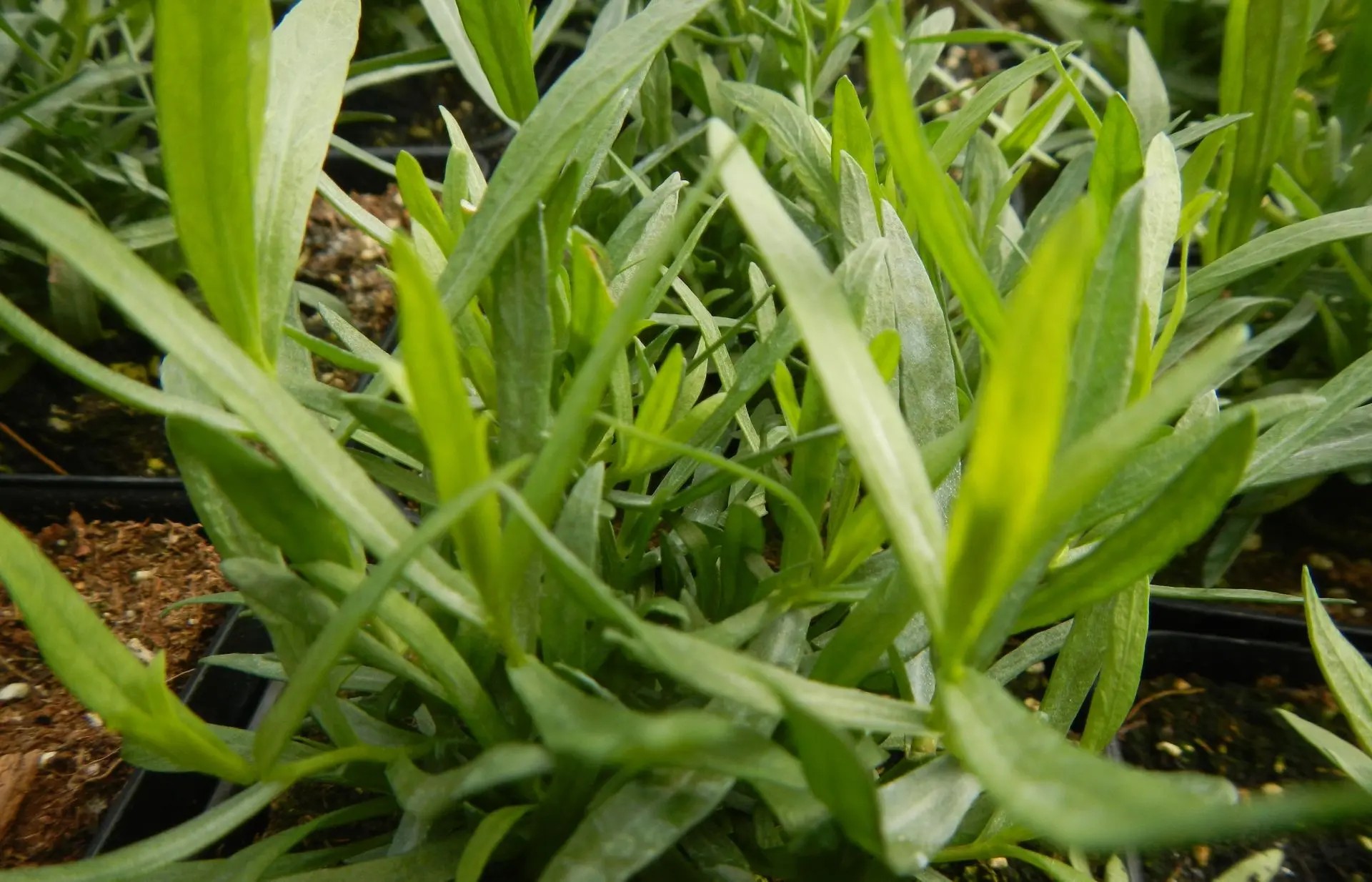
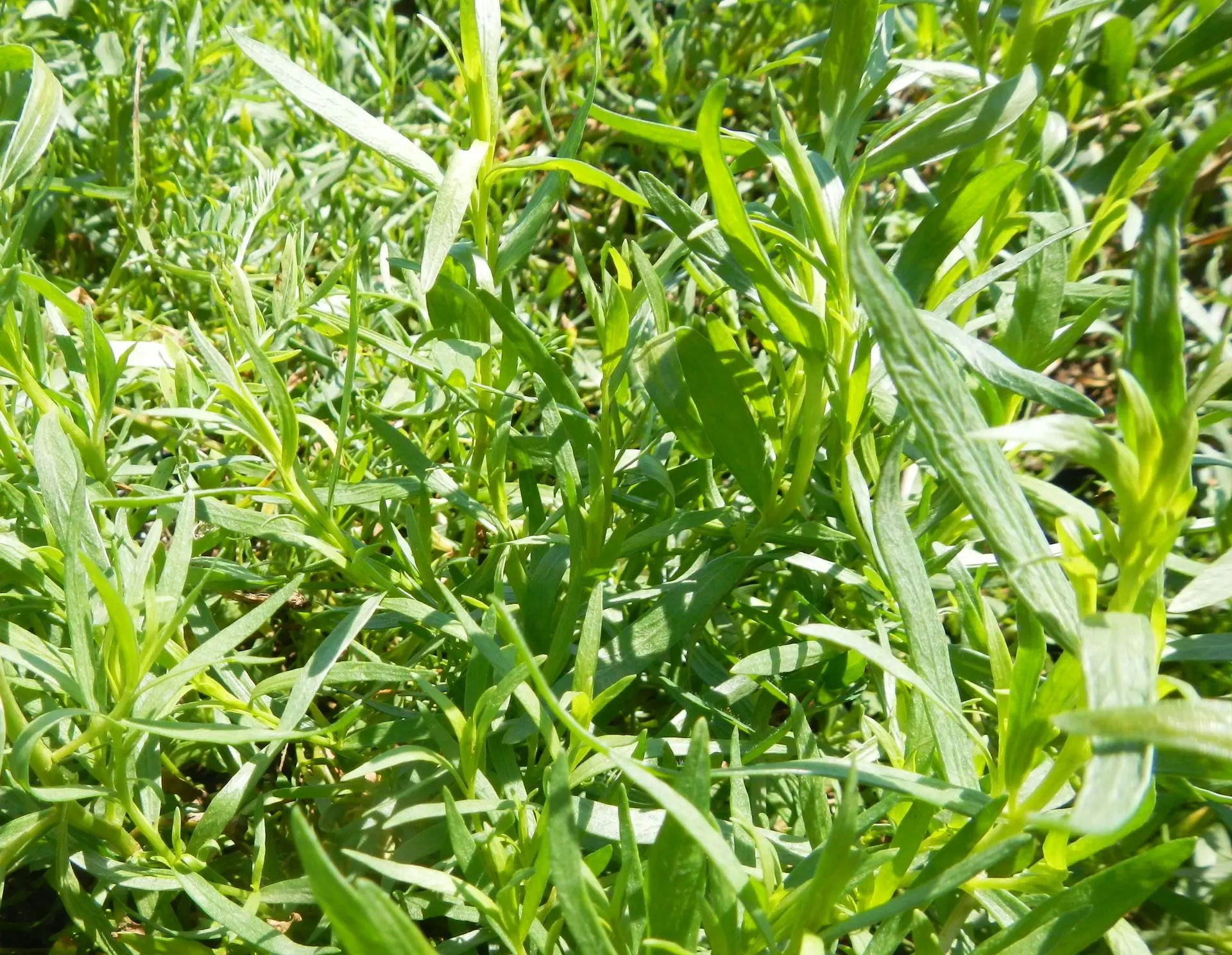
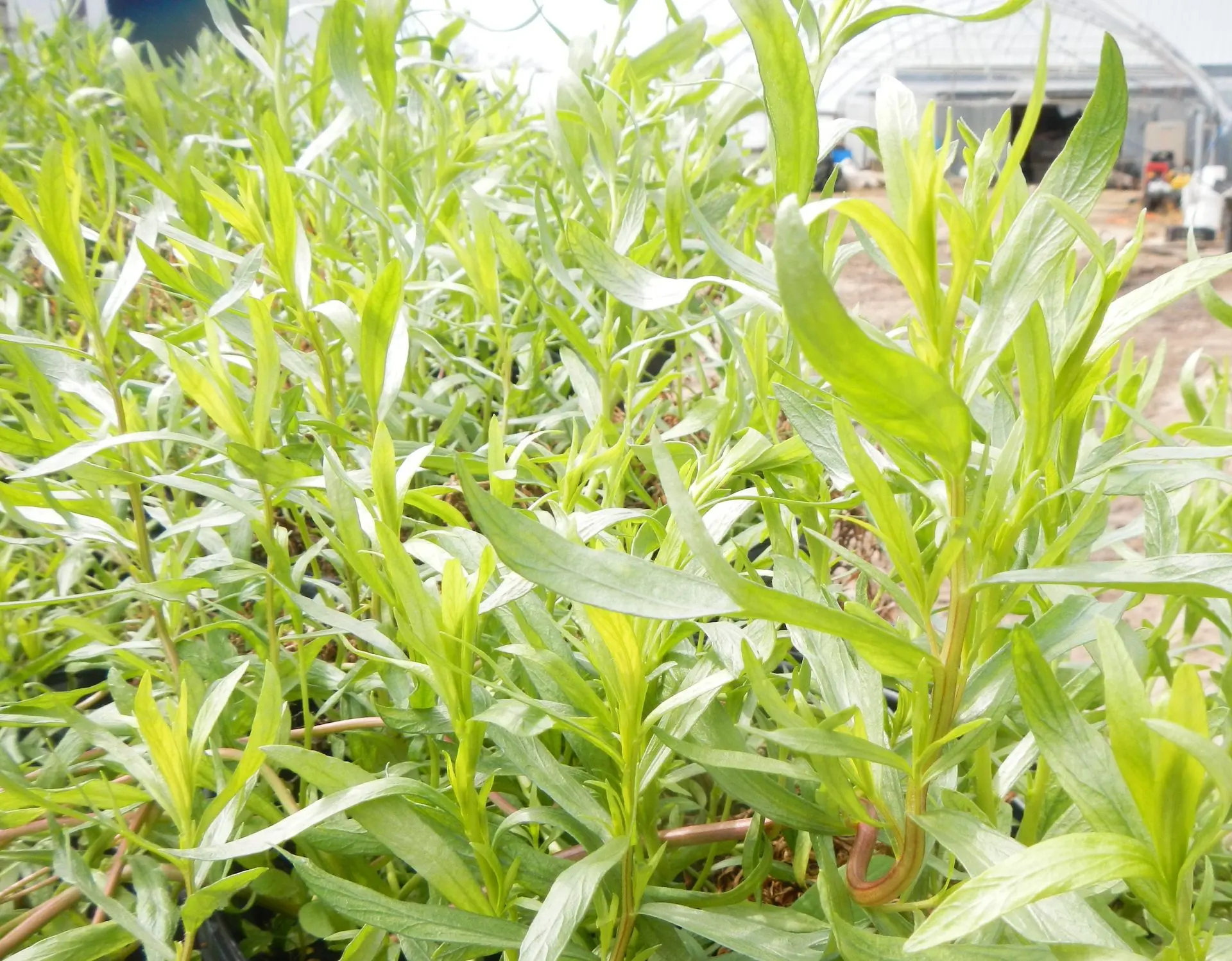
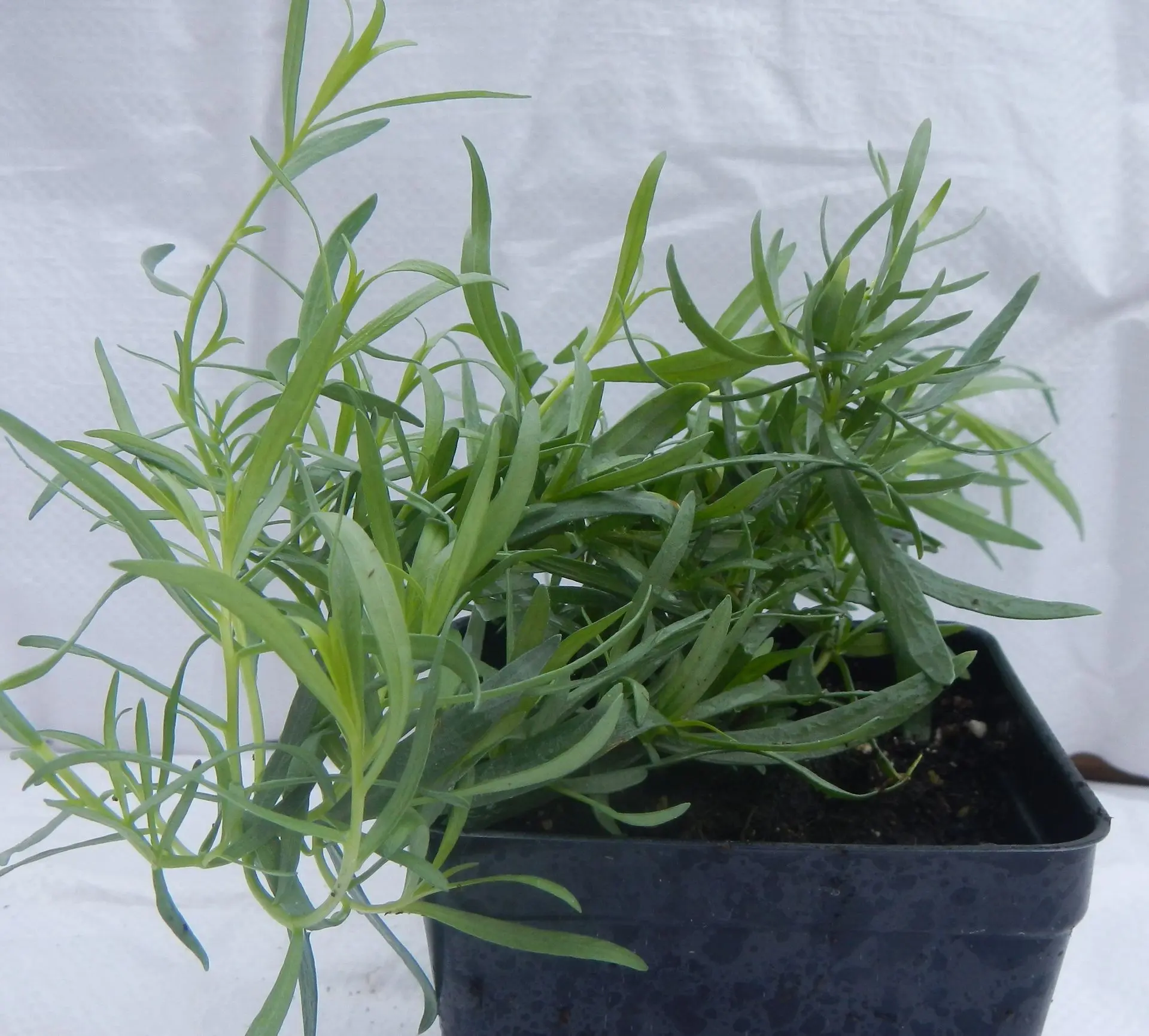
French Tarragon has a mild anise flavor that goes excellent with fish and in omelettes. It requires well-drained soil.
Available during May in a 4" pot.
Light: Full Sun |
Life Cycle: Perennial |
Height: 12-24" |
French Tarragon has a mild anise flavor that goes excellent with fish and in omelettes. It requires well-drained soil.
Available during May in a 4" pot.
Light: Full Sun |
Life Cycle: Perennial |
Height: 12-24" |
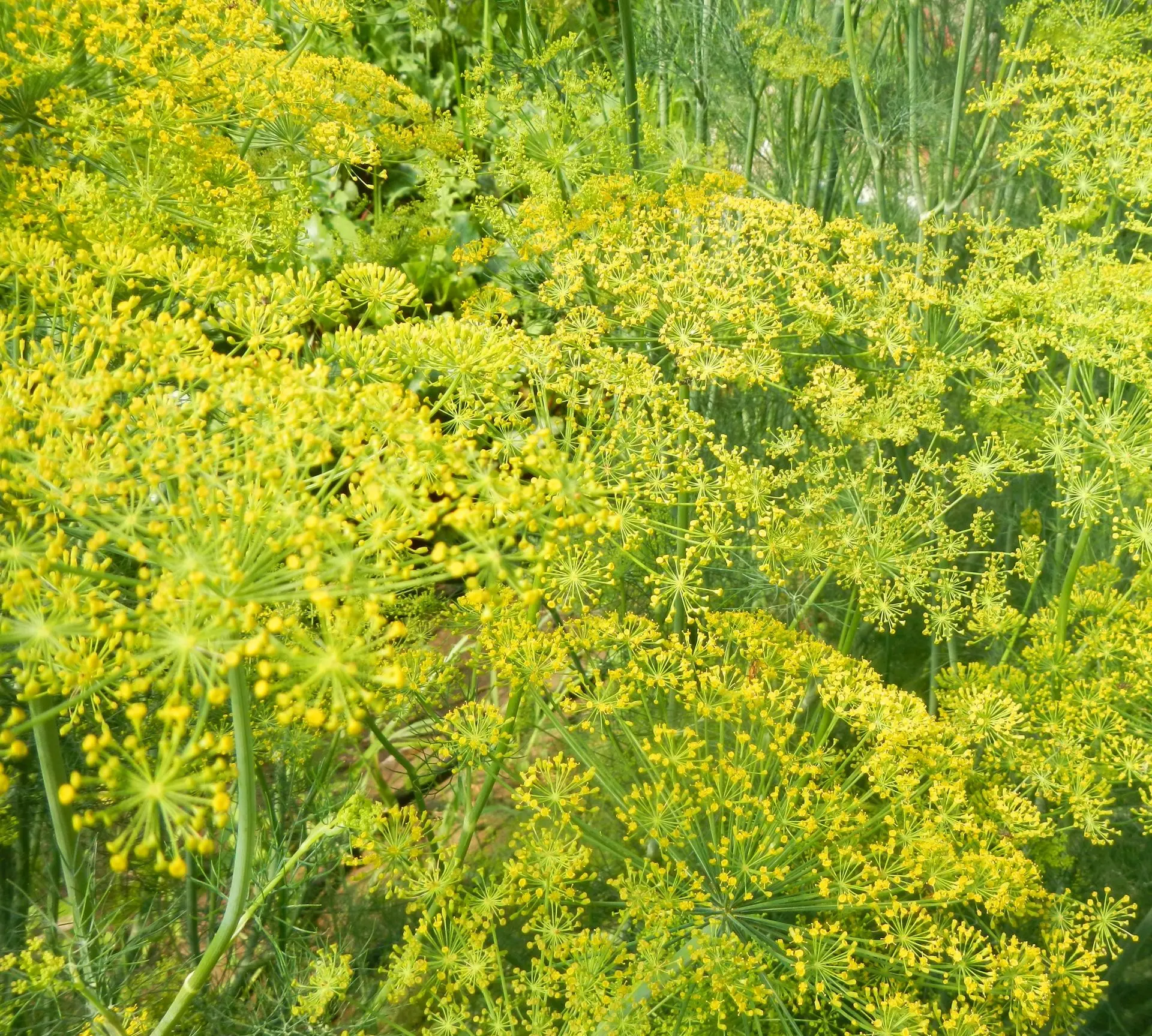
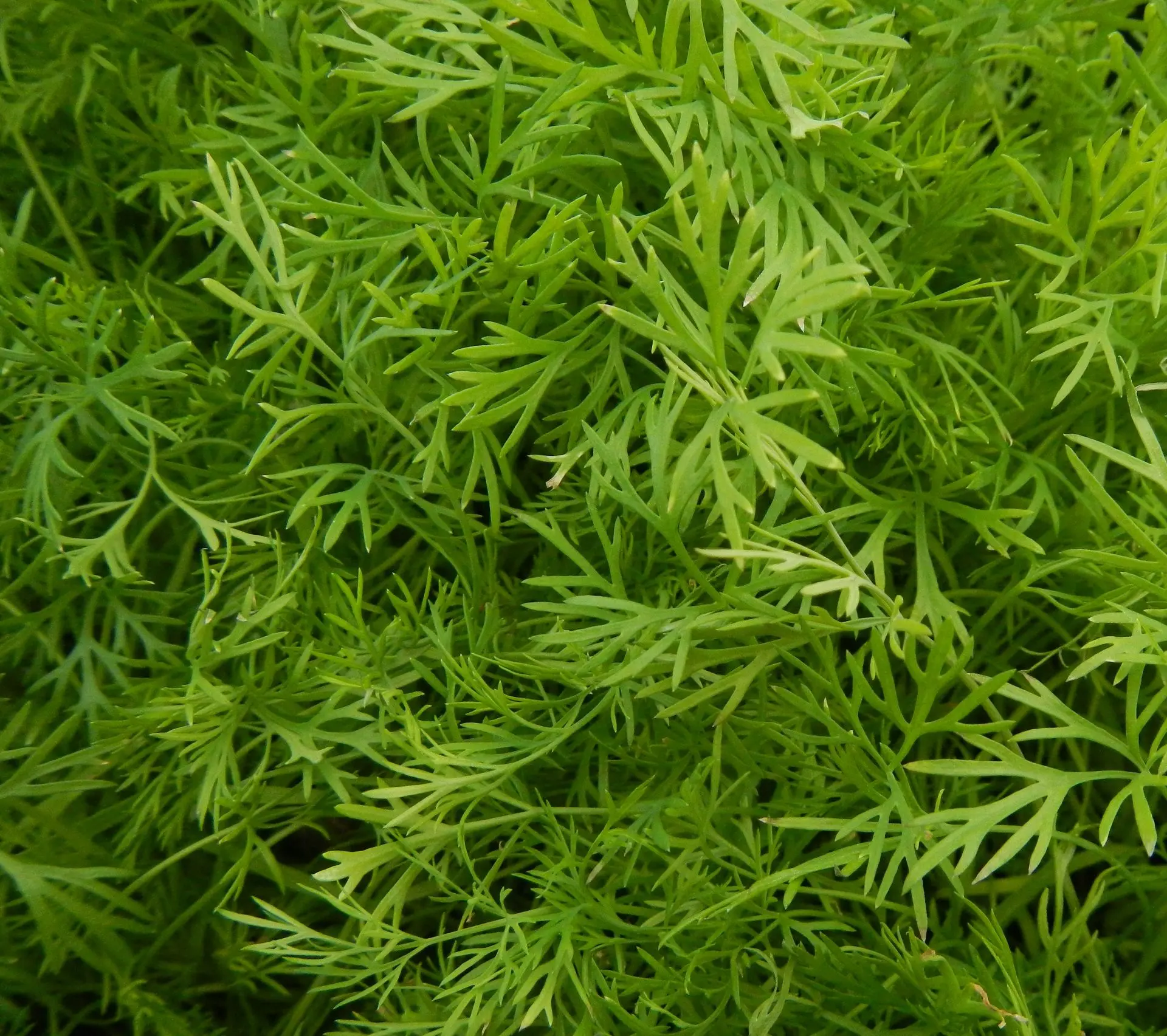
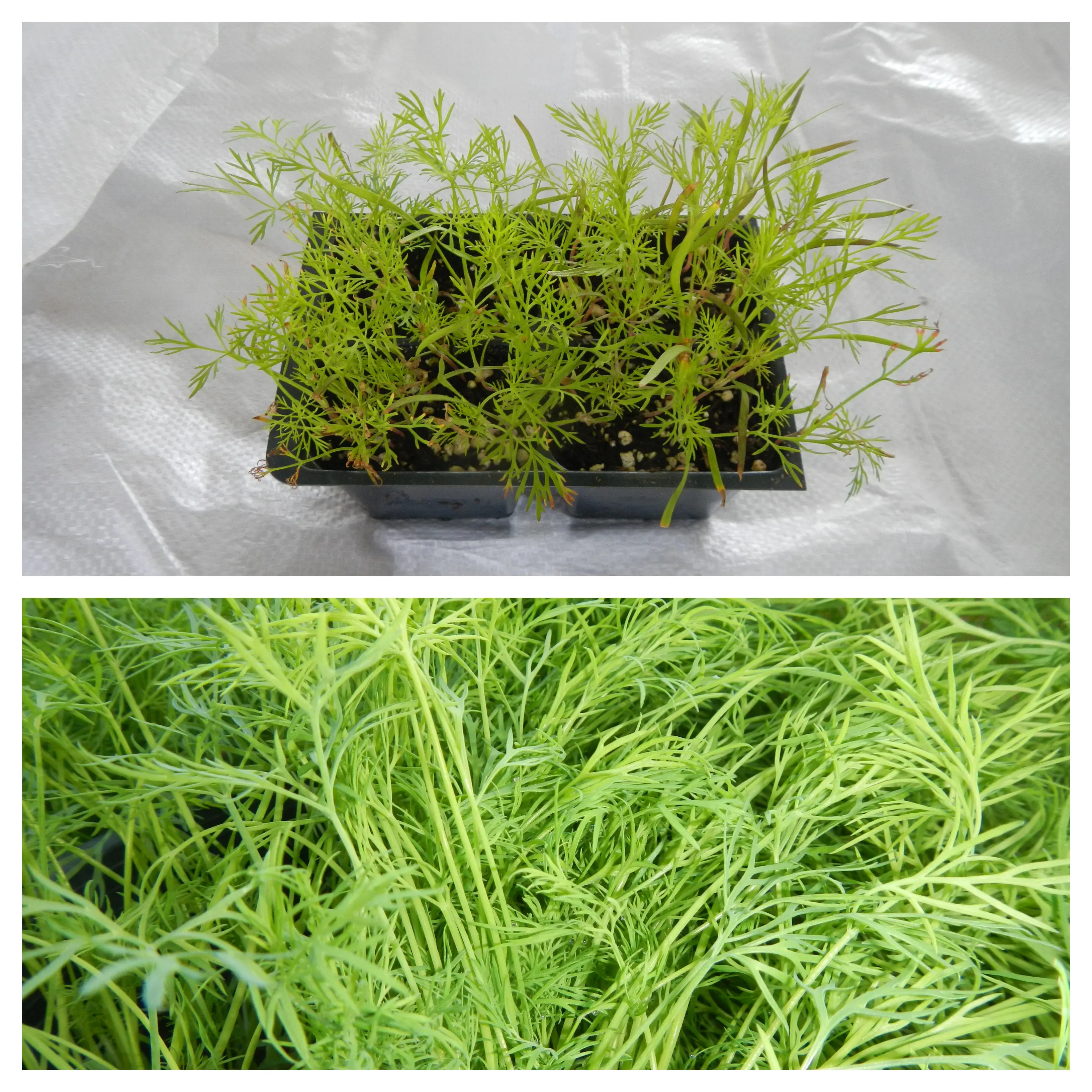
Dill is tall and ferny, with a strong aroma and flavor. If it is picked as dill weed when the plant is young and tender, it is milder and well suited (fresh or dried) to salads, garnish, seafood, and potato dishes. If it is picked as dill seed, after blooming and developing seed-heads, it has a stronger flavor and is typically used in pickles. The feathery yellow flowers on mature plants attract many pollinators.
Available during May in a 6-pack/72 cell.
Light: Full Sun |
Life Cycle: Annual |
Height: 48-72" |
Dill is tall and ferny, with a strong aroma and flavor. If it is picked as dill weed when the plant is young and tender, it is milder and well suited (fresh or dried) to salads, garnish, seafood, and potato dishes. If it is picked as dill seed, after blooming and developing seed-heads, it has a stronger flavor and is typically used in pickles. The feathery yellow flowers on mature plants attract many pollinators.
Available during May in a 6-pack/72 cell.
Light: Full Sun |
Life Cycle: Annual |
Height: 48-72" |
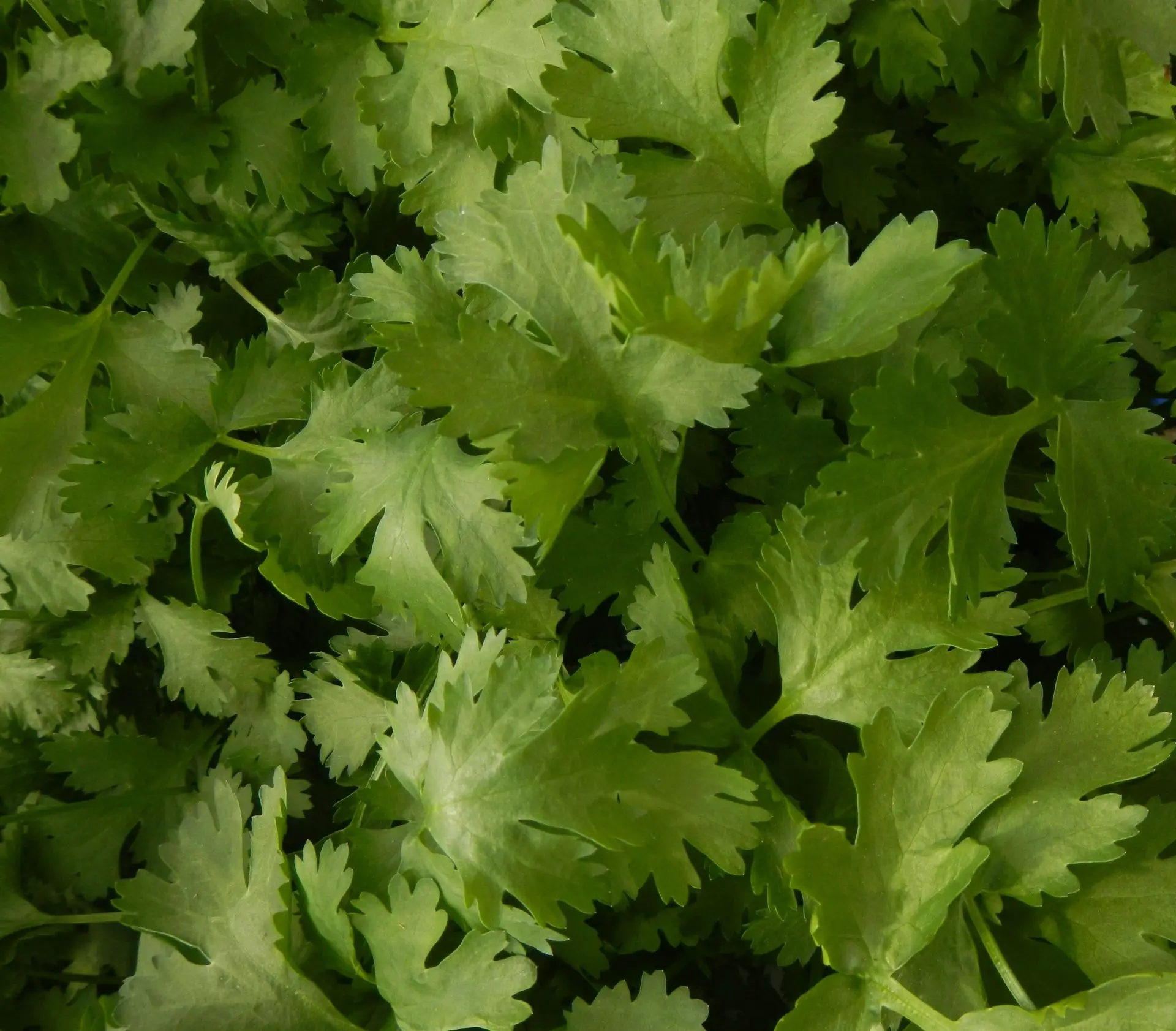
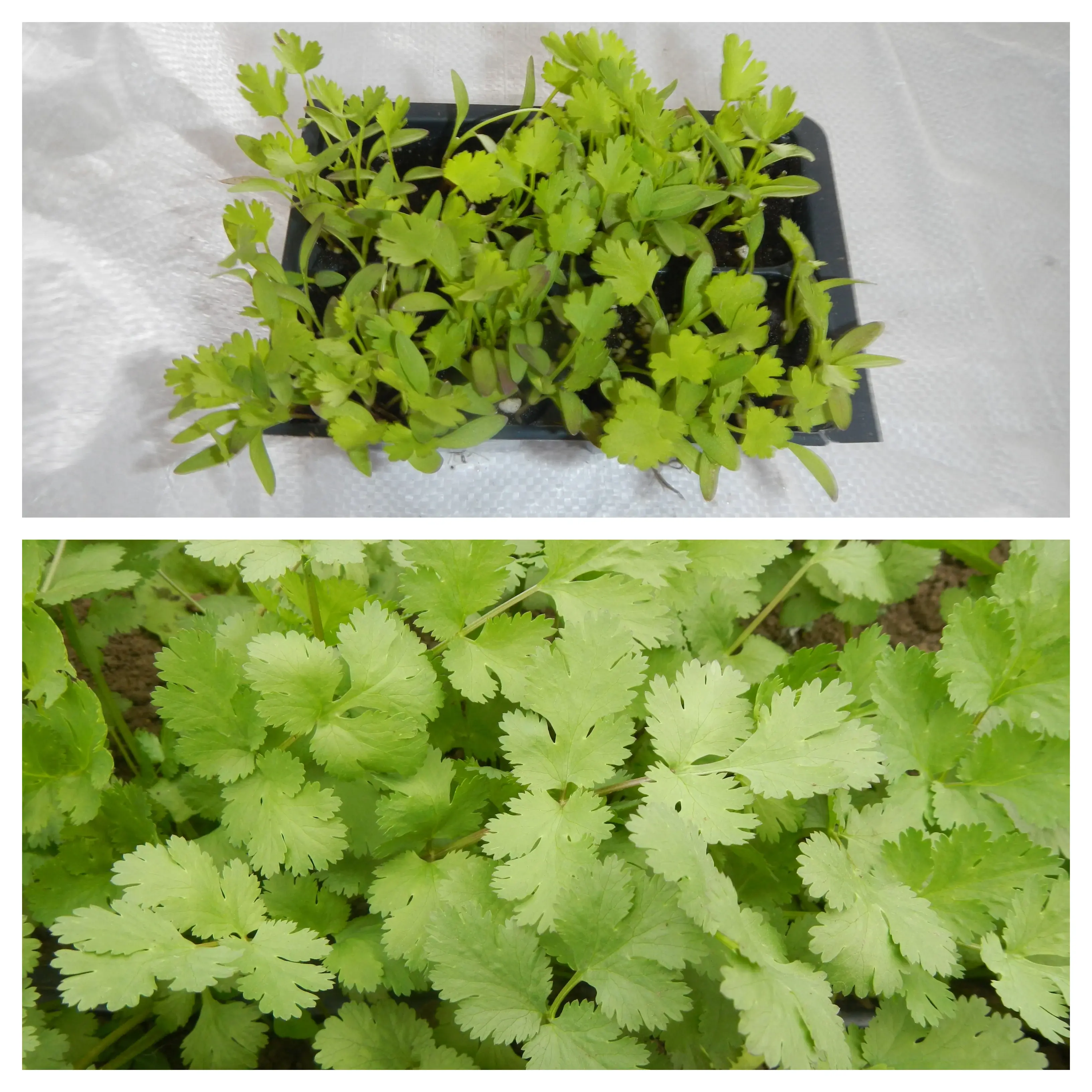
Cilantro has a strong flavor and smell that is often used in salsa, Mexican cuisine, and Indian cuisine. It can be picked when young and tender, or when it has gone to seed (known as coriander). At maturity it produces white flowers that attract pollinators.
Available during May in a 6-pack/72 cell.
Light: Full Sun |
Life Cycle: Annual |
Height: 12-24" |
Cilantro has a strong flavor and smell that is often used in salsa, Mexican cuisine, and Indian cuisine. It can be picked when young and tender, or when it has gone to seed (known as coriander). At maturity it produces white flowers that attract pollinators.
Available during May in a 6-pack/72 cell.
Light: Full Sun |
Life Cycle: Annual |
Height: 12-24" |
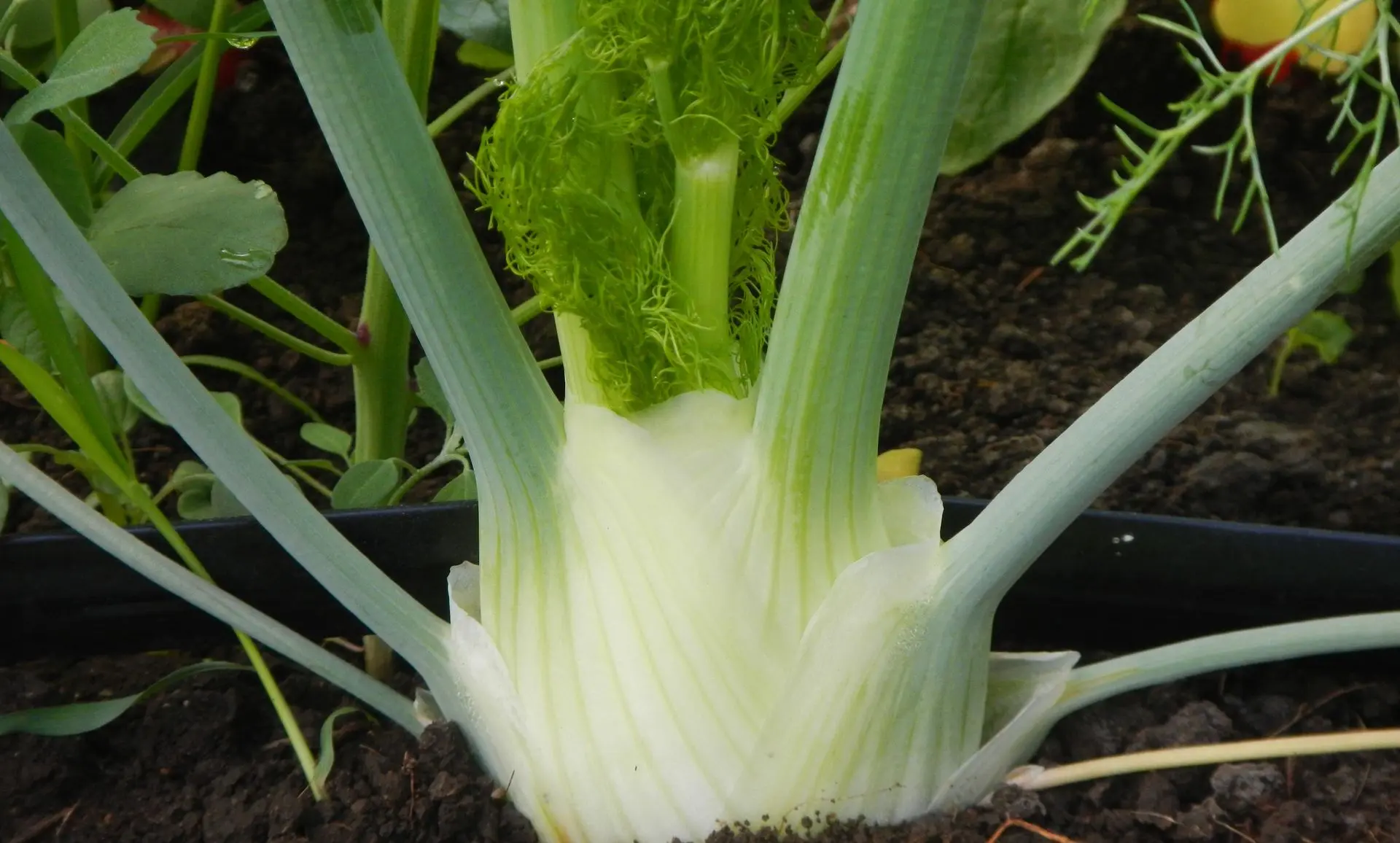
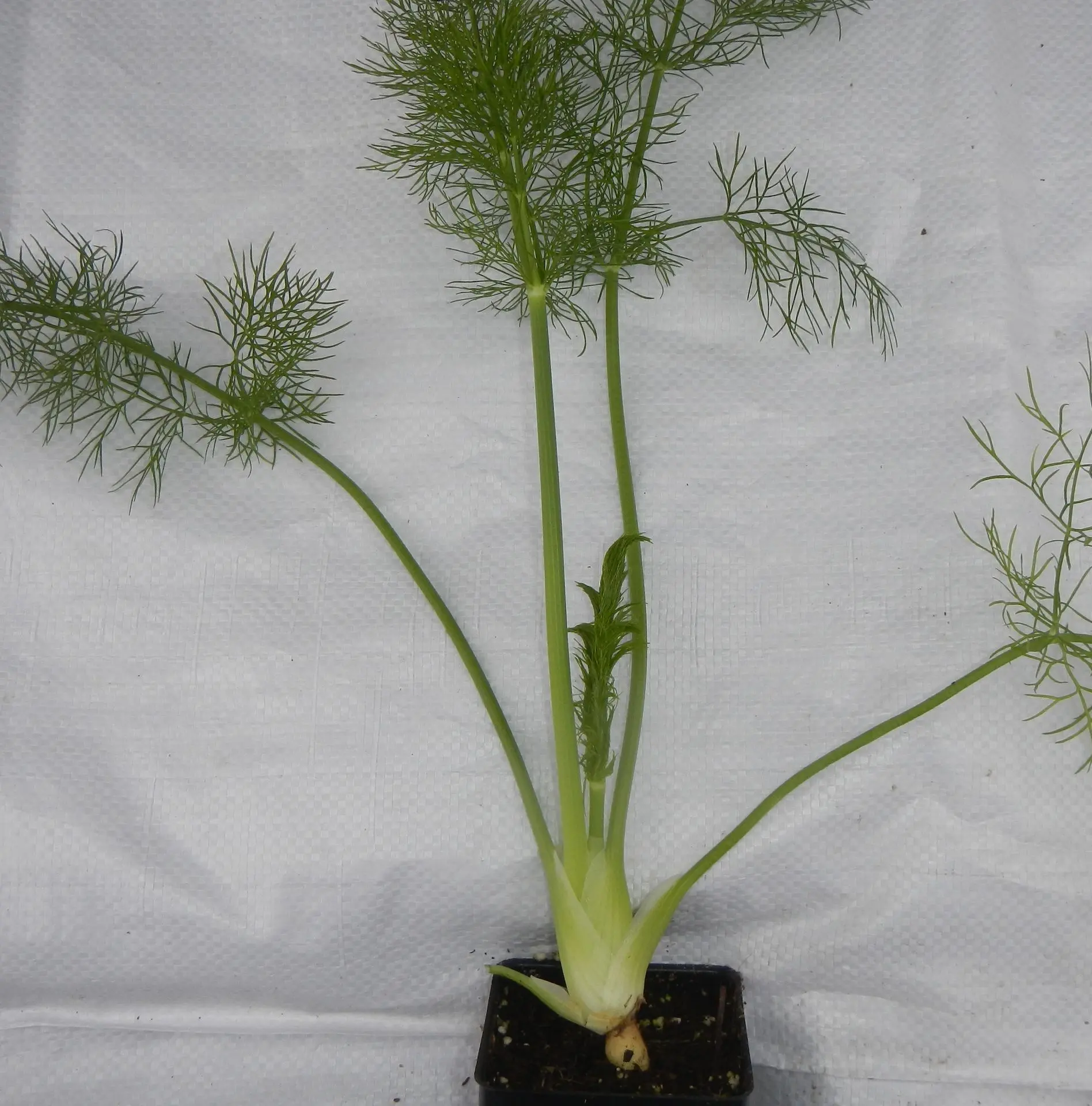
Fennel has an strong anise/black licorice flavor that goes well in salads, soups, and other dishes. Both the bulb and the feathery leaves can be used.
Available during May in a 3" pot.
Light: Full Sun |
Life Cycle: Annual |
Height: 24-36" |
Fennel has an strong anise/black licorice flavor that goes well in salads, soups, and other dishes. Both the bulb and the feathery leaves can be used.
Available during May in a 3" pot.
Light: Full Sun |
Life Cycle: Annual |
Height: 24-36" |